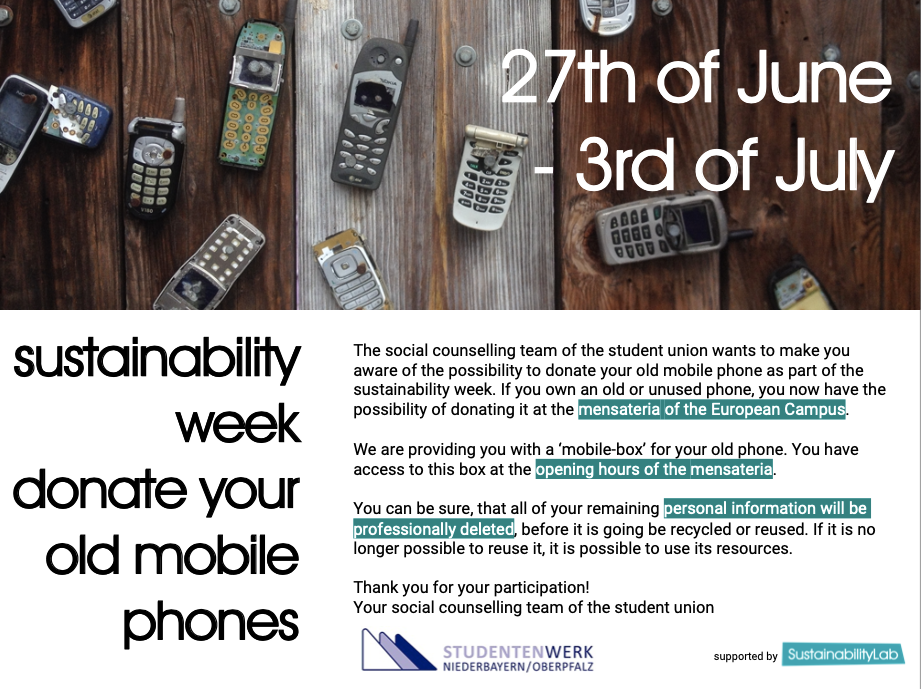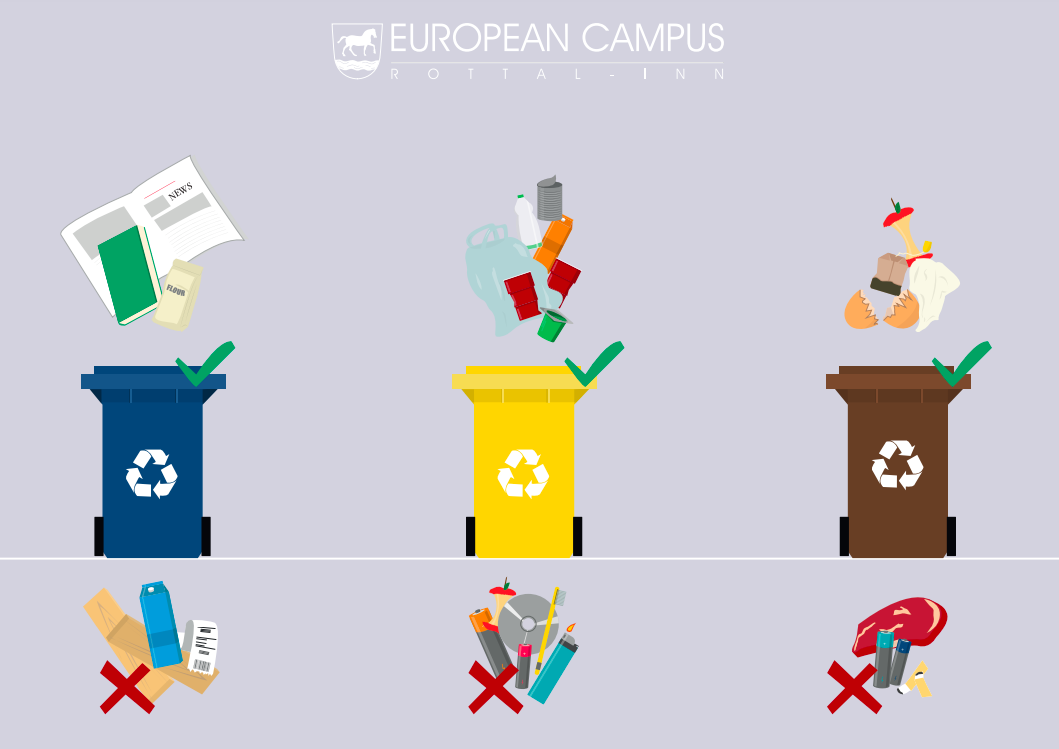All News
| Website: | iLearn - Lernmanagementsystem der Hochschule Deggendorf |
| Kurs: | ECRI-NEWS |
| Buch: | All News |
| Gedruckt von: | Gast |
| Datum: | Donnerstag, 29. Januar 2026, 00:18 |
Campus News
Sustainability Week • 27.06 - 03.07
Changes for Summer Semester 2022
- Back to Campus.
Since the SARS COVID 19 pandemic started, almost all ECRI courses had been offered virtually and just a few of them on our campus in Pfarrkirchen.
This semester, though, it will be different, as for the first time since the pandemic started almost all courses will be offered on Campus, with a few exceptions (languages courses, for example, among others) which will remain online.
If you are unsure of whether you have on-campus or online classes, please check your lecture schedule, or consult with your course assistant. - Vaccination centre changes.
The start of the new semester also brings some changes to the city of Pfarrkirchen. The vaccination centre which was located in Eggenfelden will be changed to Pfarrkirchen! If you want to know more about where you can get the SARS-COVID-19 vaccine in Rottal-Inn, and where will the new vaccination centre be functioning, please visit our designated section on it here. - Activities in the International Office (IO).
As every semester, the team in charge of IO bring exciting and new opportunities to our Campus. If you want to know and be up to date with IO events, please visit the ECRI seminare semester guide , where you will find all the latest information about their events and the corresponding iLearn course, which will provide you with all the latest information on arriving in Pfarrkirchen.
Apart from this, we would like to remind you that IO offers consultation hours for regular international students every Tuesday from 13 to 14 hs (online, please communicate with them for more information).
Are you a THD employee? Then IO also has something for you: information events about staff and teaching mobility during the month of May, available in German and English.
Ayelen Toscano Juanes 11.03.2022
Winter Semester 21/22 recap
Winter semester 21/22 is coming to an end, with the exam period already in place and holidays around the corner for most ECRI students. And during these last weeks, here at ECRI NEWS, we would like to make a short review of all the important moments at our campus.
First Campus Days for all students since the beginning of the pandemic
The arrival of the SARS-COVID-19 Pandemic, which started at the beginning of the Summer Semester 2020, changed everything at ECRI. From on-campus lectures, most of our students, lecturers and professors had to change to online lectures. And although some very specific classes took place on campus during the beginning of the Winter Semester 20/21; and some specific ones during the Summer Semester 2021, most of them remained online.During this Winter Semester, ECRI held 2 Campus Days. On these days students from all degrees and semesters were invited to the Campus, where specific activities were programmed for them. The other planned Campus Day had to, unfortunately, be cancelled, but they were a great test for how we could do a return back to the Campus in the upcoming semesters.
Welcoming of new students
At the same time, Winter Semester always marks the start of a new academic year and a full new batch of bachelor and master students start their journey at ECRI. This year, fortunately, new students could have a small welcome party in the front patio of the Campus, with all regulations in place. A great way of welcoming them!Design thinking workshop
During our second Campus Day, a very interesting event took place: the design thinking workshop, led byProf. Dr. Dominik Böhler and Prof. Dr. Matthias Huber.
If you want to know more about it, we recommend you check our article on it below!
RESP elections
Like every year, this December RESP elections took place. After some debate and voting time, the new board was elected. If you want to know more about them, who they are, what do they do and how to join RESP, you can check our article on them, where all contact information is included, on this page further down.Trips to Passau and other events in ECRI
This Winter Semester another thing came back to ECRI: on-campus events. With vaccines being highly available, and all protocols in place, the International Tutors of ECRI organized some events for students to meet and socialize with each other.From the get-together meeting to the Bowling night in Pfarrkirchen, and the trip to Passau, new ECRI students had the chance of seeing more of Pfarrkirchen and the surrounding areas, while former students had the possibility of meeting with their classmates.
Here at ECRI NEWS we wish you the best for the rest of your exams and a great holiday!
Ayelen Toscano Juanes • 11.02.2022
Design Thinking: an afternoon creating together
Many interesting things happen at ECRI, and during the last Campus Day, a very exciting scenario was seen on our campus grounds.
Having in mind that a new building will be constructed at ECRI, students from different studies had the opportunity to envision what their preferred learning environment is, what things they want to be changed, better or added.
The Design Thinking Workshop led by Prof. Dr. Dominik Böhler and Prof. Dr. Matthias Huber on the topic of Design your Learning Space was scheduled for 3 hours.
Creative Journey
The students started by choosing their partner, with whom they went through this creative journey:- What brought them here, what their ideal learning environment is, and why do they have those ideas.
- Always guided by Prof. Dr. Dominik Böhler and Prof. Dr. Matthias Huber, students could look into the concept of “otherness”, emphatically trying to create the best learning environment for their colleagues.
- They question the “why” repeatedly: “Why this model? Why is this important for you? Why do you say this?”
Some Results
By the end of the exercise prototype development, some incredible models arose, that could be categorized under 3 headings.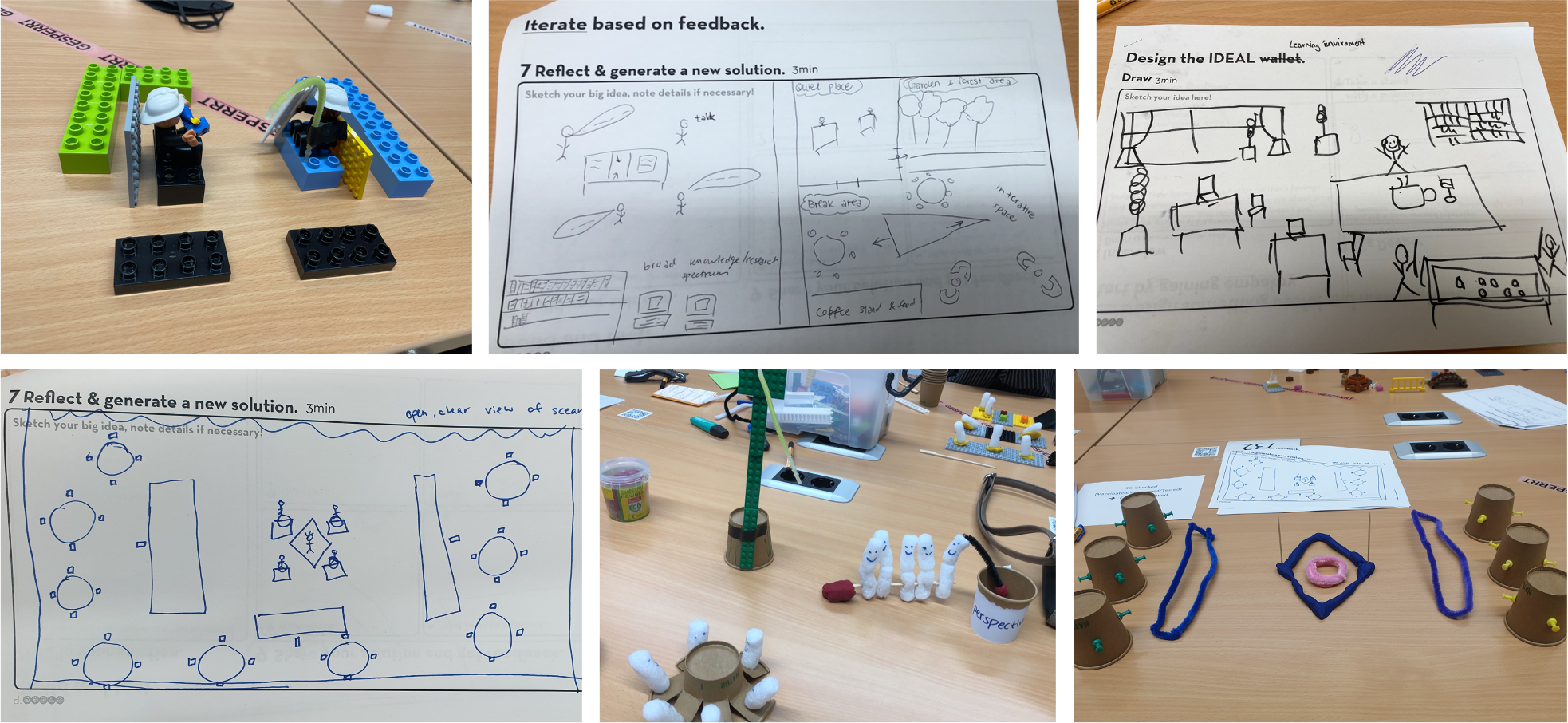
Learning, Teaching, Technology and Innovation
- Emphasis on self-learning and freedom in the classroom.
- Need for a more interactive, real learning experience.
- Interactivity and online learning will prevail, and we need to give online learning a place at the university of the future.
Counselling
- Need for a better, more individualized and relaxed advising service at the university that is easily accessible to everyone.
- Need for more facilities and services, especially since mental health is one of the most important requirements for students in online courses.
Please have a look on the Student Counselling Service at ECRI: StuCoS.pdf
Transfer
The connection between the city and the campus was also something mentioned, as well as the need for a more practical, hands-to-work experience, instead of learning in a classroom time the whole time.
Ayelen Toscano Juanes • 28.02.2022
RESP: Elections and new board members
The past month the elections took place, and we are happy to announce that RESP has a new board, composed by compromised ECRI students.
But, let´s hear about their plans and ideas from them, shall we?
RESP NEW BOARD WELCOME
MESSAGE
As a collective of mostly international students, our top priority is student engagement and participation which is always challenging especially in the middle of a pandemic. But we think that community engagement has the potential
to help each individual get the most out of their time as a student by maximizing your exposure to potential opportunities as well as providing you with interesting and fun events. This is why we want to build onto previous boards’
success through maintaining and expanding their successful initiatives, in addition to starting our own initiatives that can be perpetuated into the future, long after our time as board members is over.
More specifically,
we want to start hosting a regular series of “talks,” about various topics ranging from academic, STEM, and career-related topics, to more fun and lighthearted topics. As a team, we all have interests in events of that nature and
some of us even have experience hosting TED talks, and speaking publicly. We want to increase the regularity of these events such that each student feels that there’s always something interesting on offer to them. As a team, we’re
taking on RESP mostly out of appreciation for the power of extracurricular engagement, and we need to make sure that we offer other students the opportunity to pursue that as well, it might be a career or even life-defining for
some of the participants. This is of course in addition to all the “standard,” trips, get-togethers, excursions, and parties that we’d like to host (but that depends on the corona situation).
To sum up, as senators of the
student body, we want to empower students by giving them a platform to communicate what issues they have as students and members of our community. We share a passion as a team for socializing, and event planning, and we’d like
to use that to help give them a fuller, more enriching college experience. Keep an eye out for us, and the events we’ll be planning, especially by the start of the 2nd semester!
facebook • mail • instagram • web
Ayelen Toscano Juanes • 21.01.2022
Game night at ECRI this thursday
Did you know that IO organizes every once in a while, a game evening? At the moment in its online version, a game evening is a great opportunity to meet new ecris in a relaxed and fun environment!
The next online board game night is on the 25th of November, at 8 pm, coordinated by the board games tutors Thu & Alexandra.
If you want to join you just need to sign up here, don´t miss it!
Movie night at ECRI
As if watching movies wasn´t good enough, watching movies with a great plot and strong, great female´s storylines behind them is great!
Because of this, ECRI CAMPUS is launching a new movie night, this time with the topic "strong women in cinema".
From the fearless Wonder Woman, brilliant minded Katherine G. Johnson to Saint Teresa of Calcutta. Pick any strong female lead film for movie night on campus.
Here’s a chance for you to suggest movies for our “Strong Women in Cinema” event on campus ECRI.
Click on the link to add your choice: https://eva.th-deg.de/evasys/online.php?p=M6Q4A
Ayelen Toscano Juanes • 05.11.2021
Important Contact List
Back to classes! How to have a successful semi-virtual semester
Back to classes: tips to have a successful online semester while dealing with online learning burnout.
Once again October and another semester begins. This will be the fourth online semester held at ECRI, and at this point, most of us know how to study and divide our time.
Nevertheless, reminding them again is never a bad option, and today we want to bring you some tips and recommendations on how you can make the most out of your online learning sessions.
We would like to remind you that our faculty has counselling sessions, the StuCoS – Student Counselling Service. For more information have a look at the StuCoS flyer or
the Introduction Video.
For information regarding important
contacts in the region of Rottal – Inn, please refer here.
And if you want to check out our guide on the online
study during the coronavirus crisis, please go here.
How to make the most out of your online lesson sessions
Take your online classes seriously.
Remember: online classes are real classes. Take them seriously, and follow these pieces of advice for a great online learning experience:
- Be respectful: respect your lecturers and fellow students, remember there are real people behind the screen, and contribute to create a great learning atmosphere, and you will see how much you will enjoy your online lessons
- Turn off your microphone when the lecturer or a fellow student is speaking
- Use the “raise your hand” option so your lecturer or professor knows you want to comment on something or ask a question
- Use the quick buttons (thumbs up or down, etc.) if you want to show your agreement or disagreement with something without interrupting the class.
- When possible, try to turn on your camera
- Participate in class either by speaking or writing in the chat (if allowed)
- Engage in all activities designated by your lecturers and professors.
Manage your time efficiently.
Time management and holding yourself accountable for your actions are two of the most important aspects when it comes to attending classes. Here are some things you can do to improve your time management skills:
- Create a schedule that you can stick to, while considering all other compromises
- Plan a study schedule for your exams well in advance
- Try to start preparing for a subject at least one month before your examination date – this is especially important for research papers, in which you might need to start two months in advance - one for literature research and the diagram of your research paper, and another month of actually sitting down and writing it. Some people might even need three to four months for these types of tasks.
- Identifying which are your strong and weak points
- And try to prioritize those tasks you know you need more time for, so that you don´t find yourself in the situation that you postponed something you don´t particularly enjoy so much, and you only have a week left.
- If you must present research papers or other types of presentations, prepare a final rough draft one week before the final deadlines. This way, you will still have one week to go over it, correct some minor mistakes, and make sure you fulfil all requirements.
- Follow a weekly plan, in which you can include all your main online lessons, your self-study time; and leave enough space for all extra activities.
- If you want to know more about managing your time efficiently, contact StuCoS for a private session.
Reduce all possible distractions and study in a quiet place.
Eliminating all distractions around yourself and taking your classes and studying in a quiet place, are some of the best learning advice.
- Try to take your online lessons and/ or study, in a space in which there is no TV or any other non-essential technological equipment.
- If possible, leave your phone in another room so you will not be tempted to scroll down social media
- Eat on a separate room, not in front of your computer, and have enough water or non-alcoholic liquids next to you
- Plan what you need for your self-study or online lessons sessions and bring all that to your study area.
Create a place you are happy to be in.
Feeling happy about where we are is a key element. Creating a space, you actually want to be in, will help you concentrate better. Some things you can do to make your space more to your taste are:
- Decorating it with bright colours you like.
- Adding plants and other elements.
- Having a comfortable chair and desk of your preference, but which allows you to work for hours straight without feeling uncomfortable.
- Choose a room or a setting in your household that has a nice view, preferably to the street or garden, so you can relax your eyes from time to time.
- Set all your most important elements (note pads, computer, pencils & pens, etc.) so you don´t have to go searching for them.
Be present.
- Sit down for studying when you know you can dedicate the time and space for the task.
- If you need to finish tasks by a deadline, but you are not in the right mental place, try to practise meditation or do an activity previously which calms you down.
- For mediation and other relaxation techniques, you can always use the 7 mind app, Germany’s most beloved mediation app, free of charge for all THD students (up to 12 months).
Be engage in your online classes.
- Take notes and quiz yourself during class. This will help you maintain your focus on the class and will provide for a great study resource in the future.
Don´t just focus on good notes, but also on learning.
University is supposed to prepare us with knowledge for our future career lives. Don´t just focus on getting good grades and doing just what is necessary to pass the subjects; but rather on understanding the content and applying
it to daily life situations related to your study course. Here is how:
- If you are learning theoretical subjects, think about how those things can be applied in real-life scenarios.
- If you are writing research papers, think about how your research can help improve your field of study, even if it is in a small amount.
- Take your study seriously, as you would do a job.
If you do this, and thoughtfully understand what you are learning, good marks will surely follow.
Breaks are the key to a good online study session.
- Take at least a 5-minutes-break every hour. ECRI´s lessons are planned so that you can have a break every hour and a half max, but if for any reason your classes last longer than these, try to at least bring your eyes out of the screen for a few minutes, given them try to relax from the blue light.
- Use blue light glasses and screen protectors if you can.
- Sleep well, rest accordingly, for at least 8 hours every night.
- Try to go to sleep before 2 am every night.
Health body, healthy mind.
- Eat well (enough, not too much and not too little) and incorporate every nutrient that makes you feel well and alive.
- Analyse which type of macronutrient (carbs, proteins, and fats) makes you feel more tired, and try to limit that type of macronutrient before long classes or days in which you have too much on your plate.
- If you suffer from exhaustion (feeling tired all the time) or can´t concentrate, talk with your doctor immediately, because you could be suffering from nutrient imbalance or malnutrition. You can see how to find a doctor in our “important contacts in Rottal inn” list.
- Stay active, try to do at least 30 minutes of an activity you enjoy per day.
- Try to go outside every day, free your mind from computers and electronic devices daily.
- When you are not studying, limit your screen time as much as possible. This will help you stay fit and concentrate better.
Create workgroups (can be online too) so you don´t feel alone in your study process.
- Work in groups, organize activities with other people
- If you are not in Germany or are under quarantine, try to at least organise some online study groups.
- If you can meet with fellow students, try to organise it once per week, even if they are not in your same classes. Sometimes, just being next to someone can help.
- Have In mind all SARS-COVID-19 rules, respect the minimum distance, and use a face mask when necessary.
Sources: study tips for success & tips for taking online classes
Ayelen Toscano Juanes • 15.10.2021
Welcome to the ECRI Campus!: How to get started in Pfarrkirchen
Welcome back to another semester at ECRI!
For our older students, we wish you a nice start to the semester, where you can continue learning and growing. And for our freshman students, welcome to the next two or three years of your life!
For those of you who don’t know us, we are the ECRI NEWS Team. Here we build a platform where, by different posts and articles, we will provide you with resources, information and other material to help you make the most out of your time at our university.
We believe in building this community together, so we will constantly ask for your opinions on different matters, so you can give us your feedback. And if you want to participate by giving us your testimonies, asking questions, suggesting topics you’d like us to cover, we are more than open to listen to you and help you!
Although the ongoing pandemic situation is improving at the moment, not only in Germany but also in the whole world, this does not mean we won’t have to adapt and surf some challenges during this semester (all information regarding the current COVID-19 situation in Pfarrkirchen can be found here: https://www.rottal-inn.de/buergerservice-formulare/gesundheitsamt/coronavirus-aktuelle-informationen/)
Just as the three last semesters, this one will be held mostly virtual, with only some on-campus lab classes, among other things. Nevertheless, this semester ECRI will introduce 4 “Campus Days”, in which there will be no classes and different activities will be held on campus. Check your emails during the following days for more information on the matter!
This year two students, Ayelen Toscano-Juanes and Daniel Rodriguez-Perales will be ECRI’s international tutors. Both of them, together with our student’s club RESP e.V, will be in charge of organizing different events and activities during this semester. Some might be on campus while others will be online, so also make sure to check your email and other channels to always be up to date on any interesting event. Moreover, our International Office also organizes many events, such as the International Week and the KulturCafe.
Online Learning
As we already said, this semester will be held mostly online. We know this methodology can cause some specific problems, so please do not hesitate in seeking help if you need it. At ECRI there is a special service for this: StuCoS (Student Counselling Service) provided by Ms. Claudia Nitiksin. She specializes in helping students going through a hard time due to general issues in social life and integration in Germany, conflicts with fellow students and/ or teachers, psychological stress caused by studying, dissatisfaction with their social situation, among other things. If you feel you need help, please do not hesitate and contact her at: stucos-ecri@th-deg.de. Everything said in those sessions is strictly confidential by European law. For more information on the matter, please visit: https://www.th-deg.de/ecri-en#accordion-stucos
Information about Pfarrkirchen
Is this your first time in Pfarrkirchen and/ or Germany, and you don’t know where to start? Well, then please feel free to check our Handbook for information about Rottal-Inn, or the blog article posted last year about life in Pfarrkirchen: PAN cultural and social 101.
Bike Station
Biking is, undoubtedly, germans favourite transportation method. Nevertheless, bikes can often break down or have minor issues which need to be fixed. If you want to learn to do this and much more, you can always visit the EcoLab project “Bike station”. There, the EcoLab team will guide you through every step so you can check your bike and do some minor repairs yourself.
For more information regarding this project, please visit: https://www.th-deg.de/ecri or send an email to ecolab@th-deg.de)">(ecolab@th-deg.de). You can also read our past article on this topic.
More information will come in the
following days.
Ayelen Toscano Juanes • 07.10.2021
What´s new at our Campus?: ECRI News for the end of our summersemester 2021
Summer semester 2021 is coming to an end, but that doesn´t mean we don´t have new and exciting news to share with you!
Since this week and until the Sunday, June 27th, you can register yourself for all new AWP subject for your upcoming semester!
From our side, we would like to bring your attention to the AWP Subject "Bavarian culture", which is also available for ECRI students. Do you want to learn more about the culture and language of the state you´re going to be in for the next two to three years of your life? Then come and join us!.
More information about AWP courses can be found here, and registation can be done by clicking here.
2. International week, hosted by International Office.
Next week (21st - 25th of June) is THD´s international week! Do you want to learn more about doing an intership or a semester abroad, learn more about other cultures, or simply enjoy listening to classmates and collagues about their home countries?
Then check the International Office´s programme, and join this incredible events!
3. Re-registration
Something that never hurts to remind... since the 7th and until the 21st of June, you have time to re-register for the winter semester 21/22.
Please, don´t foget to do so!
For more information please click here.
ECRI NEWS • 18.06.2021
Interview with Daniel Rodriguez Perales, International Office ECRI´s international tutor
Whenever new international students arrive at ECRI, one of the first offices they visit is the one that has their own category on it: International Office.
The International office, a dedicated team of ten people in the university, which aim at improving international relationships with other universities, while at the same time taking care of international and national students.
As we wanted to know more about IO functions in ECRI and, most importantly, how they can help all our ECRI students, we have interviewed Daniel Rodriguez Perales, International Tutor and Bachelor student at the ECRI Faculty.
How is the IO at ECRI composed? Who is part of it?
Ms. Daniela Schwertlinger is the representative of the International Office at ECRI campus. However, the International Office is much bigger than that. There are team members, which are sitting in Deggendorf but are greatly related to the Pfarrkirchen Campus and participate in all aspects of it.And what is your particular role inside IO?
I am hired as an International Tutor, which means that I am here to help international students coming to Germany, in my case in Pfarrkirchen. The International Tutors help students with challenges when arriving here in Germany, such as cultural adaptation, but mainly with bureaucratic things, such as paperwork, opening a bank account, etc. We also help students with things related to the adaptions on German customs, and insurances or tax registration.How do you see your job?
Well, I see myself as a guide. I try to guide students so they can make the best choice they can while being here in Germany. But at the end of the day, our students are all adults, liable and responsible for their actions. We can try to guide them, I can try to talk to them from my own personal experience, but at the end it will always be their personal decision.Do you have a general list of topics that you help them with?
We have some topics which repeat themselves, and this is why we write all essential information at DIT’s website. But apart from that, we have a very pragmatic approach: if a student sends me a message with a particular problem, I am happy to help that student with their individual problem or concern.Who and where do you recommend students to look for help?
Us! (laughs). No, really, us. I know that if I ever have a question, I can always go and ask Ms. Schwertlinger about that, she is very helpful. People working at IO will always try to help you solve your concerns, and if they can’t or if it’s not their task, they will refer you to the correct person who can help you with that.In this semester there are weekly consultation hours, and I always strongly recommend students to use that time.
Can you help students with their doctors’ appointments for example, or finding a place to stay?
Under some circumstances, yes. IO has a renting platform, so the International Office tries to work as mediators in this aspect: landlords / people who have a space available can post there, and students can contact them directly.The same with doctor’s appointments for example: As an International Tutor, I can recommend you which doctors in Rottal-Inn speak English or help you with arranging your appointment.
What kind of activities or events does IO organize?
Under normal circumstances, a lot of events, such as Taste the World. Right now, as everything has to be done online, the IO organizes most of the events virtually … the Kulturcafé, for example.What IO has found out, of course, is that a lot of students are in great problem when arriving to Germany during pandemic times. Because of that, IO in cooperation with RESP and International Tutors, organized what we call “Quarantine Services”, for incoming students.
What are these Quarantine Services?
Well, imagine you are coming from abroad. First, you have to read all requirements to enter Germany: are you coming from an area of variant concern, a high-risk area, or a low-risk area?According to this, you will have to do 10 to 14 days quarantine in your household, and you cannot leave the place under any circumstances, other than requiring medical services or to attend your Coronavirus Test appointment.
Because of this, we have the problem that many students don’t have food, or even things to cook. Some don’t even have blankets or pillows.
In that case, students contact the International Office, and they organize, with a team of volunteers from the other organizations that I mentioned, delivery of these essential items.
Students pay for the shopping beforehand, and then the volunteers only have to bring it to them.
And who has the chance to use this service?
Every incoming student, entering from outside Germany, has the right to use this service only once. Up until now, the service has been very successful, and students are very grateful with us for this.
Probably the most important question… how can students contact IO and yourself?
Yes, right! They can contact the International Office at international-office@th-deg.de and they can contact me at daniel.rodriguez-perales@stud.th-deg.deDo you have any final comments, any final recommendations for students?
Well… I think that if I can add something, is that personally I do this because I have been an international student myself, and for me is important to help the students. I have been where they are. I am lucky that I speak German, but most of the students don’t have this. And is also a great opportunity to get to know other people, and to give back to the ECRI family.I am happy to be part of it, and I will always be looking forward to giving something back.
ECRI NEWS • 05.2021
RESP e.V. • Student Soul of Pfarrkirchen
About RESP
The student association of the European Campus formally known as Respect other cultures, European mind, Students (RESP) Pfarrkirchen. Founded in October 2015, by the first ITM generation of ECRI by Severin Eder, Nicole Ritz, Ines Stapfer,
Rebekka Möller, and Daniel Probst is as almost as old as our beloved campus.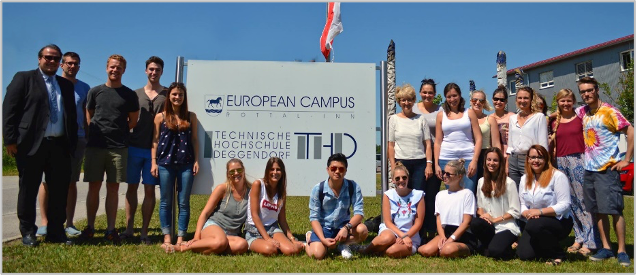
Our student association and its members are responsible for many of our beloved traditions such as the Semester opening and closure parties, the elegant Winter Ball and Summer in the City, our spooky Halloween
party and our funny Secret Santa. It functions as a reminder, that we can work together collaboratively with cultural differences and languages. It is a reminder of our intercultural footprint, a heritage as a campus. It represents
the mindset for future teamwork and the Pfarrkirchener student culture as being one of its important values. It also has been a way to bond with the local community an d businesses of the city, collaborating with local businesses such
as Cookies, Bäcker Bachmeier, Carisma, Boogaloo and even the supermarket chains REWE and EDEKA.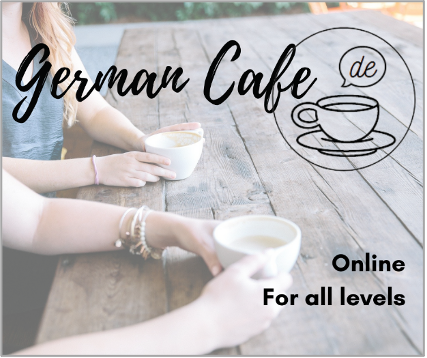 However, our student association is not only about parties. Various Projects such as the German Café, a format in which students have the possibility to improve their German speaking skills by talking to native speakers
in a relaxed environment that provides all levels of the language. The Cultural Continental Days, an upcoming project starting in summer semester 2021, are a set of events in which students can present their countries. The association
also promotes academical knowledge by organizing workshops and inviting guest speakers.
However, our student association is not only about parties. Various Projects such as the German Café, a format in which students have the possibility to improve their German speaking skills by talking to native speakers
in a relaxed environment that provides all levels of the language. The Cultural Continental Days, an upcoming project starting in summer semester 2021, are a set of events in which students can present their countries. The association
also promotes academical knowledge by organizing workshops and inviting guest speakers.
Additionally, the Funky Kitchen where students gather to cook and learn about traditional cuisine of different nations and the Volksfest
march is one of the few places where students and locals interact under a Bavarian atmosphere. As a result, it is evident that the student association is a tool for intercultural integration.
With a small representative fee of €10 per semester members receive:
- First hand information’s for events, study trips or student assistant jobs
- Enjoy benefits for events and excursions
- Peer to Peer support and study tips
- Make new friends and participate in existing projects
- Extend your professional network
Since December 2020 our student association is working under a new Team with motivated and engaging students.
New Website
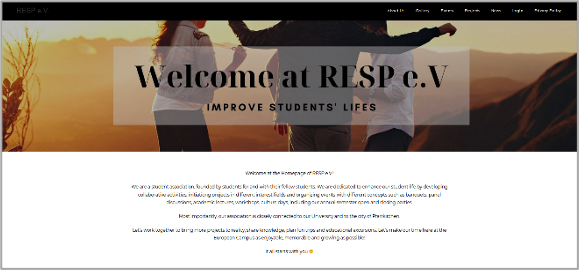
As an attempt to increase awareness of the association and increase the engagement towards RESPies, a new website has been launched (resp-ecri.de).
Member Certificate
Those members who actively participate in the activities of the association will provide a recognition certificate. This document, available the end of the semester, will summarize their contributions, which can have a positive impact
on their future applications.
New members welcome
For the future of RESP, the board of directors hopes to encourage new members to understand that our association welcomes all students and new ideas for projects and activities.
RESP signifies
- Diversity and the chance to experience a small part of the world in single place.
- Intercultural exchanges and countless opportunities for growth in the most diverse areas.
- All members contribute to the growth of our community.
- The heart and soul of the association are the members, or as RESPies say “it all starts with you!”
Daniel Rodriguez Perales, Valerie Elke and Aldana Campo • 03/2021
Back to classes! Glad to have you back!
Next Monday a new semester starts, and with it a whole time for new experiences. As the last two semesters, the Summer Semester 2021 will also be a little bit challenging, but equally exciting!
LECTURES
For this semester, the European Campus Rottal-In has decided that all lectures will be held virtually. Exceptions will be made for certain classes, such as some specific laboratory classes, which will follow strict hygiene and distance
protocol.
Virtual lessons can be held both by MS Teams and Zoom. Please check with your lecturers for confirmation.
As usual, lecture attendance is not mandatory but highly recommended, especially during this difficult time.
CORONAVIRUS RULES
Attending the ECRI Campus is only possible with an appointment. Usage of FFP2 masks and maintaining two meters distance is mandatory, on both inside and outside campus grounds.
When visiting the campus, you must state at the entrance who are you going to visit and at what time is your appointment. Please disinfect your hands and check in by scanning the QR code on the walls and offices.
Disinfect your hands again before entering to the office or classroom you are visiting, and don’t forget to check out of the App on your way out.
ECRI LIBRARY
For Summer Semester 2021, ECRI LIBRARY will work with a “click and collect” service option: Students can reserve a book online and then book an appointment to pick it up at the ECRI or DEGGENDORF library centers.
Appointments are booked through ilearn: https://ilearn.th-deg.de/mod/scheduler/view.php?id=214416
In order to check books out of the library, students must have taken the obligatory introduction library course. This course must only be attended once during the duration of your studies, and you can book your place at the next online course at iLearn.
INTERNATIONAL OFFICE CONSULTATION HOURS
During this semester International Office will be offering weekly online consultations hours on Tuesdays at 14 until 15 hours, by Zoom. To assist, you just have to join the Zoom meeting with the link sent the week before at your student email account.
This consultation hours are aimed to clear individual doubts regarding arrival at Pfarrkirchen, bureaucratic tasks and other topics which concern the international office.
Questions are answered in a private session, so you might need to wait a bit before entering the online room.
THD STARTUP CAMPUS: MORE PARTICIPATION AT ECRI CAMPUS
Do you have a great business idea, but don’t know where to begin?
Well, then we have great news for you: contact the THD Startup Campus team and awake your inner entrepreneur!
THD Startup Campus is a mix team of university professors, personal and students that want to help students, employees and alumni develop their own companies and startup ideas. Some of their members were themselves entrepreneurs and founders
of startup companies and can help you in every step you need: from organizing your idea, developing the business plan, to securing financing and the foundation of the company.
Since December last year, Startup Campus has been more present than ever at the ECRI Campus, and now there are three brand new ECRI Entrepreneurs among us!
Startup Campus has also appointed a new International entrepreneurship manager: Tanya Marin-Weigelt.
You want to know more about them and their activities? Then contact them at startupcampus@th-deg.de
Ayelen Toscano Juanes • 03/2021
Student IT Support
The Student IT Support is available every Tuesday and Wednesday from 1pm to 2pm live on MS Teams.
If you have any queries/issues, you may type them in the "Chat " using MS Teams. We will definitely get back to you. If the above options do not answer your concerns, send an email to ec-it-support@th-deg.de OR sumbit a form at https://intranet.th-deg.de/it-support
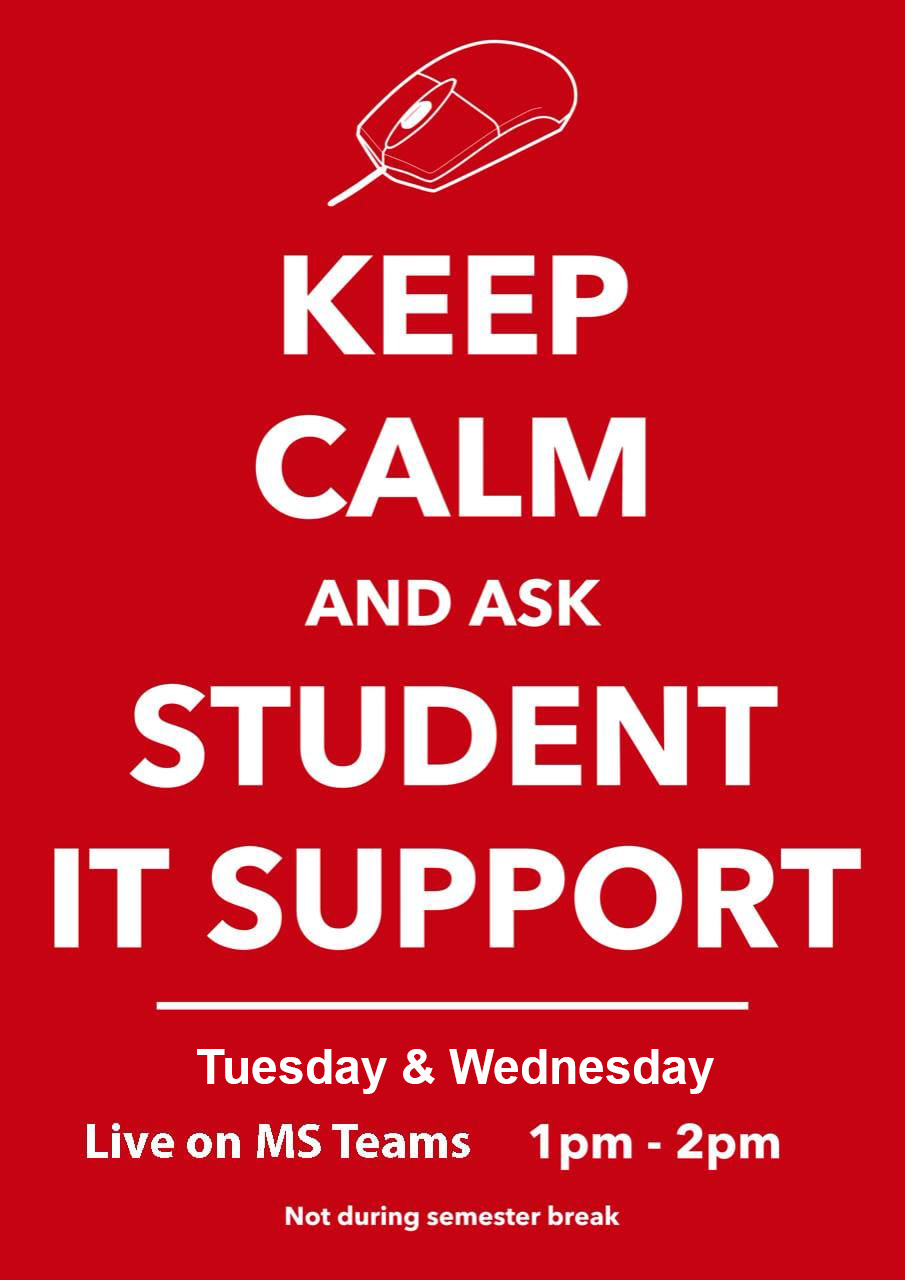
Miriam Bleck • 03/2021
International Office
International Office • ECRI Orientation Day
Via the iLearn course, all students are informed about the currently valid entry regulations and quarantine guidelines.
In addition, the International
Office provides comprehensive information about all steps necessary to start the semester at our university and in Pfarrkirchen and provides information about living and studying in Germany/Pfarrkirchen. The course is constantly
updated and expanded.
Follow the Link
IO • 03/2021
Leisure Time & Entertainment
Travel tips in Europe
Travelling by train through Europe? Best tips to make your journey a great experience
music, movies and more
It's finally getting warmer and besides the beer garden season, the culture and music season is also starting, this year mainly open air.
The Eulenspiegel Flying Circus in Passau runs until 8 August, with mainly German-speaking artists performing. In the beer garden next to the festival you can enjoy the atmosphere between the rivers with a cool drink.
Here you can find the programme: https://eulenspiegel-passau.de/
The Gern Geschehen Festival near Eggenfelden takes place at the end of August, with music from various bands, a creative market with regional producers and a food market: https://gerngeschehen.eu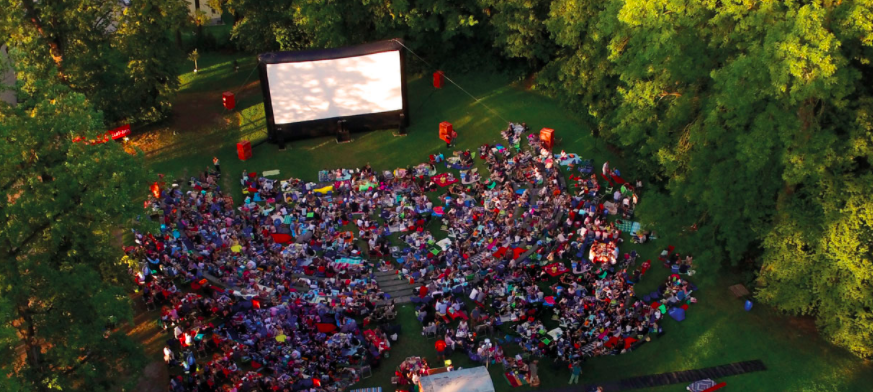
Photocredit • Gerniale: https://www.gerniale.de/de/programm
For the film fans among us, the Gerniale from 21.07 to 31.07 is the place to go. Tickets for
the open-air cinema located in the Schlosspark in Gern are now available, there will be no evening ticket desk. Here you can find the programme:
https://www.gerniale.de/de/programm
The Sommernachtskino in Passau also takes place in July and August: https://www.cineplex.de/filmreihe/sommernachtskino/3516/passau
Of course there are many more events in the region! Information about the events in Pfarrkirchen can be found here:
https://pfarrkirchen.de/aktuelles/veranstaltungen.html
Zauberberg organises also some events in the Passau-Deggendorf-Eggenfelden triangle:
https://www.zauberberg-passau.com/veranstaltungen
In Munich, the culture and environment festival Tollwood closes this WEEKEND so check it out quickly: https://www.tollwood.de/en/tollwood-sommerfestival/
ECRI NEWS • 15.07.2022
Freilichtmuseum Massing
The sun is shining, you have a day off and you are wondering what to do?
Maybe you could venture to visit the open-air museum in Massing. It is not hard to reach: You can go there by train (10 min walk from the station to the museum), by bike (the Rottal bikelane runs directly past it) or by car (parking facilities are available).
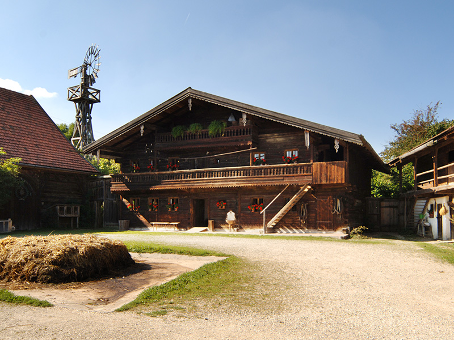
Arriving at the museum you might wonder where it is. Thinking of a museum you imagine one building where you can see an exhibition. But that is not the case in Massing. Here you can see several different buildings, all of them are original Bavarian farms and houses. The oldest house was built in 1611. Besides the unspoilt architecture you can experience how people used to live and work in the Rottal region. The agricultural aspects of the rural live are also represented. There are chicken and pigs and a cottage garden. Furthermore, you can learn something about traditional craftsmanship, e. g. the production of roof tiles, pottering or rope-making. You can also go bowling on an old traditional skittle alley. And if you are hungry after your exciting visit in the open-air museum you can stop for a bite to eat in the museum’s restaurant Museumsstüberl offering traditional Bavarian food.
From May to September the museum is opened every day except Monday from 9 am to 6 pm.
For more information have a look at the museum’s website: https://www.freilichtmuseum.de/massing-open-air-museum-/massing-open-air-museum
Pauline Kreis 10.06.2022
Finally, the 9€ Ticket is here!
For 9 euros, you can travel throughout Germany on local/regional trains for a whole month in June,
July or August. Means everything except long-distance trains.
Please note that there may be different rules depending on the federal state! As always, check the route section in the DB App beforehand to see if the offer also applies here.
And
the ticket is also valid as far as Salzburg in Austria, for example. In this doc you will find the
areas of validity for AT, CH and PL and the valid transport associations in DE.
Bedarfshalt???
There are many on-demand stops (Bedarfshalt), especially on regional services, where you have to let the train driver know in advance that you want to get off! The stops are marked in the DB App.
Can I take my bike with
me?
Normally yes on regional trains, with an extra ticket. But in some trains, bicycle transport is free of charge, which is also indicated in the DB App.
General: FFP2 masks are still mandatory on the train!
BikeStation • Self-Help Workshop
the content has moved here: https://ilearn.th-deg.de/mod/book/view.php?id=306213&chapterid=15440
Beer Gardens in and around Pfarrkirchen
Some of you might wonder what a “beer garden (Biergarten)” even is. The tradition of course originated in “the beer state of Germany”, also known as Bavaria. In the early times of the 19th century, in order to keep the beer cool and good during
the summer months and the fermentation, the brewers stored it in cellars and planted trees to provide shadow. As they weren’t allowed to brew beer during the summer months - due to the fire hazards caused by the equipment needed for brewing
– they came up with the idea to position some tables in the surroundings of the cellars and sell their beer to the people, a “beer garden”. Back then, it wasn’t allowed for the brewers to offer food as well, so the people had to bring their
own snacks.
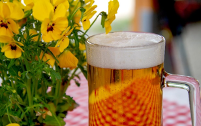 However, nowadays “beer gardens” are mostly also restaurants,
but in some it’s still allowed to bring your own food and just buy the beverages. So, if it’s a nice summer day, you’re done with your tasks for the university, or you want to get a little study break and enjoy some Bavarian or international
food and a beer or any other refreshing drinks, you might want to go to one of the many beer gardens in the region. Don’t worry, even if you don’t like beer, a visit in a beer garden is really nice.
However, nowadays “beer gardens” are mostly also restaurants,
but in some it’s still allowed to bring your own food and just buy the beverages. So, if it’s a nice summer day, you’re done with your tasks for the university, or you want to get a little study break and enjoy some Bavarian or international
food and a beer or any other refreshing drinks, you might want to go to one of the many beer gardens in the region. Don’t worry, even if you don’t like beer, a visit in a beer garden is really nice.
Next you can see some suggestions for restaurants in and around Pfarrkirchen, which have a “beer garden”:
Schwaibacher Hof
The Schwaibacher Hof is situated near Bad Birnbach and easy to reach by train or if you’d like to combine your visit in the “beer garden” with a little bike tour, that’s also possible. They’re usually open from Thursday till Sunday. If you like “Schnitzel” that’s the right address for you, as they normally offer a wide range of different ones for their guests. Their opening hours are Thursday 11 am - 14:30 pm and 16:30 pm – 21 pm; Friday: 11 am - 14:30 pm and 16:30 pm – 21 pm; Saturday: 11 am – 21 pm; Sunday: 11 am – 20 pm. If you’re interested you can visit their Facebook page, where they upload the menu for the week/month: https://www.facebook.com/Schwaibacher-Hof-538261486272617/
Gasthof Schachtl
This restaurant has a long tradition and is situated in the middle of Pfarrkirchen. The cuisine is typically Bavarian and ranges from snacks like cheese plates, sausage salad to different variations of “Schnitzel”. Of course, they also offer some desserts to satisfy the ones who have a sweet tooth. If it’s a nice day you can enjoy something from their menu and a cold beer or antialcohol refreshments in their beer garden surrounded by old chestnut trees. They’re usually open from 11 am till 24 am from Wednesday till Sunday. https://gasthof-schachtl.de/
Gasthof zur Mühle
Another option is situated in Bayerbach, which you can reach easily by train or if you rather want to get some fresh air and exercise you can combine your visit with a cycling tour. In their beer garden you can enjoy typical Bavarian snacks, like for example “sausage salad” and “Schnitzel”. However, if you don’t desire the traditional Bavarian food options, they also offer some pasta, salads, and burger. Their opening hours are Wednesday till Friday from 3 pm, and on Saturdays and Sundays from 9 am on. https://www.gasthof-zur-muehle.de/de/kulinarik/biergarten.html
Place for a picnic – near the Reichenbergkapelle
The Reichenberg castle, which was demolished in the 17th century, and with the remaining stones a restaurant was built. This building is still there and can be found in Pfarrkirchen, Herzog-Heinrich street 5. Unfortunately, the restaurant and beer garden with the beautiful views was closed in 2019. However, maybe you want to walk there, to enjoy the views of the region and bring a blanket, some snacks, and beverages.
There are also some international restaurants in Pfarrkirchen, which offer a nice terrace where you can enjoy their culinary offers:
La Boveda
The Mexican restaurant, which exists already since over 20 years, is situated in the middle of Pfarrkirchen. They don’t only offer a nice indoor area with its vaulted ceilings, but also a terrace/garden, where you can try and enjoy Fajitas, Enchiladas, Cocktails and of course also beer and anti-alcoholic beverages. They’re open from Wednesday till Sunday, 6 pm-10 pm. https://www.laboveda-pan.de/
Miró
The Italian restaurant can be found at the “Pollozek” in Pfarrkirchen, their opening hours are from Monday till Saturday from 9:30 am – 11 pm. Their “Terrazza” is kept in a Mediterranean style where you can immerse into the Italian cuisine from pizza to pasta and many other things. https://www.miro-pfarrkirchen.de/
Pizzeria Fiume
This Italian restaurant can be found near Norma in Pfarrkirchen. They offer typical Italian food from Monday till Sunday 10 am – midnight, which you can eat on their nice little terrace in their courtyard. https://www.deinrundgang.de/projekt/ristorante-pizzeria-fiume/skinned/
Of course, there are many more options in the surroundings of Pfarrkirchen, if you need more recommendations and options, you should ask the locals you know, for their recommendations regarding restaurants with nice beer gardens, as they often
have some insider tips. I indeed did the same for the purpose of this article.
Making a barbecue in and around Pfarrkirchen
In public parks in Bavaria, a barbecue is only allowed if there are signs which say so, in nature reserves it’s strictly forbidden. If you make a barbecue where it’s not allowed, you might have to pay a fine. So, you have two options in the
region of Pfarrkirchen, where you can enjoy a barbecue.
However, there are also some things which have to be considered:
- Only use areas which are designated for barbecues and ensure, that the grill has a secure footing
- Only use safe grill lighters and don’t leave the barbecue unattended
- Don’t dispose the ashes when they’re still hot
- Pay attention to the wind, as fire sparks can increase the risk of fires
- It’s best to have a bucket of water prepared, in any case of emergency
Rottauensee
Several barbecue areas are available around the Rottauensee in Postmünster. If you want to make a barbecue, there you firstly have to register it. Therefore, you have to call the following phone number 08561/306-23 (association for the Pfarrkirchen-Postmünster recreation area).
Your balcony or garden
It’s not forbidden by law to make a barbecue on your balcony. However, you should have a look at your rental agreement and the house rules, as sometimes the landlords write down some restrictions. Sometimes, it’s forbidden to use charcoal barbecues, but the use of electric and gas grills is allowed. If you’re not sure about something, it’s probably best to ask your landlord about the regulations. If you live in a flat with several people you should also ask your roommates if it’s ok for them as well and maybe even your neighbours when you fear that the smoke could disturb them.
How to make a barbecue more sustainable?
1. Sustainable grill charcoal and alternatives
Buy grill charcoal from native trees (e.g., beech) as otherwise it’s often from other countries in South America or Africa where the wood needed for it, is sometimes even lumbered illegally. But there are even more things you should pay attention to when
buying charcoal, as there are some wood seals which can tell you, that the coal is rather “good”:
- FSC (recommended by NABU & BUND),
- PEFC (recommended by the Ministry of Agriculture, but not by NABU & BUND)
- Naturland (recommended by NABU & BUND)
There are also some alternatives to the classical wood charcoal, which are out of agricultural waste, like for example charcoal out of the kernels of olives, corn cobs, shells of coconuts or grape wines. However, those are quite expensive,
and therefore not really interesting for our student budget and you mostly have to order them online, which isn’t that sustainable. Additionally, you shouldn’t use any chemical barbecue lighters as they are bad for the environment, rather
use natural lighters.
2. Different grills/barbecues
There exist many different types of barbecues, which all have their ups and downs.
Charcoal barbecue- As already stated, it’s important, to at least look for the seals and make sure, that the wood used for the charcoal isn’t coming from far away tropical trees
- You could use a “globe/kettle BBQ”, as they have a lid. Thereby the inside reflects the heat and your vegetables or/and meat get cooked gently and evenly
- Many portable options
- Easy to switch on/off and to regulate the heat, those makes it possible to use only that much energy you really need
- Not portable
- If you have green electricity and would operate the barbecue with renewable energy, this one would have the best carbon footprint
- Easy to switch on/off and to regulate the heat
- makes it possible to use only that much energy you really need
- Uses propane, which doesn’t belong to the renewable energies
- Right now, the selection of those is limited and some reviews of such barbecues, state, that it’s more like a food steamer
Moreover, it’s better to buy a reusable barbecue, as the cheap one-time use roast, to prevent the waste. Another thing you can do is, to buy instead of aluminium foils, reusable grill pans and containers, which you can for example use for cheese or potatoes. Thereby you can reduce the waste you’re accumulating.
3. What to put on your barbecue?
Now, that we’ve discovered different barbecues and types of charcoal, we have to think about, what we want to eat and put on our barbecue to make it more sustainable. If you want to have meat, you should pay attention to, where it’s coming from. It’s advisable, to buy from a local farmer or butcher, where you can see and/or ask how they keep their animals. For sure, that’s a bit more expensive than buying the cheap meat options from the local discounter, however, it’s not only better for the environment but also for you and your conscience. Yet, it doesn’t always have to be meat, a barbecue can also be awesome with vegetables. There it’s best to use the ones which are in season. Right now, you could use asparagus till the middle of June, mushrooms, potatoes, tomatoes, and onions nearly the whole year. Moreover, are zucchinis and sweet corn options during the summer months. So, like you can see, there are many vegetable options which can be bought from native produce and on the internet, you can find lots of recipes and ideas for vegetable barbecues. Bavarian season calendar vegetables and fruits (unfortunately it’s in German): https://www.kern.bayern.de/mam/cms03/shop/flyer/dateien/200407_final__kern_saisonkalender_barrierefrei_neu.pdf
A tale of Easter in three traditions
Mary, from Egypt
Hello! What´s your name and where are you from?
I am Mary and from Giza, near Cairo, in Egypt.
When do you celebrate Easter?
This year we celebrate it on the 24th of April. We are kind of one week behind, as we are Orthodox Christians and follow another calendar.
When do you start with the celebration of Easter?
Palm Sunday. Since that moment, every Sunday is a specific celebration, and Palm Sunday is when we start with the real celebration
For how long do you celebrate the pre-easter period, the lent?
Yes, we celebrate Easter on its own, but in the period before it, we start 55 days before, and we fast during those 55 days.
What does this fasting consist of?
You cannot eat anything from midnight till 3 p.m. So, we fast during the morning. And when we eat, we follow a type of “vegan” diet, with no animals products.
When do you break the fast?
We break it when the clock strikes midnight on Saturday, and it turns into Sunday early morning.
Do you celebrate the arrival of midnight?
I know some people do it differently, but for me and my family, we do. It’s a celebration that starts on Saturday when we start cooking and preparing everything, and then at 12, we celebrate the arrival of Easter Sunday and the break of our fast.
What type of meals do you eat to break the fest?
Well, everything we couldn´t eat during that period! Hahah… We eat meat, chicken, fish because we couldn´t eat them for a long time. Soups, etc. Peppers filled rice.
Fasting like this is not a must, in some other Christian churches I know they do not do this, but for us orthodox is like this.
Which days are bank holidays in your country during this period, or which days are considered days “off” in your country?
There are no official Easter holidays in my country, but Easter Sunday is a day that the Christian community can have it off if they wish so.
On the following day, Easter Monday, this year we all have a day off, no matter your religion, as it is an official bank holiday in Egypt, but completely unrelated to Easter.
How do you celebrate the days coming up to Easter? What do you normally do on these days, etc?
Each Sunday is a different celebration, also each day has a different meaning for us. In orthodox, we use another language for this celebration, and the priests and specialized people in the church speak and read in this language,
How do you celebrate Easter Sunday?
Normally, it is a day to be with our families. We meet with family, go out, and do family-related activities. Younger people might also go out with their friends and celebrate it like this, personally, I always preferred to spend it with my family.
Do you celebrate Easter Monday? What is traditional that you do on this day?
Yes, we celebrate Easter Monday. We also spend this day with family, and we eat a certain type of fish and boiled eggs. It is also very normal that during Easter Monday we go to the park and have a picnic, among other things.
What does Easter mean for you, on a personal level?
It´s a glorious day, a day of faith and meaning for me, and it’s a way for our family to become one.
Subin, from India
Hello! What´s your name and where are you from?
Hi! My name is Subin Baiju, I am from Kerala, in India.
When do you celebrate Easter this year?
We celebrate Easter this coming Sunday, April 17th.
When do you start with the celebration of Easter?
Well, I am from a Roman Catholic background, so we started the lent period on February 28th, with the fasting.
How do you celebrate Easter Sunday and Easter Monday? (with what traditions, foods, celebrations, etc)
In India,
we don´t celebrate Easter Monday!
But when it comes to Easter Sunday, we normally celebrate it by going to holy
mass in the early morning, at 3 am. After the holy mass at church, everyone
will get Easter eggs and black coffee, breaking our fasting.
And how do you celebrate the days coming up to Easter? What do you normally do on these days, etc?
Well, during Maundy Thursday, in our church our priest chooses 12 people from our parish, and wash the feet of those 12 people, as a way to remember when, in our tradition, Jesus washed the feet of the apostles.
Normally, during Good Friday and Saturday we take them as quiet days, we try not to do many activities which might bring “happiness”, so to say, as those are days to remember and pray, according to our culture and religion.
Friday evening, we go to church, pray, and then do the procession, which is a public event of penitence that takes place on this day, in which many images of saints and the image of crucified Jesus is carried on the shoulder of people holding them together, among other things. At the end, the church distributes something we call the “bitter juice”, normally made from a gourd (melon), or neem juice.
During Easter Sunday, normally we eat tapioca with fish curry or chicken or beef. So, the things we did not eat during the fasting.
Which days are bank holidays in your country (if your country has an official bank holiday for Easter) or are considered “off” in your country?
In Kerala, from Thursday onwards.
Ayelen, from Argentina
Coming from Argentina, “Easter” is no strange word to me. With a great number of roman-catholic people, and also a significant number of people from other Christian backgrounds, the country kind of stops during Easter week… though I have to say that, at least in Argentina, Easter seems to be celebrated differently than in other countries.
Well, of course, we follow the basics: we celebrate Easter on the 17th of April this year, for example, and we have some Christian traditions most of the population maintains, such as not eating meat and only eating fish during Easter and the days before Easter (Maundy Thursday, Good Friday and Good Saturday), but that is when the similarities stop.
Although if you ask, most Argentineans will describe themselves as Christians, most of them will also admit that they do not go to mass during Easter, and prefer to spend this holiday in a different way, such as being with their family, going on holidays, or being with friends.
Friday and
Saturday are bank holidays, with Thursday being an “optative” bank holiday,
with schools and other public institutions closed for the day, and most private
companies also choosing to not go to work during Maundy Thursday.
During these days, most families might organize a short family trip to a
close-by destination, a way to enjoy the last days of summer (remember that
Argentina is on the other side of the world, and while in Germany and Europe in
general Summer is just starting, there it is ending, so any way to enjoy the
last days of warm temperatures are highly welcome).
On the other hand, others might choose to stay home and spend these days with family, visiting different family members and friends.
Differently
from other countries, Argentineans do not normally fast in the period before
Easter (lent), though they might get more involved in charitable organizations
and activities. It is still common for many families to avoid eating certain
foods during the lent period and the easter period, such as red meat, but fish
and seafood are still eaten during those days, as well as alcohol and other
beverages.
The day before Easter is a great opportunity for families to meet and start
cooking together. Some of the most common dishes these days are fish empanadas
(empanadas de vigilia, as they are called in Spanish), fish with mashed
potatoes, and other dishes with fish and vegetables. Pasta, especially stuffed pasta
such as ravioli, are very common during these as well. Of course, when talking
about Easter food, one cannot forget about the crown of Easter sweets: the
“rosca de pascuas”, a sweet bread in the shape of a ring, topped with custard
cream, candied fruit, and sometimes, chocolates and hard-boiled eggs as part of
the decoration. This pastry has turned into a tradition, and the many bakeries
in Buenos Aires always compete to show who does the best “rosca de pascuas” in
town.
Another classic during easter is, of course, the famous chocolate eggs. In Argentina, many bakeries also do their own, and decorate them with different things, also selling them with different surprises inside of them.
Though Maundy Thursday, Good Friday and Good Saturday normally go by as any other day, during Easter Sunday people will gather with their close family members, eat all these delicious meals, exchange chocolate eggs and share them between themselves, and then end the day with their bellies full and their hearts even fuller.
Contrary to many other countries, Monday is just a normal day in Argentina, with no special celebrations taking place. It is also not a bank holiday, therefore schools, public institutions and companies open just as any other day. Considering that Monday is just one day after eating all day, it might be good to reconsider declaring it a bank holiday, I think now!
Easter is, for us, more of a time to be with family, take a short break from daily life and work, and celebrate being with one another, than a very religious holiday period. That does not mean we do not respect the religious aspect of that: there are masses, and we try to keep quiet on Friday and Saturday, to respect people who are celebrating it in another way.
In our way, I think Argentineans have found a great way of balancing how we are during this particular holiday, and that is why I love it so much: it is, definitively, a short tourism break for us, but at the same time it has a religious element we still keep and we cannot day, while at the same time being all about the thing we love the most: spending time without family and celebrating with them.
Ayelen Toscano Juanes 15.04.2022
Last month of summer holidays! Day trip to Passau with vintage shopping event included!
Hello dear ECRI Friends, and welcome back after our summer recess!
We are back but (luckily) we still have one month and a half of summer holidays until the start of our next semester! For all those here in Pfarrkirchen and the Rottal Inn region which don´t know what to do anymore: what about a short weekend trip to one of Lower Bavaria’s most beautiful towns, Passau?
If you haven´t heard about it, Passau is one of the biggest cities in the region, and a truly unique place to visit. You can get to Passau in just an hour and a half by train, or 45 minutes by car. Trains depart every hour from PAN main station and leave you at Passau main station, which is strategically located inside the city.
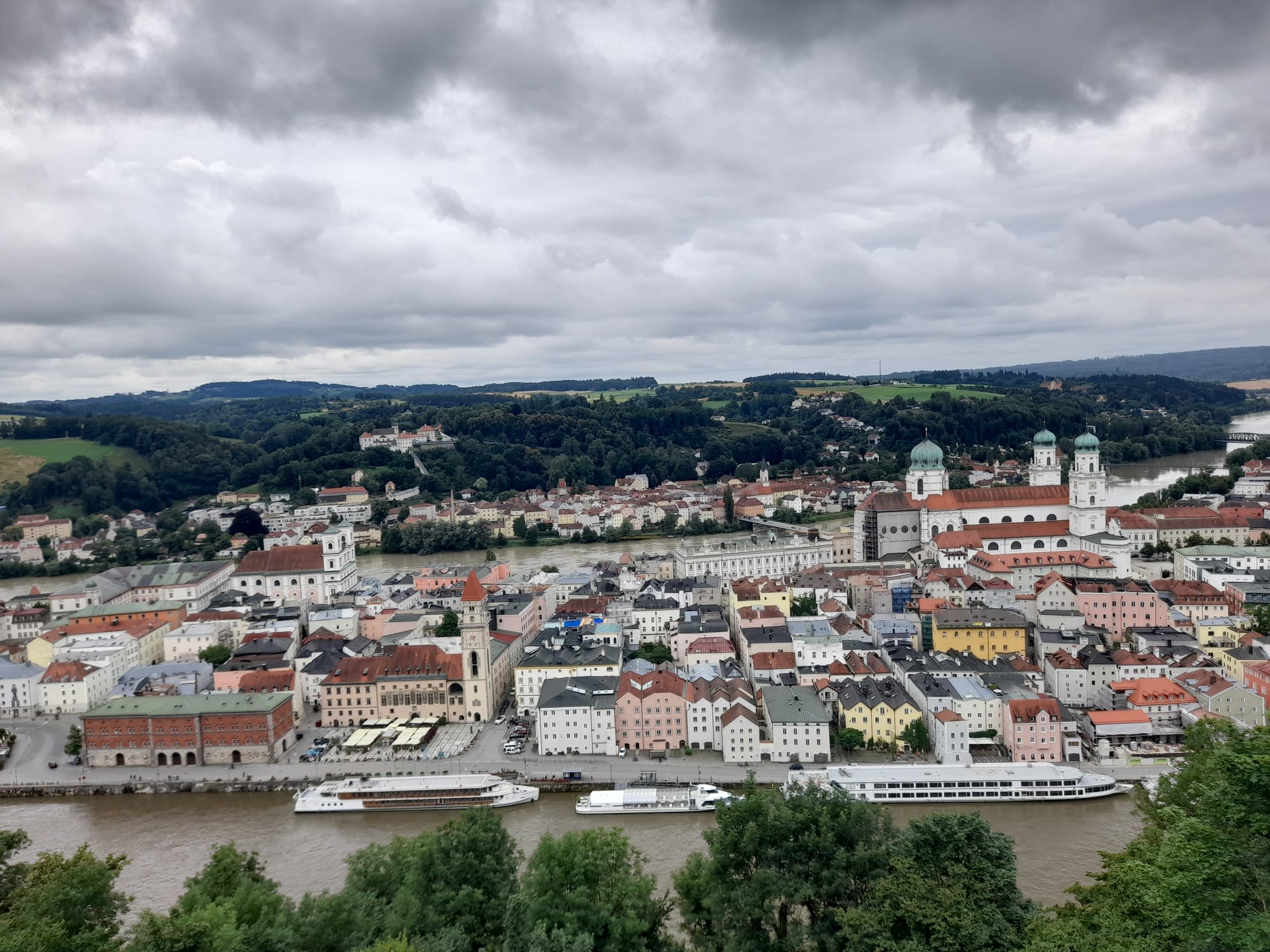
source: own photo.
Tickets to Passau cost 15.6 euros one way, or you can use the “South Bayern ticket” (Südostbayernticket) if you want to go and come back on the same day, for just 22 euros per person, and 8 euros for each extra person. So, if you´re planning for a short trip with your roomies or some friends (always remember the latest SARS-COVID-19 regulations, as stated by the federal and national government), this might be a great opportunity!
Remember the ticket can be used between 9 am and 3 am of the following day from Monday to Friday and all day during Saturday and Sundays. Great news too: children travel for free!
Top 5 things to do in Passau
Walk the “artist alley”
Passau is known for its beautiful small art galleries, which are all alongside Höllgasse street. You can easily identify this street because of its pavement with multi-colored stones.
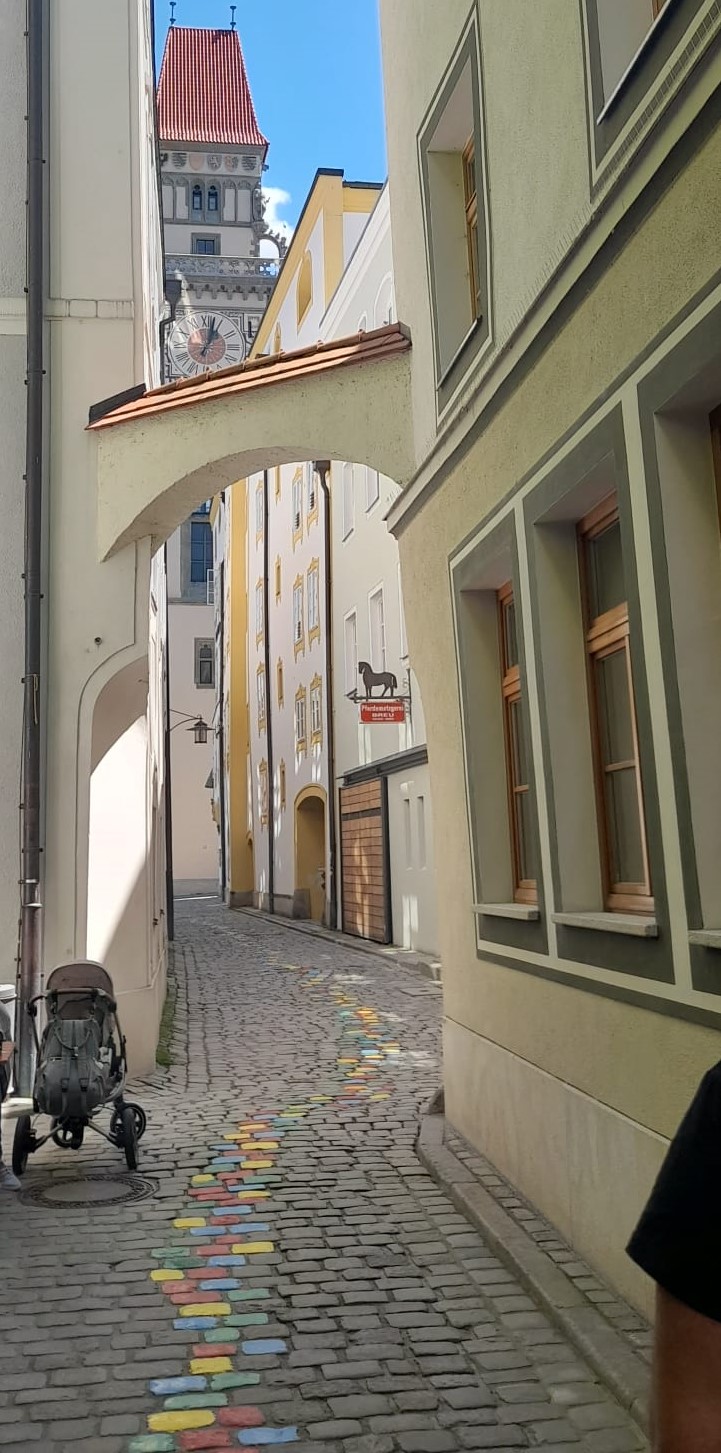
Visit the St Stephans cathedral
St. Stephens cathedral and the buildings attached to it will give you an amazing image of the city´s past and its present. Alongside it, you have one of my personal favorite cafes: Café Anton; and one of the city’s oldest libraries! A total adventure
for book lovers!Walk alongside the Inn or the Danube, until the three rivers joint point.
Ahh one of the most loved and dreadful places for Passau residents, as it provides a beautiful and unique view of the city and its connection to its rivers, but it can be easily flooded during rainy days, the "Dreiflüsseeck " provides an amazing view and nice relaxing area after walking around the city.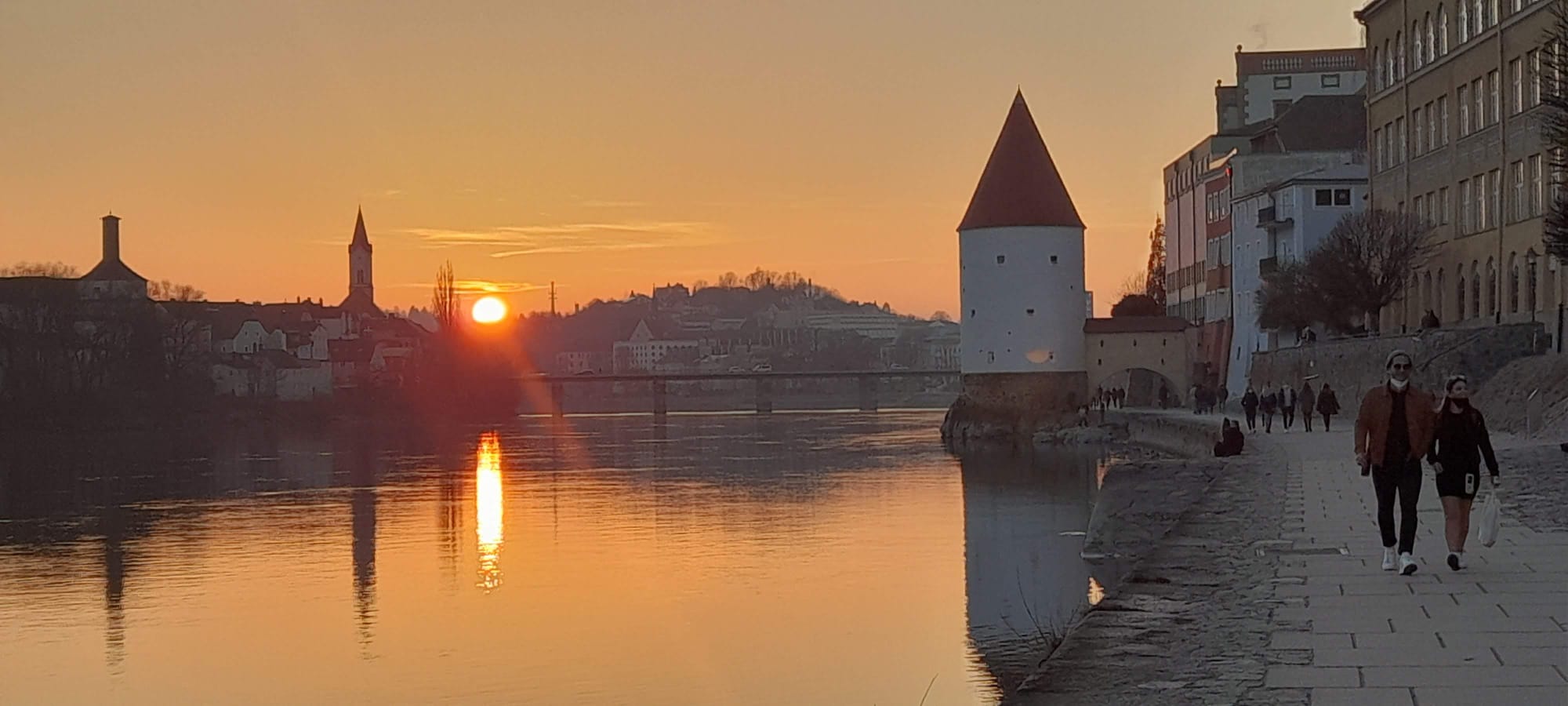
Get one of the best views from the Veste Oberhaus viewing point…
… and maybe stop for a pint of Bavarian beer? Veste Oberhaus is an old fortress and monastery, which served as a stronghold for the bishops of Passau. From there you can get amazing, beautiful views as almost nowhere else in Passau. Next to it its also
one of Passau most well-known restaurant, Veste Oberhaus Restaurant, where you can enjoy a refreshing beer with a unique view. You can get there walking from the left side of the Danube. It´s not a very difficult way up, but if you have any preconditions and especially if it´s during a hot day you should bring plenty of water, something to cover your head and do any necessary stops.
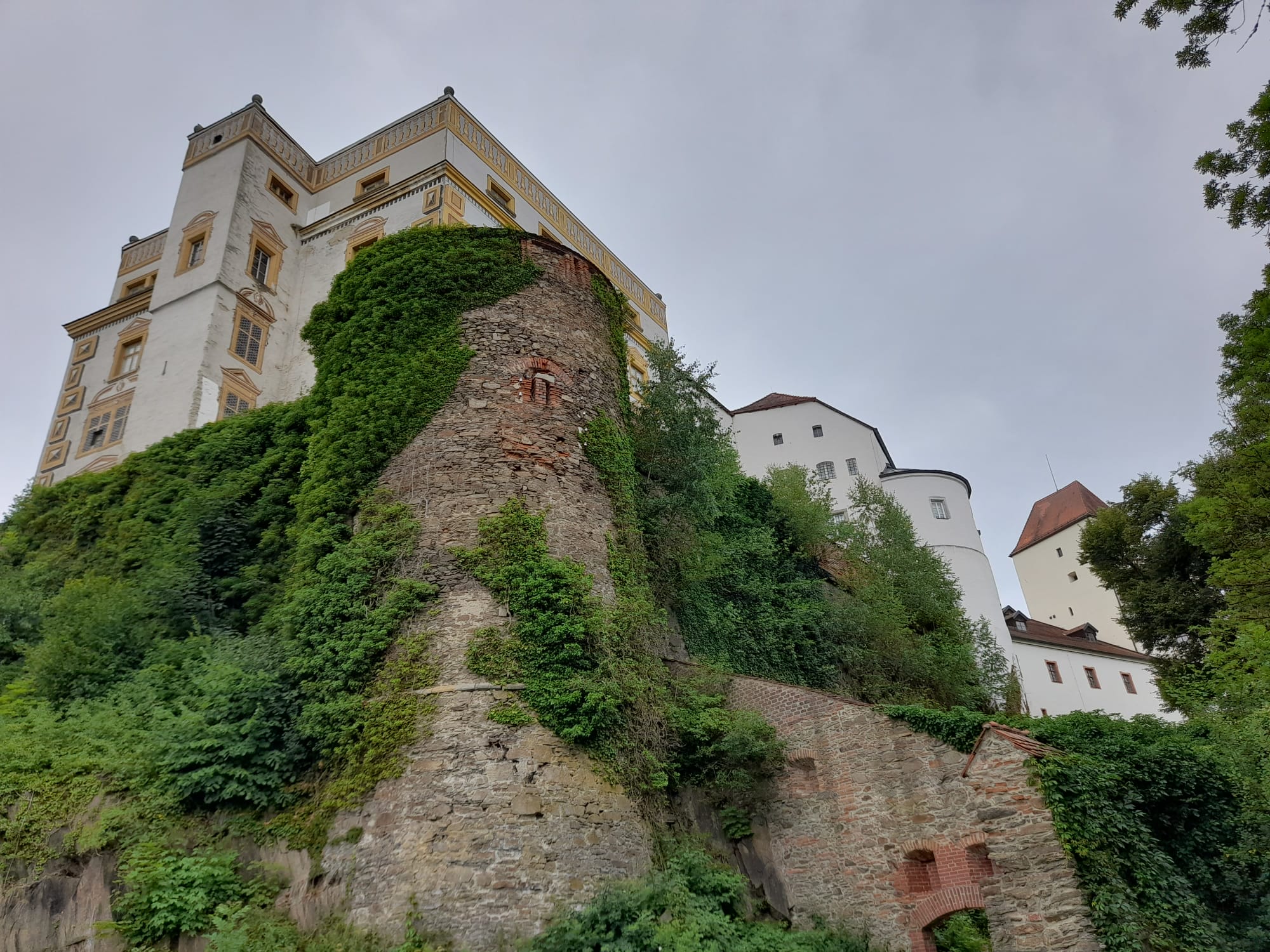
Visit the city center, from the main railway station until the Inn River – and even further beyond!
Passau has amazing architecture and a very lively city center which will always offer you something. Getting out of the Railway station, you can walk straight until you reach the Europa passage shopping mall, and then go left towards Passau pedestrian street. There you´ll find nice little shops, cute cafes, and traditional restaurants to enjoy the best of Passau on a budget.
Don´t be afraid to explore the city by entering some of the smaller streets and alleys.
Where to eat in Passau
(Disclaimer: we take no responsibility for the restaurants and gastronomic venues here mentioned. There is no commercial or promotional relation between the following gastronomic venues and ECRI, THD, ECRI News, or any member of the ECRI News Team).
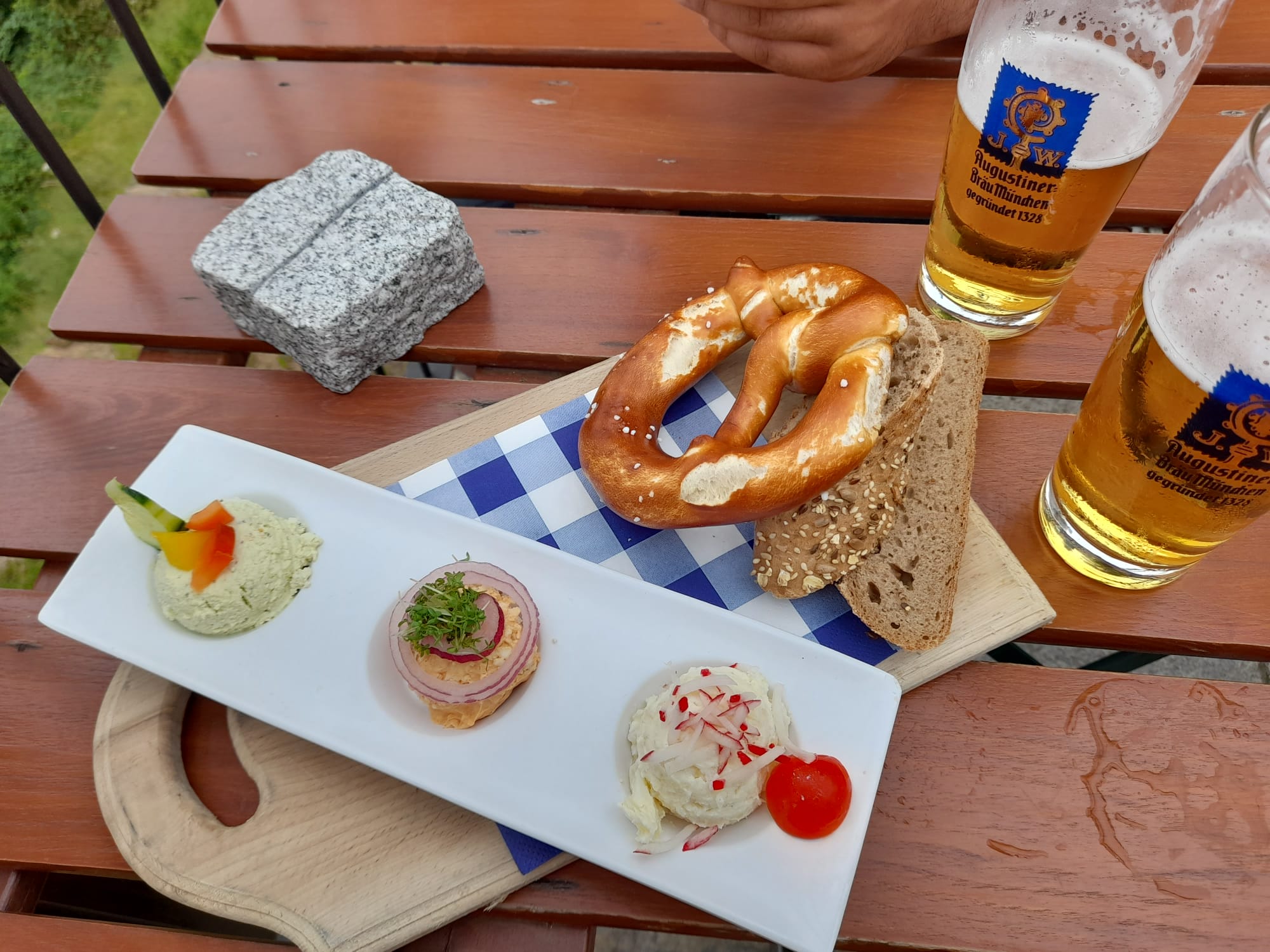
Pointing out towards good restaurants is always a hard task, as this is a very personal choice which might be influenced by your own personal taste, but there are some landmark places which can be pointed out in Passau, be it by their historical connection to the city, views, and architecture, or just their great, tasty food!
For those who want traditional food
For those who want traditional Bavarian food to go with this incredible environment and landscape, several options are available. The Löwen Brauhaus Passau, just in front of the municipality (Rathaus) offers traditional food in an incredible place, and with a beautiful outside terrace. Das Oberhaus, already mentioned before, offers the same type of food in another unique location of the city. Hotel Restaurant Paulsbogen gives a twist to Bavarian food, and it incorporates many delicious and economic vegan and vegetarian options. And if what you are looking for is a nice Biergarten close to the train station on the way back home, then Bayerische Löwe should be your place to go!
For a more detailed list of the best traditional Bavarian restaurants in Passau, you can go visit the recommendations listed in Tripadvisor.
Lunch on a budget
We´ve all been there: being a student doesn´t provide much time for full-time working, and studies must always come first. If you want to have a nice lunch without breaking the piggy bank, Dito´s Gustoria can be an excellent place to visit. Located in a quiet little street just three blocks away from the pedestrian street, where you can enjoy some simple Italian specialties, with prices as low as 5 to 9 euros. The service is great, and the environment and decoration will make you feel just as being in Italy.
For a quick bite, Café Emotions and Café San Paolo will offer you sandwiches, snacks, and drinks for a low price in the city center of Passau. Or, if on the other side, you are very hungry but low in cash, Jento Restaurant & Bar has a variety of Vietnamese and Japanese specialties for prices as low as 5 euros!
If you want to explore other budget options in Passau, check here.
A café with a unique view
When in Passau, a place you cannot miss is Diwan Café & Lounge, a unique and great rooftop café just in front of the bus central station, which will provide you an incredible areal view of Passau.
Prices are relatively low, and they specialize in chocolates and confectionaries, so you can expect a great variety of cakes and sweet treats there.
For other venues in Passau, visit this list made by Tripadvisor with the best cafes in Passau.
BeTrifty Event
And, for those who enjoy shopping but want a different experience: what about doing some thrift shopping? During today (3rd of September) and tomorrow (4th) one of Germany´s biggest thrift stores, BeThrifty, is coming back to Passau to offer their unique thrifting experience.
For only 39 euros, you can buy up to one kilogram of clothes. What can be included in that kilo? Everything! But so you have an idea, you can end up buying a whole outfit for just that price, all while buying exclusive brands and helping save water and resources from the planet! What a nice thing, right?
For more info about BeThrifty even, go to: https://bethrifty.store/ or in the online facebook event
(Disclaimer: ECRI and ECRI News takes no responsibility for the information and changes on the BeThrifty event in Passau, or the event itself. There is no commercial or promotional relation between BeTrifty and ECRI, THD, ECRI News, or any individual member of the ECRI News Team).
Passau´s Flohmarkt
If maybe thrifting and finding hidden treasures are your thing, but you can´t attend the event mention before, we can always recommend you the Flohmarkt in Passau, which takes place every Saturday in the Innpromenade, the Inn´s river coastline
street, from 8 until 17 hs.
There you will find tons of different articles, from second-hand furniture, books, electro domestics, and clothes; to new articles sold by local artists.
If you want to know more, visit https://flohmarkt-passau-innpromenade.de/
, where you will find the latest information regarding timetables, dates, and rules.
For more information about Passau (such as accommodation or its ever-changing cultural offer) visit: https://tourismus.passau.de/
For information on transportation around the city, you can visit: https://www.passau.de/LebeninPassau/MobilinPassau/mitBahn,BusundTaxi/Bus.aspx
Short weekend break: Spa Day at Bad Birnbach!
And now, the time has come. Between exams and the end of the semester, most of us planning holidays and/or travelling back home, life can seem very stressful at the moment.
So, if this weekend you want to relax a bit from exams and pressures, we recommend you one of Rottal-Inn´s most beloved locations: The Rottal Terme in Bad Birnbach.
And even if you are cram with exams, studying in front of a pool with the sun shining over you seems better than staying inside the house, doesn´t it?
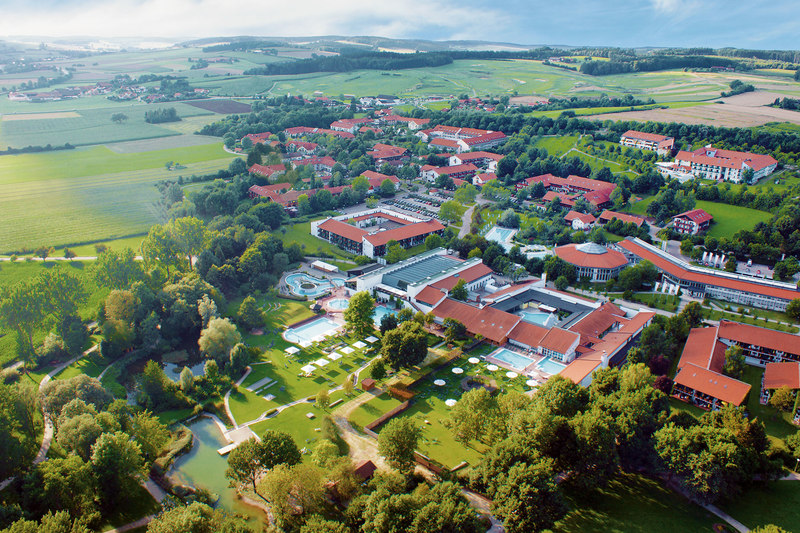
Copyright: Dieter Demuth / gem.AGB
Bad Birnbach is a small Bavarian town, with just around 5 thousand inhabitants. Its is well known for their spa hotels, and their Spring and thermal waters.
Located just 13 km from Pfarrkirchen, you can get to Bad Birnbach in 15 minutes by car, approximately 23 by train, or for our more experienced bikers, in 45 minutes by bike.
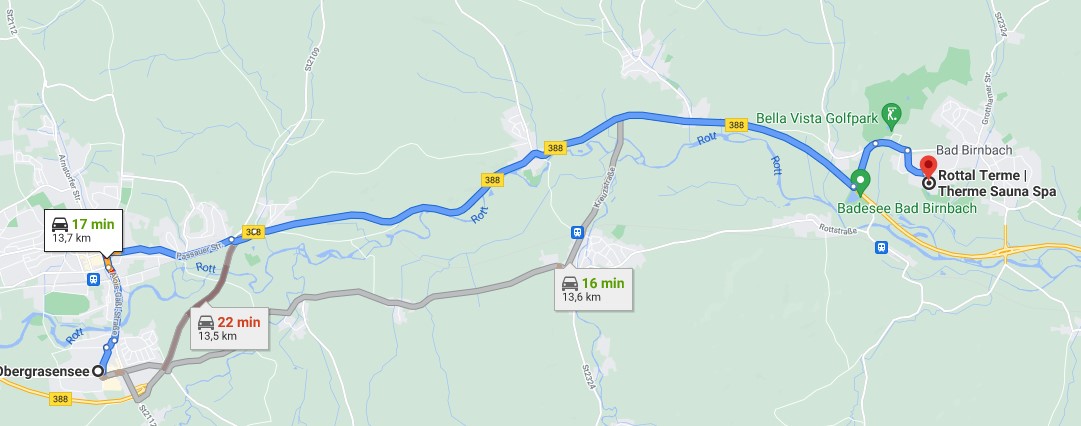
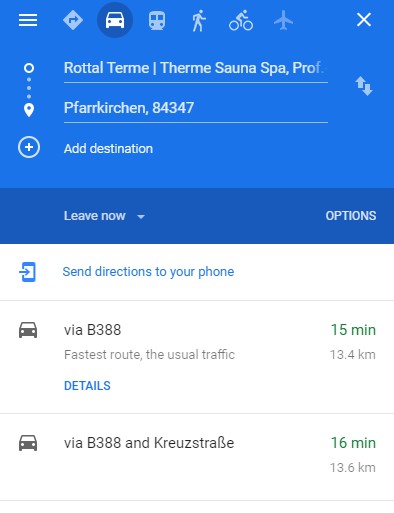




The Rottal Terme has everything you need to enjoy a perfect afternoon. Restaurants with delicious and traditional food; green areas to relax, and three different thermal areas: the Therapeutic Spa treatment, the Spa Word, and the Sauna Word; all of them with their unique pools and centres.
It is opened from Monday to Sunday, 9:00 – 21:00 Hs (Therapeutic Spa Treatment closes at 18 Hs). Prices vary from 12.5 Euros for three hours at the Spa & Spa Word, 17.5 for also three hours, but covering all three areas: or 23.5 euros for a day ticket.
There´s also the option to pay for extra sport classes at the Terme, beauty and skin-care treatments, or special promotions for bigger groups.
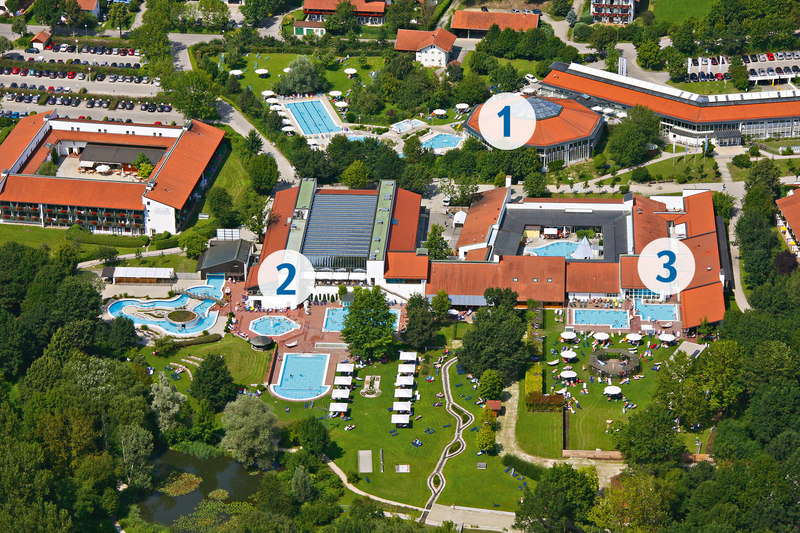
Copyright: Abel Reiner / gem.ABG
And if you want to explore more around Bad Birnbach, you can also visit the city centre, where you´ll find a new and innovative surprise: Bad Birnbach has now a small autonomous bus! This cute and small bus will take you from the train station to the market square.
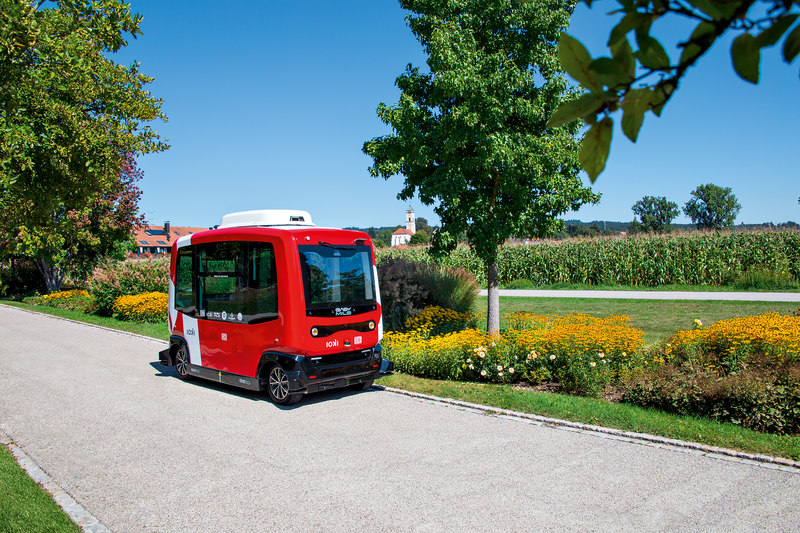
Coyright: Eva Stranzinger / dem.AGB
For more
information about the Rottal Terme visit:https://www.badbirnbach.de/rottal-terme/rottal-terme-im-ueberblick
And about the city: https://www.badbirnbach.de/
If you want something more local, don´t forget our other posts on what to know about Pfarrkirchen, places to exercise in Pfarrkirchen, and many others!Best TV Shows and Movies to learn German!
Learning a language through movies, tv shows and music, is one of the best ways to start assimilating new vocabulary and pronunciation. Also, it allows you to understand real conversations, expanding your listening skills.
Here we have selected some of the best, all time movies and tv shows, so you can learn German in a fun an easy way, chilling on your bed or your couch, and with a popcorn by your side! There a wide variety for every genre preference, length duration and on a lot of different platforms, so you can choose the one that best suits your situation and likes!
And be aware, because we will constantly add new movies / tv show to the list!
DARK
Genre: Science fiction, suspense
Seasons: 3
Episodes
: 26
For: 16+
Watch on
: Netflix
After the sudden disappearance of two children in the fictitious small town of Winden, four families will seek the truth, unraveling a complicated and sinister time travel conspiracy, which goes back to several generations before them.
The series explore the nature and relationship between the families in Winden, all connected between themselves, and which will see their darkest secrets reveled before themselves; while at the same time explores the reason for human existence and the meaning of time and space.
Dark is a science fiction and drama television series. It run for three seasons, and it was the first German-based Netflix produced series. It has been praised for its storyline, visual, effects, and the complexity of the narrative.
The level of German here is a bit complex, we recommend you turn on the German subtitles for better understanding.
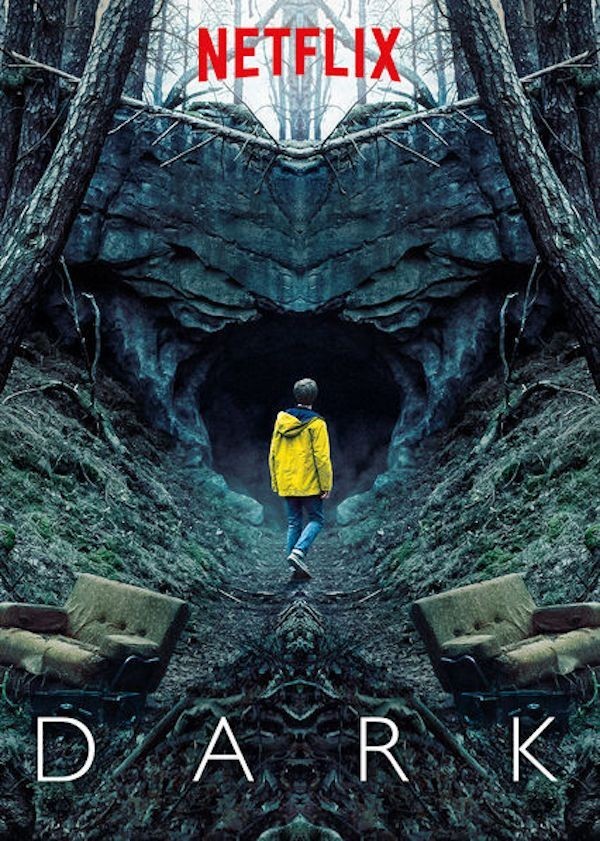
Bild: IMDb.com
Babylon Berlin
Genre: historical crime
Seasons: 3
Episodes: 28
Watch
on
: ARD, Sky Deutschland, Amazon Prime Video (by payment)
This mega-series, based on the books written by Volker Kutscher (“Der nasse Fisch”) is set on the late 20s and early 30s Weimar’s Republic, a time for big social and political changes. During the first and second seasons, the series narrate the story of Gereon Rath, a Cologne police inspector that is transferred to the Berlin department, where he leads an investigation on the growing pornography network, with the background of the social and political changes of those times, nightlife and cabarets. Berlin is shown as a city full of light and liberty, something that starts radically changing with the arrival of the national socialism.
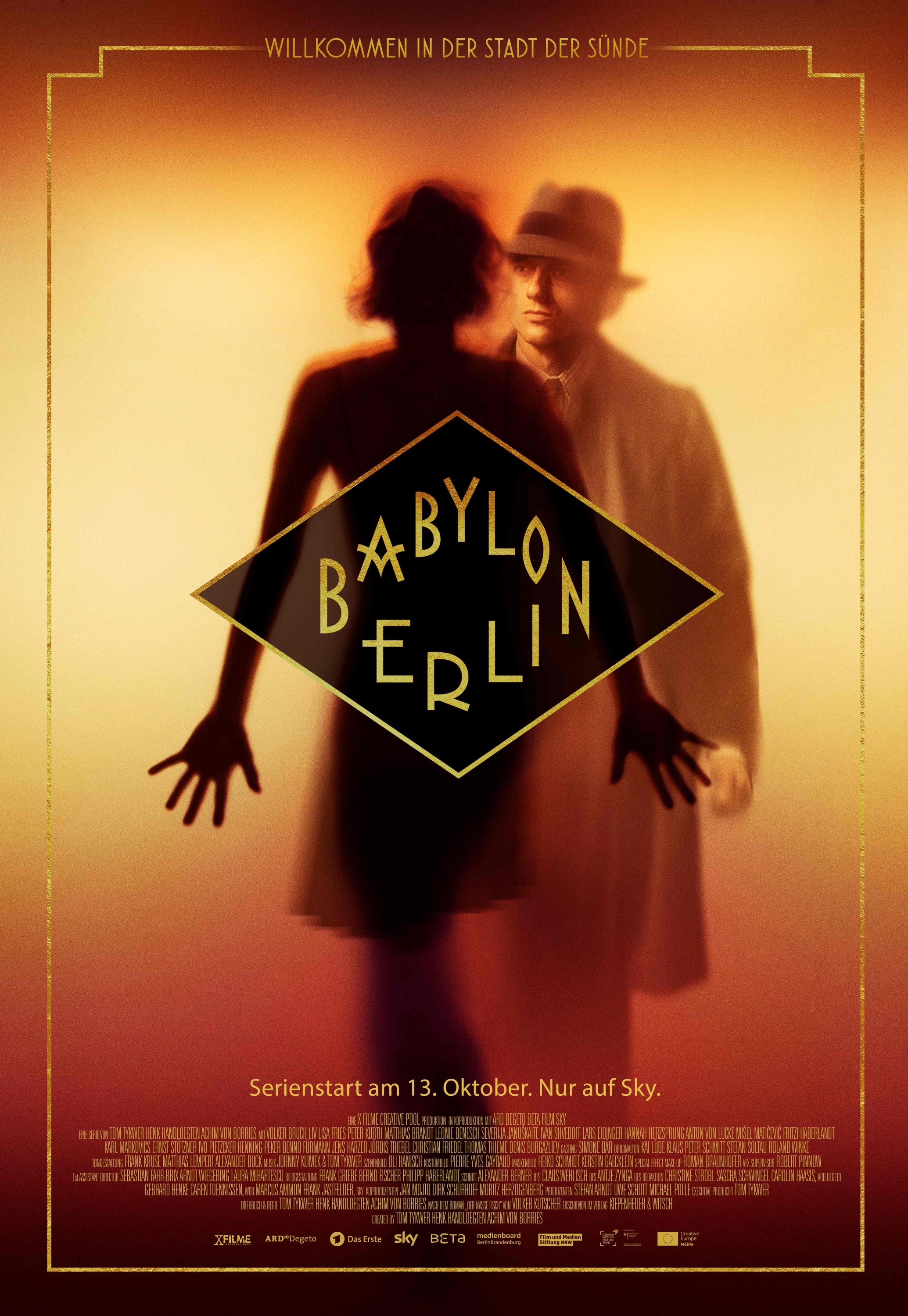
Bild: IMDb.com
Deutschland 83
Genre: Cold war espionage, suspense
Seasons
: 1 (first part of a trilogy)
Episodes: 8
Watch on
: Amazon Prime Video
On this German American trilogy, 24-years-old Jonas Nay is sent from East-Germany into West-Germany, as an undercovered spy for the HVA, the Stasi's foreign intelligence agency. Deutschland 83 is followed by Deutschland 86, set three years after the original series; and there is a last part, Deutschland 89, the year of the fall of the Berlin Wall.
Regarding the German level, Deutschland 83 is spoken in a very clear German. However, there are some scenes where they speak on difficult terms or very fast, so turning on the German subtitles could make the whole process easier for you.

Bild: IMDb.com
Das Leben der Anderen
Genre: drama, thriller
Year: 2006
Duration
: 137 minutes
Watch on: Netflix
In 1983 East-Berlin, secret-police agent Gerd Wiesler conducts surveillance over the well-known writer Georg Dreyman and his girlfriend, actress Christa-Maria Sieland. Wiesler becomes increasingly absorbed by the writer’s life and the world of the art, to which he had been so far from.
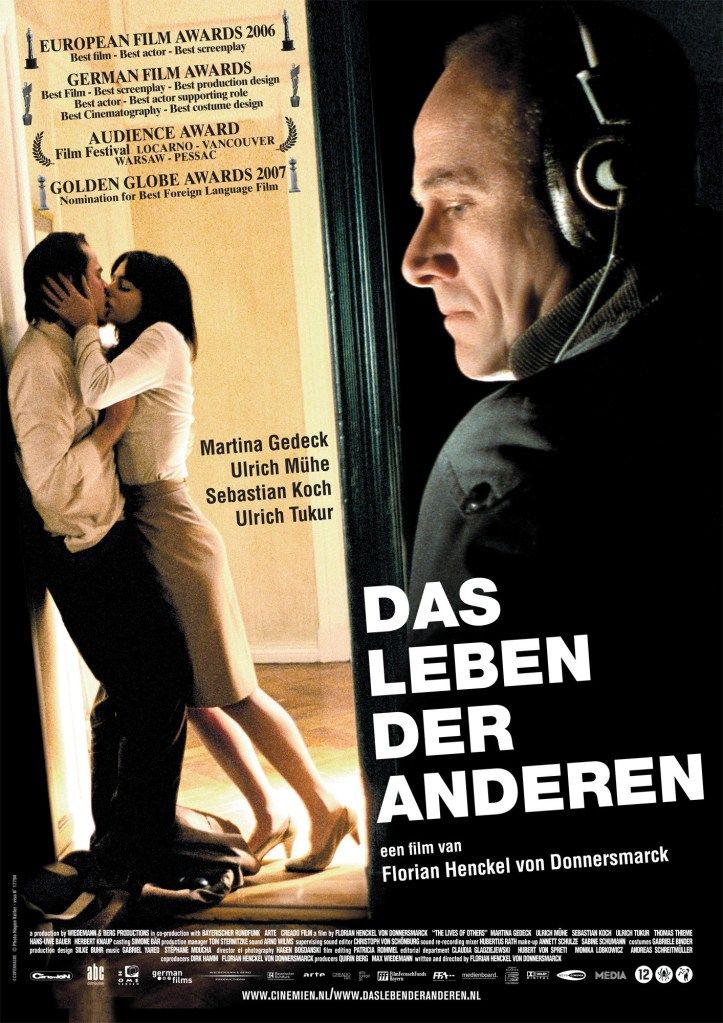
Bild: IMDb.com
Almanya
Genre: comedy
Year: 2011
Duration
: 101 minutes
Watch on: Netflix
After living in Germany for 40 years, the patriarch of a multicultural family announces they are returning to Turkey, their ancestral homeland, to repair a summer house he bought there.
The movie directed Yasemin Şamdereli, a Turkish descendent herself, explores the idea of identity and sense of belonging of the old Turkish work immigrants and their descendants. It had more than 1.5 million viewers and was number 4 when it was released, in 2011.
It is spoken in a very easy and practical german level, great for all learning levels.
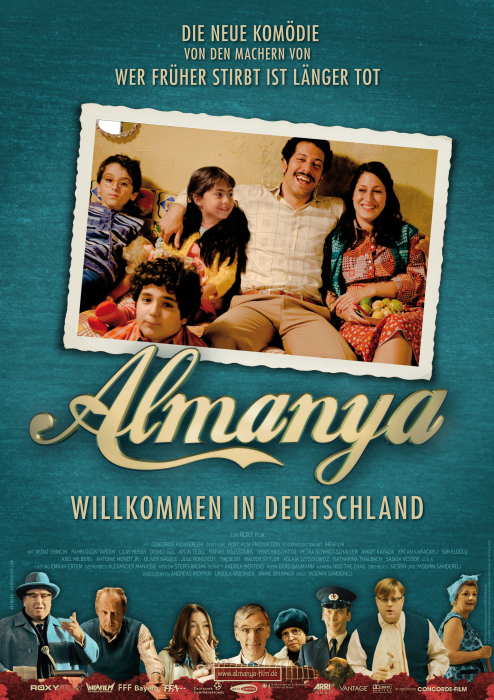
Bild: IMDb.com
Ayelen Toscano Juanes • 02/2021
Best German podcasts for all-levels learners!
Learning German doesn’t have to be difficult! With these podcasts, available in various platforms, you will find that learning Goethe’s language can be as easy as any other.
Beginners
1-Learn german by Podcast.
Great podcast for people already living in Germany! This one doesn’t concentrate on basic worlds, but rather simple conversations.
Available in: iTunes or website
2-Coffee Break German.
This podcast is designed as an easy-to-understand, quick lesson; which will help you advance through different levels.
Especially good for people with little to no time, Coffee Break can be – literally – listened to during your coffee breaks at work/between classes. The shortest ones (6 to 20 minutes) are beginner’s level, and the longest ones,
a bit more advanced. We recommend you listen them from the oldest to the newest podcast, especially if you are a total beginner.
Available in: Spotify
3-Slow German mit Annik Rubens.
If you want to improve your knowledge on specific areas, Slow German from Annik Rubens is a podcast you must listen to.
From topics such as “Food & Drink” to “Sustainability and climate change”, you will surely find one you like.
Available in: Spotify
4-Warum nicht?
I mean, if you here that the Deutsche Welle and Goethe Institute joined forces and developed a podcast for upper-beginners/low-intermediate learners, you know it’s gonna be good.
This podcast, design to help you advance from A0 toB1, will take you along the journey of their fictional journalism student,
Andreas, as you go from one level to the other in the four-part series.
Their podcast can also be complemented with grammar exercises, translations, vocabulary list, among other things.
Basically, a lesson on itself more than a podcast.
Intermediate
1-Wieso nicht?
These series, which are the continuation of the warum nicht? Series is great for more experienced speakers. Once more, we accompany Andreas on his journey and learn new grammar and vocabulary on the way. Link
2-The Easy German.
If you want longer, deeper podcasts, easy German is the one for you.
They are about thirty/ forty minutes long, with very different topics (from philosophical topics to leisure travel and tourism), they could be considered the longer, more advanced, counterpart of the “Slow German” podcast.
Available in: iTunes, webpage
3-A flavour of German.
From the Coffee Break creators, a flavour of German offers that same, relaxed style, but this time focusing on idioms and common phrases. Episodes are 5-8 min long, very practical for people with no time.
Find them in: iTunes or online
4-News in Slow German.
Well, the name says everything. In this podcast you will find current events, talked slowly and at the same time picking on grammar and vocabulary topics to explain them better.
You can find them in iTunes, online or Spotify.
Advanced
1-Elementarfragen.
If what you are looking for is a challenge, you have found it.
This podcast, basically designed for native speakers rather than students in mind, is a very complex podcast which takes about biographies of “exceptional” or important people, such as musicians, doctors… or even bank robbers
and police officers.
Each episode is between one and two hours long, and you can find it in iTunes and Spotify.
2-Deutsch mit Schmidt.
These very interesting podcasts have a total different approach from other ones: while other podcasts concentrate on grammar or wide vocabulary lists, Deutsch mit Schmidt concentrates on only one or two new words per episode, really making
the best use out of them.
Aimed at upper-intermediate and advanced learners, this 8-minutes-podcast is very convenient for advanced learners with little time on their hands.
Available in: Spotify, iTunes or here.
3-The German Podcast.
Aimed at advanced (B2/C1) German learners, this podcast picks one modern-day cultural topic per episode (such as, rock music, tv-shows, video games, etc) which is presented by the host.
You can find it in iTunes and Spotify.
4-Marktplatz.
If your approach is more “professional”, or you would like to quickly learn german for business rather than daily life, we recommend you Deutsche Welle’s Marktplatz podcast.
Is set for a B2 level, and it will help you with business-related terms and topics.
Sources for this article:
https://www.rypeapp.com/blog/these-12-podcasts-will-help-you-master-german-in-no-time
https://www.babbel.com/en/magazine/german-podcasts/
https://www.ef.com/wwen/blog/language/learn-german-free-podcasts/
https://liveworkgermany.com/learn-german-podcasts
Ayelen Toscano Juanes • 23.04.2021
Travelling by train through Europe? Best tips to make your journey a great experience
With the app OMIO you can quickly find out whether the journey is cheapest or fastest by train, bus or plane. We recommend the train of course!
Looking for your next train journey in Europe?
Here are a few ideas:
Glacier Express. Switzerland.
St. Moritz - Zermatt. daily. 290 km. 8h.
On the route: 291 bridges, 91 tunnels, panoramic windows, alpine idyll, forest, waterfalls, mountains.
Bernina Express. Switzerland.
Chur - Tirano. daily. 156 km. 4,5 h.
On the route: 196 bridges, 55 tunnels, panoramic windows, lakes, waterfalls, gorges, one section of the line is a Unesco World Heritage Site: RhB Albula Line.
Brennerbahn. Germany - Austria - Italy.
Munich - Venice. daily. 563 km. 6,5 h.
On the route: There are certainly more beautiful routes to discover the Alps by train, but the route connects 3 countries and the connection is very good. From Bozen there are good and cheap train connections to discover South Tyrol.
Ayelen Toscano Juanes • 11.02.2022
Hiking tour organized by the DAV
The DAV (German Alpine Club), an institution that, as its motto says “loves the mountains, protects the nature”, by organizing different trekking, tours, excursions, alpine hut visits, and many other activities, in nature and climate-friendly
way, is organizing exciting and interesting trekking in the mountains, leaving from Pfarrkirchen, and accessible for all students!
Do you want to know more? Below you will find all the information you need, or you can also get in touch with the contact person listed in their flyer!
For more info about the DAV (In German), please visit: https://www.alpenverein.de/
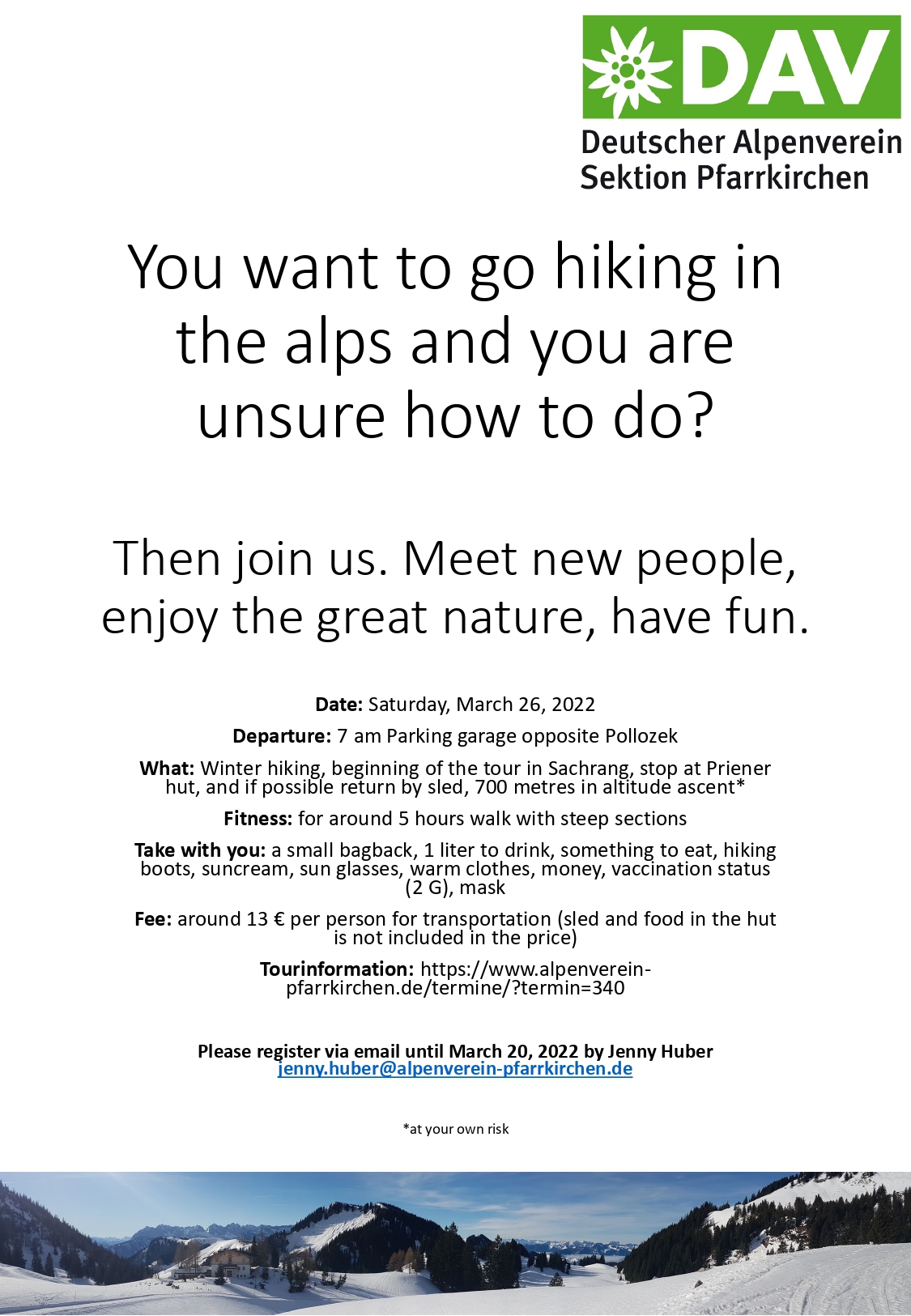
Contact email: jenny.huber@alpenverein-pfarrkirchen.de
Ayelen Toscano Juanes 11.03.2022
Christmas in January?: A tale of Orthodox Christmas told by Maiia
Christmas
is a very special time of the year for everyone who celebrates it. Family
gathering, a lot of cooking and eating, chatting with relatives, and much more.
Although a lot of us celebrate Christmas day on the 25th of
December, opening gifts and eating traditional Christmas cookies, many other
people celebrate it on a different day and with different traditions.
Today we talked with Maiia Osipova, an exchange student at ECRI from one of our
partner universities in Russia, who celebrates Orthodox Christmas, so she could
tell us more about their traditions and celebrations.
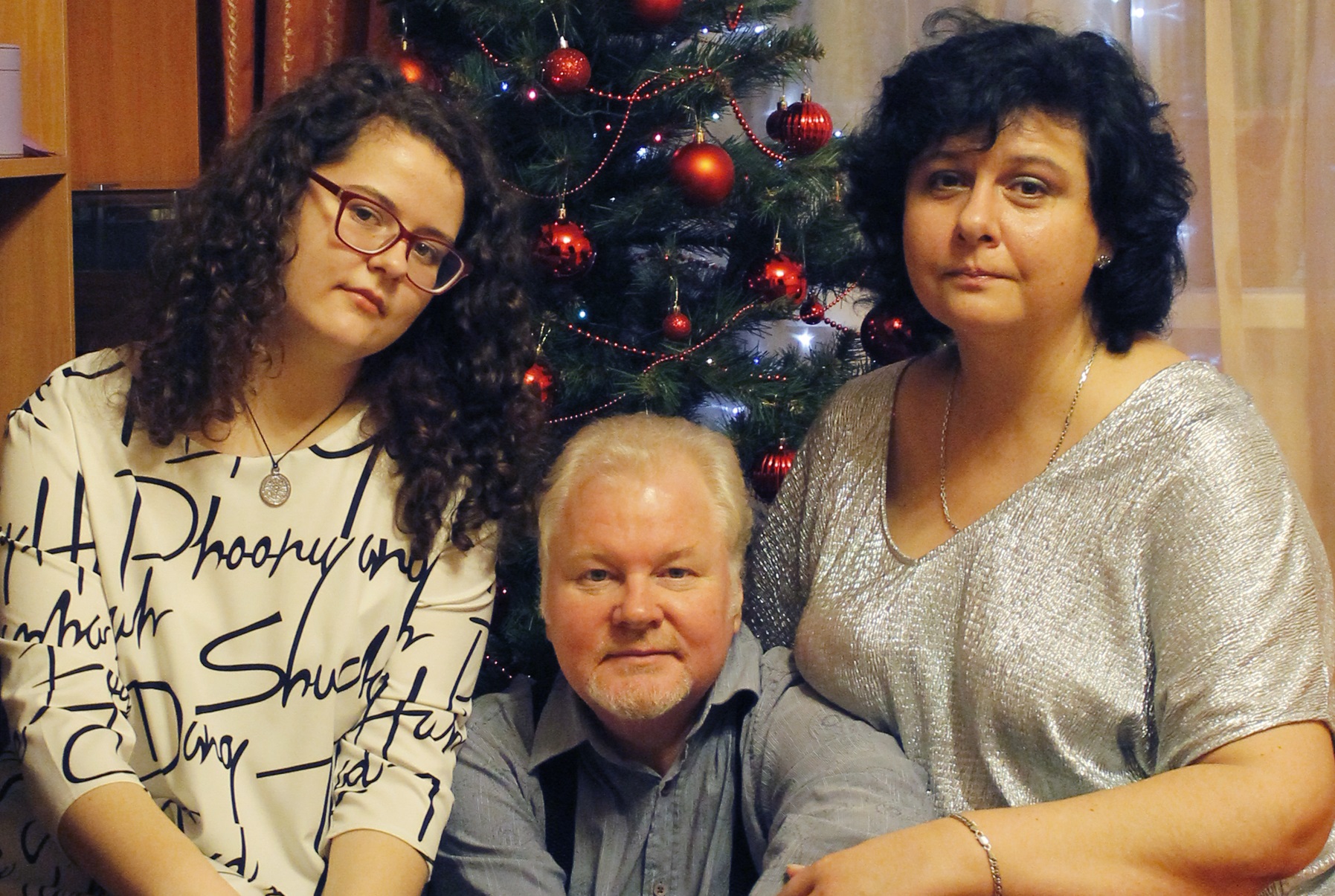
The first thing we asked was, of course, when is Christmas for her!
“Christmas for me is on the 7th of January. In any case, it is
actually the same day, the only thing is that we use the Gregorian calendar,
but for religious things, the Orthodox Christian church uses the Julian
calendar.
And what do you usually do on this day?
So, Christmas is a small intimate thing for us, but the days before Christmas
are not. We celebrate first the new year eve, on the 31st of
December, and that day there is a very big party, gifting presents and much
more.
After that, from the 1st until the 10th of January we
have holidays. Offices, schools, and universities are close. Supermarkets,
restaurants, bars, bowling alleys, and all other entertainment centres are
open.
For the 7th of January, we don´t make such a big thing as they do
here in Germany for Christmas Eve and Christmas Day. For us, Christmas is just
about meeting with family, cooking during that day, dressing up and spending
time with our loved ones.
Do you have any traditional food?
Well, each person has theirs. A very common traditional dish is a kind of pork
meat dish, which is served with the water that is cooked, and it transforms
into a kind of jelly. It is better than it sounds, I swear! My father likes to
cook it sometimes.
And do you have any traditions when it comes to Christmas?
I think that there are some traditions which are still alive in some parts of
Russia, maybe more rural areas like Siberia. But I am from a small city close
to Moscow, and we don´t have many.
I know there used to be two very big traditions that Russians used to
celebrate, even in Moscow.
One was called koledovane in Russian, and it was mainly for young
unmarried men, but also other people participated in it. It consisted of people
gathering themselves and dividing themselves into groups. Each person in the
group had their role, and they were led by one. It was mostly young unmarried
men that participated, but also other people could join.
Then the group would go from house to house, singing songs. They believed this
would help them get food for the next year, and get rid of illnesses.
While the men did this, women normally stayed inside the house. The young
unmarried ones would play games, trying to guess who they would marry. They
would try to sort of “guess their future” using elements, such as looking into
mirrors; or burning a match, which would indicate them into which direction the
future probable husband would be.
It can sound silly nowadays, but in those times being sure that one had enough
food, or who was one going to marry, were very important issues.
The food one was especially important, because Russia is a very big and vast
country, and you can almost feed yourself with everything the earth gives you.
But if they had a bad year, and didn´t have food, it was going to be a very bad
year.
And this was all done on Christmas day?
Yes, always on Christmas day.
What is it that you like the most about this day?
Well… holidays of course! We have all those 10 days off, and I used to love
that as a kid. I didn´t have to go to school, and I could just stay home and
play with my friends.
What was even better, is that my birthday is on the 4th of January,
so I always knew my friends and family would be free those days, and we could
meet and do something fun for my birthday.
But I also like that I could cook with my family, I remember playing snowball
fights and building snowmen in the cold weather.
Yes, I can imagine! And what do you think that this day means to you and your community? What does this day represent?
It´s a
family day. It´s Family. In Russia we don´t go to church so much, I don´t know
anyone who goes to church, so this day is more about family than a religious
thing.
Family is very important.
Ayelen Toscano Juanes • 17.12.2021
How to survive a German winter when you come from the Global South
I come from Argentina, and we don´t know much about Germany in there. Sure, we know the basics, such as what language they speak, where they are and that they like cars and beers, and we know north-European winters are way worse than south American ones, but none of us could have expected how really COLD it was going to be!
So, how does someone who never experienced these harsh winters (or worst, never experienced any winter at all! I feel you, sweet summer child…) survive it? Let´s start.
Ayelen Toscano Juanes • 3.12.2021
University sport, bringing us together!
Healthy body, healthy mind, it goes, and it says, and that is something we take very seriously at ECRI and the THD.
Apart from the usual sports associations around Pfarrkirchen, walking trails, gyms, and different sports parks, the THD offers different alternatives for its students.
University sports in Pfarrkirchen
This semester our university can finally offer some in-person sports again, and we are all so excited about this! From indoor cycle to squash and badminton, you can check all the sport offered in Pfarrkirchen here.Remember that in some cases pre-registration is not required, but the number of participants is limited, and corona rules need to be followed in all cases.
University sports in Deggendorf
Apart from this, this semester the university also has some other sport offers such as indoor football, handball, and yoga, but all of them in Deggendorf. If you happen to have the chance to go there, or you live near the area, this could also be an option for you.Here you can find all information about university sports and the contact person at the university.
Sport in Pfarrkirchen and the region
And if you want to know more about sport and exercise in the city of Pfarrkirchen, don´t forget to read all our old articles on the matter!Autumn is here! Best ideas on what to do during this season (and the last bit of the summer holidays!)
As we approach the end of our recess period, something else has also arrived: Autumn, that great mid-way season that provides activities for both introverts and extroverts: whether is hiking or staying home watching a movie, you can find something to do without being considered “crazy for staying home with this sun” (hello summer, I’m looking at you) or “are you mad? Going out? It´s freezing outside!”.
So today we bring you, our top recommendations on what to do during this new autumn season in Germany – and how to enjoy the best the end of your summer holidays.
1. Visit Germany´s pumpkin patches - or the local market.
If you thought pumpkin patches were only something seen in American movies, you might need to think twice. Pumpkin patches are very common in Germany, especially in Bavaria, during autumn season. Finding one won´t be hard enough!
And until the open, visiting the local weekly market on Fridays, from 9 to 12, in Pfarrkirchen, could provide a great alternative
2. Go for a hike
Autumn is a great season to go hiking, as the climate is not too hot or cold during those months and the foliage provides an incredible and unique picture.
Take this opportunity to discover new places in your city or town, and if you are in Rottal-Inn don´t miss the opportunity to visit our article on the best walking paths in Eggenfelden and Pfarrkirchen.
3. Take a weekend trip with your friends – either by car or the more sustainable trains
Before the chilly winter settles and none of us want to leave our cozy house, going on a weakened trip with your friends during these last months could provide a great last memory of your summer holidays.
If you need ideas and inspirations on where to go, you can check all our articles on day trips around the Rottal-Inn region: Schönau, Bad Birnbach & Passau
4. Organize a wine (or apple juice) and cheese evening meal!
Or pumpkin soup with beer! Autumn provides for all the best opportunities to cook with friends and spend an evening laughing and sharing your summer holidays memories with them!
5. Build a bonfire and do traditional American s´mores
When fire burns memories come alive, some say, and bonfire is a great way to weather with friends and family and share special moments. Grab some blankets and chairs, light a fire (check that you are doing it in a hazard safety area) and get ready to cook some sausages on a stick or prepare some s´mores (check the recipe here).
6. Bake an apple or pumpkin pie
If there would be a number one autumn activity, then baking would be it! Grab all your incredible findings from the weekly market and get ready to bake! Apple pies and pumpkin pies are some of the best things you can bake during this season. Check them!
7. Visit the local thrift market for new cool clothing!
Pfarrkirchen has two small thrift shops, and near PAN you can find some good Flohmarkten (you can check the Passau Flohmarkt) where you can find beautiful used items for this autumn. Cozy sweaters and pullovers, stylish coats, and jackets…everything’s possible if you know where to look!
8. Carve your own pumpkin in expectation of Halloween!
Okay, we know, we know… Halloween is not yet for another month! But practicing your pumpkin carving skills on a rainy afternoon might come in handy!
9. Learn to knit
New season, new hobby? Take this time to learn how to do something new! Knitting, carpentry, baking, cooking, photography… take your pick!
Ayelen Toscano Juanes • 24.09.2021
Eggenfelden: Augmented reality tour for beginners
Continuing with our articles on activities for the summer recess, today we bring you one for those wanting to try something different: an augmented reality tour in Eggenfelden, the first of its kind in Germany!
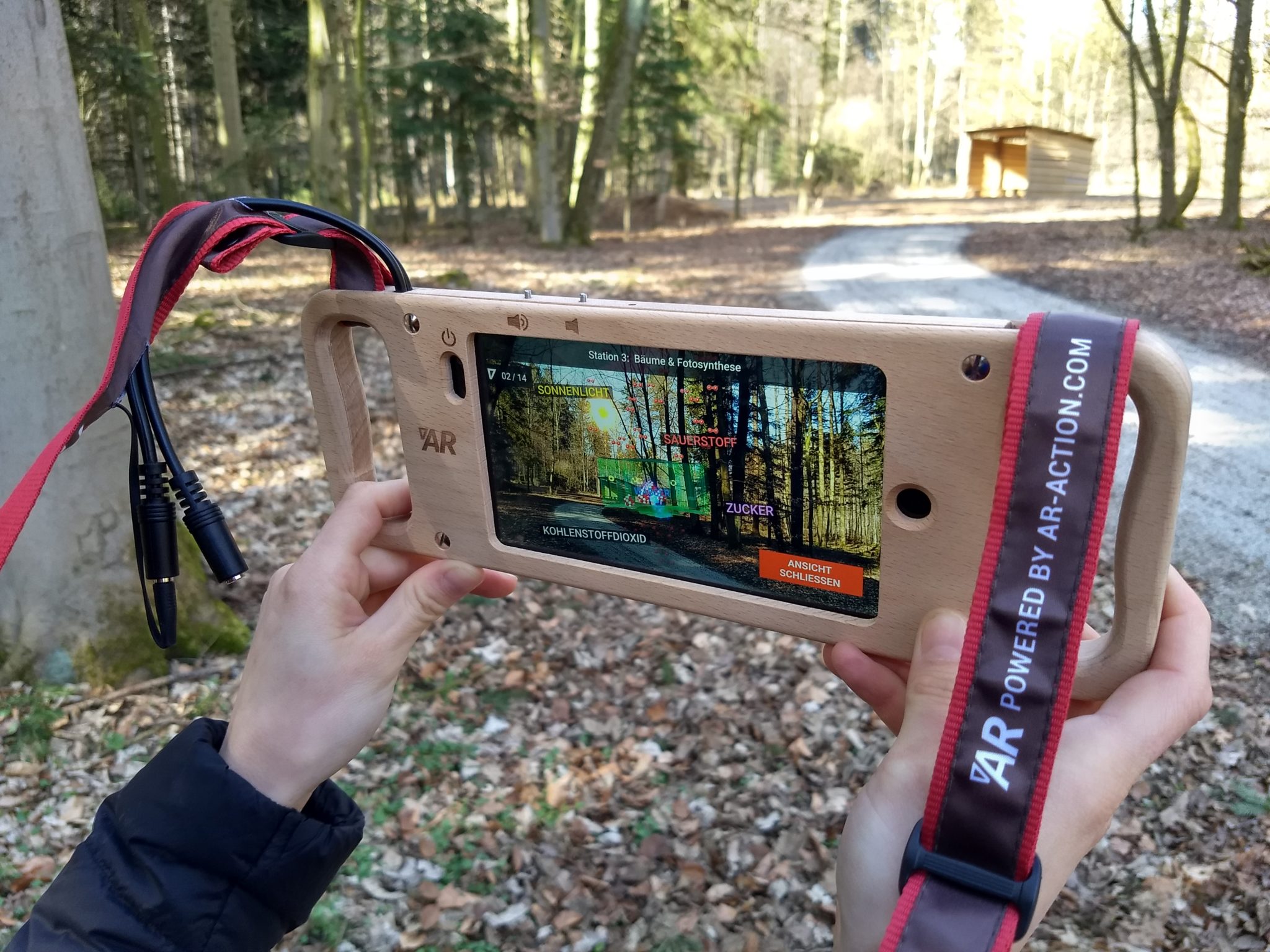
Copyright: Bürgerwald Eggenfelden / Stadt Eggenfelden
This three- hour- tour in the “Bürgerwald” will allow you to explore the forest virtually and physically, at the same time.
The tour is offered every Friday at 14 hs, by meeting with the rest of the people at the main entrance of the Bürgerwald, right on the overview board. There you will meet Artemis, the guide for this tour. But be aware, Artemis is not your regular tour guide: he is a 3D digital interactive fox that will guide you through the site and explain the ecosystem of the place.
The tour takes about 3 hours walking on natural trails and is easy enough for everyone. During these three hours, you will experience the forest like never before, being able to answer all your questions about ecology and sustainability in an interactive, educational and fun way.
This tour is only offered in German, which will provide you with a great opportunity to test your German skills and train them in a different environment before starting classes once again in October!
For this tour you only need to bring your best walking trainers, earplugs and let the experience begin!
For more information you can visit https://buergerwald.eggenfelden.de/ar/ or here.
----
Disclaimer: THD, ECRI, and ECRI News take no responsibility for the content of the external links here provided, not for the Augmented reality tour organized by the Bürgerwald Eggenfelden.
Ayelen Toscano Juanes • 17.09.2021
Best english podcasts
After last week´s successful articles on german learning podcasts, this week we have designed an English-based podcast list, with a range of different topics… From tourism, to business, TV & Film to music… there is a podcast for everyone! And of course, improving our advanced English skills in a fun and easy going way is always a great advantage! .
Talking tourism
This podcast, perfect for tourism students, professionals or just tourism lovers, helps you understand current trends, changes and all the “ins and outs” of the tourism business industry.
Find it online or on Spotify
where you can get a new phone in just a few days.
Ted Talks daily
Who doesn´t already know about the famous “Ted talks”? A brand themselves, now they bring us the latest talks in audio.
From climate change to artificial intelligence and diversity at work; there is a Ted Talk for everybody.
Listen to them on Spotify
Business Wars daily
As any other country, Germany has many different possibilities when it comes to phone contracts and deals. If what you are looking is for an innovative and different podcast to learn about business, then Business Wars is the perfect
podcast for you: Each episode talks about two rival companies, their history and influence – such as Amazon vs Apple. Business wars daily is the shortened version (6 minutes) of the longer “Business Wars”, which are about 30
minutes each. You can find both versions on Spotify: Long version; Short version
The Diversity Gap
“When it comes to diversity, good intentions are only the beginning” so starts the description of this podcast. On it, leaders, authors, creatives, and other influential people, debate on the importance of actions when it comes
to diversity in our society. Very interesting for everybody who is into social change, politics or human rights activism. You can find it here.
The Film Frequency
But maybe what you are looking for is some relaxed, entertaining podcasts. In that case, and if the film & TV industry are your thing, you can´t miss “The Film Frequency”. This podcast covers everything related to the Film
and TV industry, from reviews on the latest tv shows to full debates on classical movies. Find it on Spotify
Sources:
https://player.fm/podcasts/Entertainment
https://www.bluleadz.com/blog/18-of-the-best-business-podcasts-you-should-listen-to-in-2018
https://www.timeout.com/things-to-do/best-podcasts
Ayelen Toscano Juanes • 07.05.2021
App • Google Arts and Culture
I don’t know how you feel, but I would love to see a movie in a cinema or go to a museum without any restrictions. Just like it used to be before corona. Since these activities are not possible at the moment, I stick to the best alternative that is out
there: Google
Arts and Culture.
With Google Arts and Culture you can explore famous sites such as the Palace of Versailles from home, using your smartphone or laptop
This platform offers you a variety of things connected to art and culture, such as artworks, museums, articles about painters or famous pieces, and much more. You can either access it via the website or download the app to always carry your portion of art and culture in your pocket.
Google Arts and Culture has four different categories: games, places, museums and artworks. Each one offers you a broad spectrum of things that are just waiting for you to discover them. The category “Games” comprises
different types of games that are all connected to art and culture. There you will find the Puzzle Party, Visual Crosswords, Art Coloring Books, the “What came first?” and Cultural Crosswords. This is the perfect way to discover
the fun side of art.
With “Places” you can discover over 10.000 famous sites, museums, exhibitions and even stadiums. There you can visit museums using Google Streetview (I would recommend the app for this), but also key sporting locations,
exhibitions that are currently closed or iconic monuments such as the Palace of Versailles or the Taj Mahal. And, you can also take a tour through 10 incredible libraries from around the world or 10 places that inspired your favourite
books and much more.
The category “Museums” takes you inside such sites as the Pergamonmuseum in Berlin and over 2.000 other museums around the globe. That’s the best way to travel the world and discover its art treasures.
In addition to that, the last category “Artworks” lets you take a close look at over 100.000 pieces of artwork. Here you can discover the details you might have missed before. You can zoom into the artwork, or look at the
details of famous pieces and the explanation why these pieces became so famous. You can even zoom into the brushstrokes, which is almost as cool as having a close look at the pieces in a museum.
These are just the main areas
covered by
Google
Arts and Culture. There is much more on this platform and it almost sucks you in as soon as you start your tour there. For me this is the perfect time to spend the weekend in a fun way and still learn a lot about the treasures
out there.
Miriam Bleck • 11/2020
App • MyLife Meditation and Mindfulness App
Sleep better, reduce stress, find relaxation, increase concentration? With the meditation and mindfulness app MyLife (formerly known as Stop, Breathe & Think) this is possible.
MyLife is an award winning meditation and
mindfulness app that helps you find your quiet place.
Try it out:
https://my.life/
Claudia Nikitsin • 11/2020
Film Tip • Interstellar
Interstellar is an epic science fiction movie created by the world-renowned director Christopher Nolan which, according to The Telegraph, has managed to outperform all his previous creations.
Interstellar presents a possible alternative of Earth’s near future, where pollution, global warming and a virus threaten humanity’s existence. These threats are damaging all crops and rendering humanity hopeless in the face
of drought, famine and eventual extinction. Their last hope is traveling through a wormhole placed suspiciously outside of Saturn in order to find some Earth-like planets.
 |
Everyone knows that maybe one of the most important aspect when it comes to movies is the cast. Christopher Nolan had to make sure that he would pick the right actors to play the roles of his main characters. Big names
such as Matthew McConaughey, Anne Hathaway, Jessica Chastain, Casey Affleck and none other than Sir Michael Caine were casted, and managed to perform outstandingly. The 2h 50min long movie tackles some rather complex
questions related to science, morality and the human nature, questions that do not have a straightforward answer, thus making it such a rewatchable movie. The movie was aired on the 7th of November 2014 and managed to earn over $677 million, thus making it the tenth highest-grossing film of 2014. At the 87th Academy Awards, the film won the Academy Award for Best Visual Effects, and was nominated for Best Original Score, Best Sound Mixing, Best Sound Editing and Best Production Design. |
Victor Petcu • 11/2020 |
|
Podcast • Tonspur N
In marketing, the LOHAS (Lifestyle of Health and Sustainability) have already become a own target group. CSR strategies have arrived in the companies, sustainability reports are important means of communication.
The podcast
Tonspur N by Annemarie Harant and Roman Mesicek provides information on sustainable development, corporate social responsibility (CSR) and social entrepreneurship.
What is special about Tonspur N?
The topics range from general knowledge about CSR and sustainability to hot topics, announcements of events and tips for your own everyday life (episode 62: How do we protect our data?).
The podcast is designed as a dialogue. Annemarie Harant and Roman Mesicek are unaffected, honest, entertaining and also self-critical. Their extensive background knowledge even
in some digressions creates a lot of interesting information.
In addition to the 5 series Digitalisation, Consumption, Practice, NPO (Nonprofit Organisation) and SDGs (Sustainable Development Goals), current topics on Corona
or
Responsible Communication are also discussed (episode 42: Kommunikation ist ein Spiegel der Haltung).
Tonspur N - the podcast on sustainable development, corporate social responsibility and social entrepreneurship by Annemarie Harant and Roman Mesicek, is published
every 14 days on Mondays. In each episode they discuss two or three topics, give information on events, book and report reviews and sometimes interview partners can be heard ... unfortunately the podcast is only available in german.
As co-founder of the startup erdbeerwoche, Annemarie Harant faces the daily challenge of implementing sustainable action in her own company. She has more than five years of experience at the management consultancy brainbows in sustainability management with large companies and regularly
puts on the "CSR glasses " in her blog.
Roman Mesicek is head of the Master's programme "Environmental and Sustainability Management " and Sustainability Coordinator at the IMC University of Applied Sciences Krems. He is a shareholder of the business magazine enorm, one of the leading CSR specialists in Austria and co-founder of the Austrian platform CSR Dialogue.
Anna Marquardt • EcoLab • 11/2020
Cyber Monday
With the Cyber Monday the sale in the online shop starts, beside the Black Friday one of the supposed great deals for us consumers! Discounts and special promotions
lure us into the online shops and promise us the best new products and prices. Especially the electronic industry benefits from our often spontaneous purchases in these days.
Do I really need this? We ask ourselves this
question less and less.
But of course, we can't do without electronics either. Today, we would like to give a few tips and information about buying and disposal of electrical appliances.
Every year shops in Europe sell 15 million tonnes of
new electrical appliances. These new devices replace existing ones, so there is a corresponding amount of e-waste in the same period of time.
Around 850,000 tonnes of electrical and electronic waste were collected in Germany
in 2018. 91 % of this comes from private households, the remaining part comes from companies.
But many of these products are not yet scrap and can be used or reprocessed. Used products carry within them the uncertainty of being
in an often unrecognisable condition or soon to be suddenly defective.
Prof Hainthaler has taken the chance and bought a reconditioned smartphone from a certified platform. These devices are not only checked and resold with guarantee but are also between 30 and 70% cheaper than new devices.
In Prof Hainthaler's case, this means not only a €400 saving, a new battery and a 36-month guarantee, but also avoiding 150 g of e-waste.
Markus Hainthaler & Anna Marquardt • 11/2020
Blog articles
Blog article • A practical guide
A practical guide makes life easier.
Here is a practical guide about students you have met or will meet during your student life in Pfarrkirchen and what you can get out of them:
Your friend must be one of those
Hattab Ben-Salah • 11/2020
Blog article • The story of Ha Nguyen
Corona: The global virus has undoubtedly taken its greatest toll on most of the world's citizens. The insecurity brought by this pandemic has proved to be a serious difficulty and challenge for the daily lives of many people.
Amongst those are international students who might find themselves under extreme pressure being far away from home while, at the same time, experiencing a lack of communication.
Read the story of Ha Nguyen, which is about staying healthy and optimistic, both mentally and physically.
Overcome Coronavirus Anxiety Guidance
Ha Nguyen • 12/2020
Pfarrkirchen's "Lange Bank "
Germans often say “Etwas auf die lange Bank schieben“, which is actually a very famous German proverb. If you translate it literally, it means, “To push something on the long bench”. In proper English,
it means to procrastinate or to put something off for a long time. So, the city of Pfarrkirchen definitely showed some humor when they took this proverb literally and created Pfarrkirchen’s “Lange Bank”.
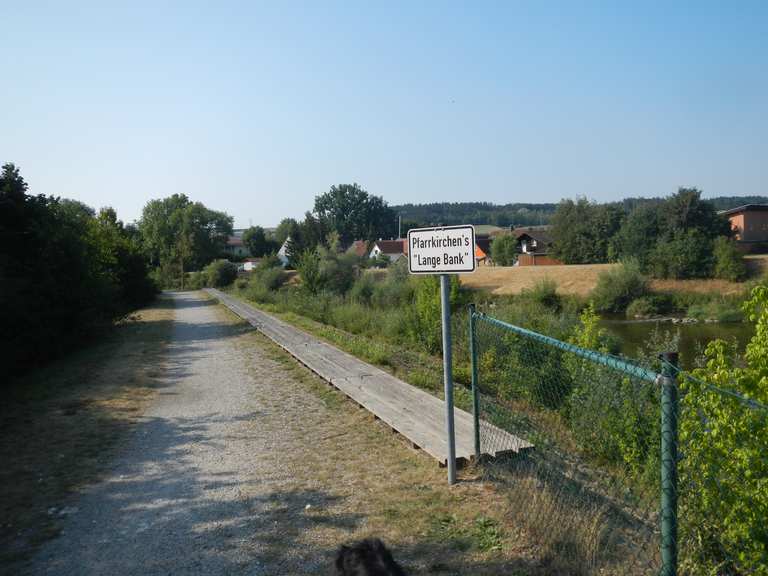
|
It is a very long bench, probably about 10 meters long, that is located at the “Rottauen” along the river Rott that runs through Pfarrkirchen. If you start at the parking lot next to Aldi, walk upriver along the Rott in the direction of the Theatron, and keep walking for like 10 minutes longer, you will reach the longest bench existing in Pfarrkirchen. You will find it along the way, facing the river. This is a really nice spot to just sit, relax, breathe in deeply while the river runs bellow your feet and the sun is shining. For me this place always emits tranquility and makes my spirits go up immediately, which we can all need in these challenging times.
Miriam Bleck • 10/2020 |
|---|
Sport
Best walk paths in Eggenfelden!
So, exams are over, winter holidays are upon us… but you don’t know what to do with your free time?
What about going for a nice walk around one of Rottal-Inn most beautiful cities: Eggenfelden?
If you think having a walk in this cold weather might be complicated, think twice! Walking around with a nice coat and scarf, a coffee or tea in your hand; and then coming back to your warm WG Zimmer or apartment… it
does sound tempting, doesn’t it?
On this occasion, we have prepared three different walking / cycling paths designed for every fit level.
So, let’s get started!
|
Path number one: A walk around Eggenfelden Km: 4 km Difficulty: easy Vertical climb: 30 hm Walking time: 50 min Cycling time: 15 min |
This easy and nice path starts at the “Freibad Eggenfelden” (Swimming pool in Eggenfelden) and goes through a nice round alongside the Mertsee. Then, at approximately the Untereschlbach street (Holzkeller,) you can turn left and start the way back, walking / running along the other side of the Mertsee, with a very nice view of the fields and the river, until you are back at the Straubinger Str. From there, you can continue walking towards Eggenfelden’s center, ending your tour. And finally, why not stopping in one of the small cafes at the historic center an ordering a hot cocoa or a coffee to go, and enjoy it at home? Inspired
by the route provided on: http://www.runmap.net/en/route/216856-ruck-zuck-runde/#/z18/48.4053247,12.751404/terrain |
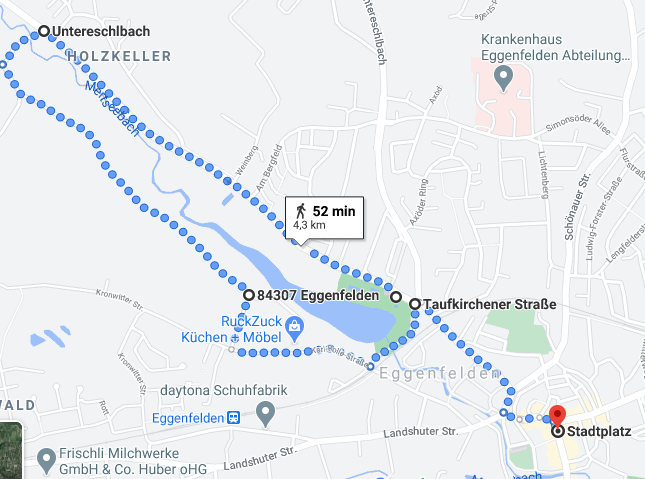 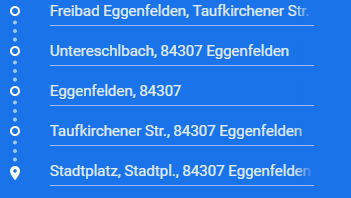
|
|
Path number 2: Get to know Eggenfelden’s whereabouts! Km: 8,2 km Difficulty: easy Vertical climb: 70hm Walking time: 1h 43 min Cycling time: 32 min Suitable for: walking, running, cycling. |
Once again, we can start our walking route from the Eggenfelden Freibad (swimming pool), but this time starting from the other side. Go around the Mertsee, continue on the Karl-Rolle- Strasse, and then alongside the small passage (Weg) behind the lake. We continue on this passage, all until Strasshaeuseln, where we turn right. We go through the little town of Kirchberg, continuing on the Ludwig-Thomas-Strasse, and then start our way back at the Wolfsberg street. We maintain on this street, until we change to the Unterschlbach street. Later we will find ourselves back again at the Eggenfelden Freibad, and we can continue through the Straubinger Street all the way to the center of Eggenfelden. Again, maybe after this much walking you are thirsty, in need of a break… why not stopping for a coffee to go, and then heading back home, to enjoy it? Inspired by the route provided on: http://www.runmap.net/en/route/108961-kirchberg-schwimmbad-drittenbrein/#/z16/48.4076252,12.746222/terrain |
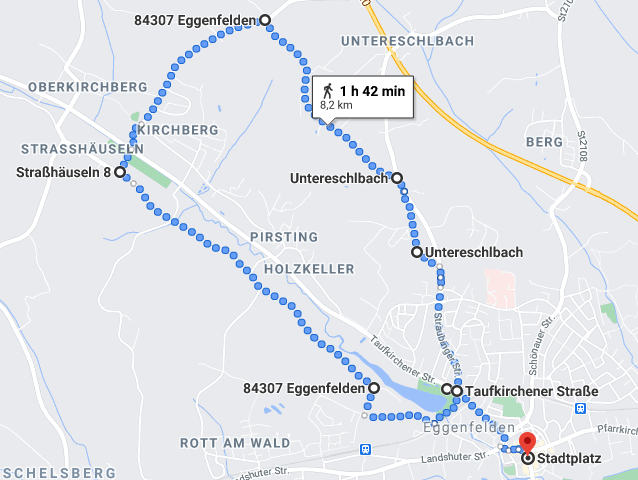 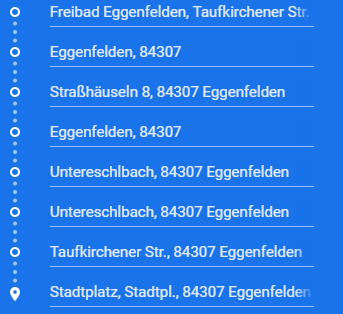 |
|
Path number 3: From Pfarrkirchen to Eggenfelden
(or vice versa) Km: 17 km Difficulty: medium / hard Vertical climbing: 408 mts. Walking time: approx. 3 hs Cycling time: 55 min Suitable for: walking, running, cycling. |
So, finally, our most complex route. Maybe you live in Pfarrkirchen or Eggenfelden…Have you ever thought about a route that connects both towns? Here there is one, which can be done on foot or by bike. It is not difficult, but we do recommend that you take as many stops as necessary. We start on the center of Pfarrkirchen, going towards ECRI Campus. After ECRI, instead of continuing on the main road, we take the small deviation on the right. We keep on that path, and pass through Postmünster center. We continue by surrounding the Rottauensee lake. After that, we proceed on Kirchenweg and Bahnweg, going through the Linden village. We go forward on our journey, passing across the SV Hebersfelden e.V, and across the Rott river once more. On the first corner we turn left, and the again at the “Zur Radlerrast” restaurant. We stay on our way towards Eggenfelden center, and then turn on Gern and Birkenalle street. Finally, we take a turn right on Judengasse street, and we are in the center of Eggenfelden! |
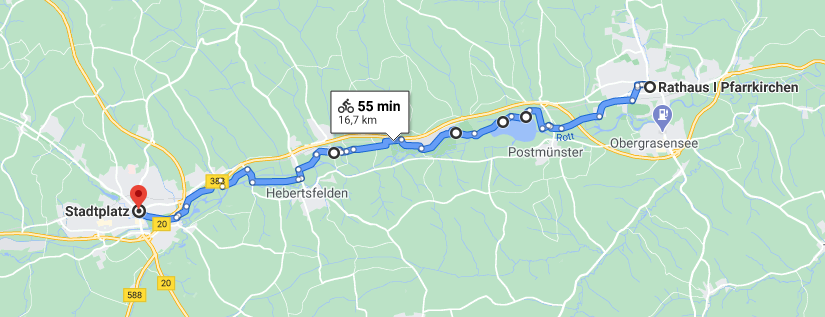
|
Some notes:
To go from Pfarrkirchen to Eggenfelden, you can always take the Regional train at the Pfarrkirchen train station. Trains to Eggenfelden leave every hour, always at half past. It takes 15 min by train, and tickets cost
approx. 4 euros each.
You can always bring your back on the train, for an extra cost.
Remember to wear an FPP2 mask when on the train, bus, or stations.
Remember to always maintain social distance with
people outside your household.
When exercising, especially in winter, remember to drink enough water, wear comfortable shoes for the type of activity you are doing, and wear light but warm equipment. Also, always check the weather forecast before
you leave, and be aware of possible frost on the street (especially when biking)
Most importantly…
HAVE FUN!
Ayelen Toscano Juanes • 02/2021
Take a break from learning for a walk in Pfarrkirchen
Idea for a walk in Pfarrkirchen
The corona
pandemic still has us in its grip. The high number of cases in Rottal-Inn no
longer allows trips to more distant regions. But we can hike wonderfully in and
around Pfarrkirchen. Today I introduce you to hiking trail D.
- Duration: around 2 hour
- Distance: around 7,5 km
- Altitude meters: 99 metres hight
Starting point: Parking lot on “Äußere Simbacher Straße”, very close to the Stadtwerke, in 84347 Pfarrkirchen (see the map at outdooractive).
This tour starts at the Rott, near the Stadtwerke Pfarrkirchen, where the new fitness park is located. On the cycle path along the Rott, we pass the clay pigeon shooting range of Pfarrkirchen and go on in the direction of Netto. Before passing the railway crossing to Netto, we turn right onto the cycle path towards Degernbach.
The hiking trail leads us under the subway to Degernbach. We follow the little river Haberbach and turn left at the end of Degernbach to the main road. We cross the main road. A steep field path leads us back towards Pfarrkirchen, more precisely to Reichenberg. Over the Reichenberg we go through a settlement and a short stretch of forest towards Gartlberg. We pass the new and the old cemetery at the Gartlberg and the Gartlberg pilgrimage church.
The street “Am Paradiesgarten" leads us in the direction of the Landratsamt to the “Ringstraße”. We follow the avenue until we can turn off to “Innere Simbacher Straße”. We cross the railway crossing and are then back on “Äußere Simbacher Straße”, which leads us to the starting point.
Why not hike this tour as a break from learning?
The map and more information to the tour you can find at www.outdooractive.com
Good luck for the exams and stay healthy!
Jennifer Huber • ecolab@th-deg.de • 01/2021
Why not take your bike for a ride today?
You want to
see more from the region you life and study now? Why not explore the region by bike?
At the
website outdooractive.com you can find a lot of nice bike tours in the region
Rottal-Inn.
|
The tour is around 33,4 km and you can start directly in Pfarrkirchen. The smallest of the gothic tours, which leads around Pfarrkirchen, naturally has a lot to offer. The Stadtpfarrkirche St. Simon and Judas Thaddäus in Pfarrkirchen and the old town hall in Pfarrkirchen, St. Benedikt in Postmünster and the Jakobskirche in Rottenstuben, which is beautifully embedded in the landscape, are worth mentioning. And if you do not want drive the whole tour you can split it in two or three smaller tours. |
|
|---|---|
|
|
Jennifer Huber • 11/2020
Feel like running and don’t know where?
Are you more of a competitive track runner or
just a casual fitness runner? Doesn’t really matter since Pfarrkirchen can fulfill both
demands. Uphill of the Gymnasium there is a running track surrounding a
football field which can be accessed whenever you want. Pfarrkirchen benefits from a
couple of small forests which definitely deserve a hike through, but also the
park surrounding the Rott river.
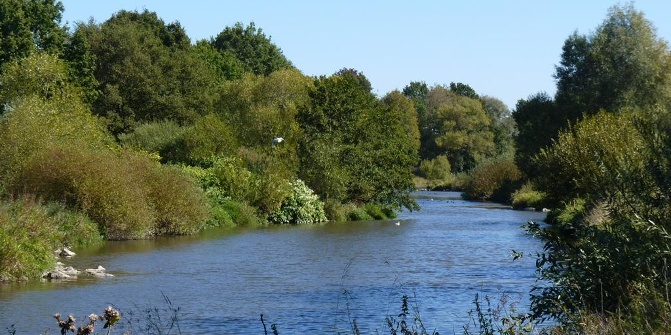
|
The fitness route starts at the swimming pool in Pfarrkirchen, then heads west and circles the Rottauensee, ending right back at the pool. The long route is suitable for sporty Nordic walkers but also for people interested in spending some quiet and relaxing time in nature. The scenery of the tour along the Rott is quite impressive, and the high variety of the terrain throughout the route challenges the abilities of the user. A heart rate measuring station is located on the eastern side of the lake near the dam. The route has a total distance of 10,7 km, but shortcuts can be accessed along the way. The total duration of the track takes around 2 hours and 20 minutes at a Nordic walking pace, but with cycling or running the time is significantly reduced. The elevation of the track is of 27 hm and is exactly equal to the descent since both the starting and ending points are at the Pfarrkirchen Swimming pool. |
|
|---|---|
|
|
Victor Petcu • 10/2020
Climbing in Pfarrkirchen
For those who never considered trying climbing, here are some information about this wonderful sport that engages and exercises the entire body unlike any other sport. If you are interested in building a slim, toned but
strong body perhaps you should seriously think about joining the climbing and bouldering gym in
LaVita Pfarrkirchen
. They offer a cozy climbing gym with a designated bouldering wall that suits the size and the demand of Pfarrkirchen.
Climbing is a rather inexpensive sport, the only required equipment being a snug pair of climbing shoes, chalk, a chalk bag, a harness and a rope. The lifetime of the harness and the rope are especially long and have
to be replaced after years of wear. The shoes and chalk might have to be replaced more often, but nevertheless once or maybe twice a year if you are a hardcore climber.
The climbing gym in Pfarrkirchen includes various routes of different difficulty levels, ranging from easy 5a to difficult 8a. The grading of climbing routes is designed to be pretty intuitive growing in difficulty
from 5 to 8 and also from a to c+. For example, a 6a+ is easier than a 6b, or a 7a is more difficult than a 6c+.
During Corona time and especially now with the lockdown, climbing gyms aren’t always available, so here are some exercises that will keep you in shape and also strengthen your body for when you will be ready to climb
again. The most important part of the body when it comes to climbing is definitely the upper body. That is why the exercises that will be presented bellow will mainly deal with the upper body and a bit with the core.
- Pull ups (enhance your back muscles and depending on the grip also the biceps)
- Push-ups (for chest and triceps muscles)
- Biceps curls
- Triceps dips
- Plank and side plank (for strengthening the core which helps your body positioning during climbing)
Climbing is a sport that requires quite a bit of warm up before each session, due to the fact that the entire body is being engaged in the process. If you neglect warming up before climbing, you risk getting badly injured and having
to recuperate for a couple of months (trust me, from personal experience). Warmups should usually raise your pulse and put your body parts into motion.
- 2-4 sets of 10 push-ups
- 15 bodyweight squats
- 30 sec arm circles
- 20 sec wrist circles
- 7-10 min on-the-wall warm-up (climbing easy boulders)
Victor Petcu • 11/2020
Get to know Pfarrkirchen! Best places to walk, jog or bike around the city!
Summer is coming, and we can feel it in the air. Longer days (thanks, summer time change!) warmer temperature, and a feeling that winter is finally ending.
Although we are still on lockdown due to the ongoing covid-19
pandemic, and therefore social distance, hygiene and contact rules, should be respected at all times, doctors
recommend to leave your house for at least 30 minutes per day, in order to free your mind and work out / do some exercise.
This should not be done if you have flu-like symptoms, or feel exhausted.
One of the advantages of living in a small town like Pfarrkirchen, is that there’s plenty of space and places to exercise freely. Here are some of them:
1- Rott River
If there is one peaceful, beautiful place to go for a quiet job or walk, or even ride your bike (not for a long way) is alongside the Rott river, just behind Aldi supermarket. Some of the features of these area are
rest areas, a side to walk or cycle, beautiful views of the river and an internal amphitheater.
2- Rottauensee lake
Probably one of the most beautiful areas in Rottal-In, this lake (halfway between Postmuenster and Eggenfelden) is great for running, walking or cycling alongside.
It also has great rest areas, which are perfect for a quick stop to drink some water and refuel energy before continuing your way.
During summer, it is common to see barbecues and picnics in its green areas. Again, during these times is better to refrain yourself from those activities as much as possible, and always remember that you are only allowed
to meet one other person from another household.
3- Postmuenster
This small town near Pfarrkirchen offers nice green, rural landscapes to cycle or walk around, specially if you want to avoid larger crowds.
4- Way to Degernbach
Pfarrkirchen, as every town, is divided in areas.
Most of ECRI students and Pfarrkirchen residents live around the city center, Zieglstadl, Gartlberg or Schalldorf areas.
Degernbach and Oberham, in the limits of
Pfarrkirchen, are less known, but equally beautiful and interesting areas: More rural and open fields than in the Pfarrkirchen areas, if you cycle all through the Passauer Str. or along the Bahndamm; you can arrive to this
little town surrounded by nature and green areas.
If you like these options, don’t forget to check our already made tours around Pfarrkirchen and Eggenfelden, in this same section below.
We hope that these ideas will inspire you to get to know the area a bit better!
Ayelen Toscano Juanes • 09.04.2021
University Lifestyle
Start your exam with no stress
The final exams are right around the corner and we know how this period is stressful and hard on many of the students especially being “decisive” for one’s future and career. Because of that, we’ve decided to share some tips that are of extreme benefit and help to maintain a stress-free exam period; but firstly, let’s talk about the causes of the stress in first place:
The text may not include your case as a student, therefore please understand that this is not exclusively the cases that students may be stressed out because of. One can be stressed out because of a completely different cause and it is extremely personal and specific. Some students get stressed out because of their struggle to understand the curriculum or the academic work, the feeling of under-preparedness for the test. Some students even reported that they were being pressured by their families. Also, the most influencing stress-cause is the fact that the exams sometimes affect the students’ personal lives in different ways; for example, losing touch with friends, over-eating or losing one’s appetite, or even in some cases losing motivation to get out of the bed while still being sleep-deprived.
The following tips may help reduce these side-effects of examinations or help students differentiate between the healthy and unhealthy stress during this period of time.
All in all, understand that examinations do not define the person you are, these are metrics set by educational institutions to evaluate the academic performance of students. Yes, without a doubt, exams are important and they decide students’ futures and careers, but nothing is worth spending sleepless nights stressing out on, the period of time will pass and another will come. We wish you the best of luck for this semester’s exams and the following ones, too.
Gasser Mohamed • 01.07.2022
Learning & Studying: effective time management and summarizing skills
Studying and learning alone is never easy, and we are still not back to normal university life and are all trying to find a routine between online, presence and hybrid events.
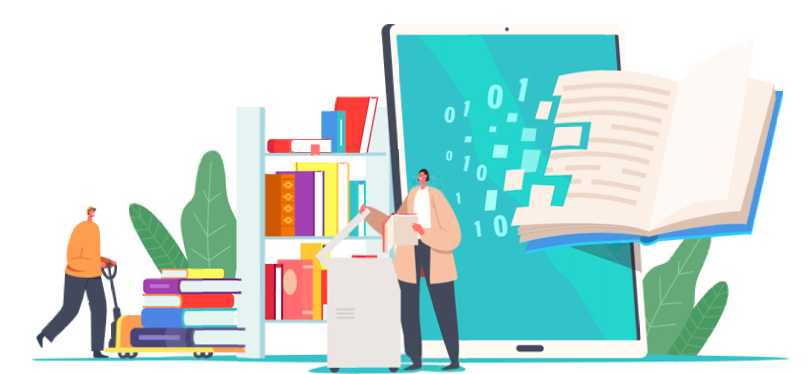
Even with virtual classes and the help from teachers and lecturers, there is a lot of self-management and self-learning to do. From when to study, where, and how to divide our tasks so we can make the most out of them, self-management is an invaluable skill during your studies.
Because of this, we recommend you read StuCoS guide on “online studying during corona crisis”, which we believe you will find extremely useful!
Texts are often the basis for the development of specialised knowledge, questions, etc. It is therefore indispensable to read the text thoroughly. But how do the contents of the text stay in the mind better?
If you want to know more about the topic “effective learning”, don´t forget to read our previous articles, such as how to make the most out of your online learning classes, info on how to access scientific sources and how to prepare and write a research paper, or how to understand the APA style norms and format.
- online studying during corona crisis
- StuCoS • Student Counselling Services • Video • Information (pdf)
- summarizing text with the PQ4R method
Ayelen Toscano Juanes & Claudia Nikitsin • 06.05.2022
On our way to telc
Every international student arriving at ECRI knows there are two very important things to do here: your municipality registration… and learning German.
Learning German (and even better, a bit of Bavarian) is one of the most important aspects towards cultural and social integration in the Rottal-Inn region. Moreover, being able to effectively communicate in German will definitely help you find a good job, advance in your daily life in Germany and meet new and incredible people along the way.
Nevertheless, learning German is not always an easy task. The Languages and Electives Centre and ECRI want to help you with this, and that is the reason why they provide German classes from early to advanced levels.
International students from certain careers also know that learning German is more than just a “great thing to have”, and more of an obligation, as we need to reach the B2 level by the end of our career. Moreover, some bachelor students need to prove this level by presenting an official German certificate that says they have reached this level. If you are not sure if you need to show proof of German language, we recommend you clear this with your study coordinator or course assistant.
For all these students, the word telc is no strange friend. We have talked about it in all our German courses, see how it is structured and even the most advanced German students already look at dates in which they can take the exam.
Here at ECRI NEWS we talked with the German teacher for advanced language levels at the campus, Michaela Stangl, M.Ed., and consulted her about the telc examination.
Ms Stangl was kind enough to lend us her time and expertise on the topic and answer some of our questions.
STRUCTURE, WRITTEN EXAM AND TIME MANAGEMENT
One of the first things Ms Stangl clears out is that telc has a certain structure, which students should get familiar with through regular practice, if they want to pass the exam effectively.
Contrary to other exams, telc has two parts: a written and an oral one. The written part itself is divided into 3 more sections: reading & grammar, listening and writing.
The reading, which is the first thing students have to face, is divided into two sections: the reading section, with 3 different exercises, and the grammar section. Grammar in telc also has a particular format: it is not about writing sentences, but rather finding or completing with the correct word (that’s the reason why this section is called “Sprachbausteine” in German). Two different exercises are presented here, one with a multiple choice and another one with a “fill the correct word” format.
The next part is listening comprehension, which is divided into three more parts. Ms Stangl tells us that in this section it is extremely important to read what is asked specifically and to concentrate on that. Listening records are presented only one time, and students need to be alerted to the specific details of each particular task.
Sometimes the records are about audio sequences of news, or a radio interview.
Remembering what is asked for and reading the corresponding instruction carefully are key factors in this part.
The last part is the writing exercise. Here students have two possibilities, and they have to choose one of those options: asking for information or writing a letter of complaint.
Ms Stangl explains that this is something that can be practiced during classes at ECRI, and that similar tasks as well occur in written language exams at ECRI, so students do have practice over this kind of writing skills.
Here it is important never to forget to use formal language, write the reference and address part correctly according to the present type of letter you are writing.
Some things can be prepared and practiced, while others such as reading the assignment carefully and not to forget anything that is asked must be considered.
It is important to understand that each part has a specific duration, and after time is over the answer sheet for that part needs to be submitted. telc is not only about German skills, but also time management: students should focus on their time management during practice in order to make sure not to run short of time in the actual exam.
SPEAKING EXAM
After the writing part, there is a speaking exam, which as Ms Stangl says students should not be afraid of! Normally, students are frightened of the oral exam part, because this is new for them, they don´t have German speaking examination at ECRI.
Frankly speaking students usually don´t fail this one. If they fail something, it is the written part, not the speaking one.
With that thought in mind, it is important to say what the idea behind the speaking exam is: It´s not just about checking how well someone speaks, but also seeing if someone can have a conversation with another person, if someone can arrange for a meeting or a party or discuss a certain topic with enough efficiency regarding the level. That’s why two or three students are examined at the same time.”
For this part, there is a preparation time as well as an examination time.
In the preparation time, which is around 20 minutes, students are given pieces of paper for taking notes, which they can take with them into the examination room.
According to Ms Stangl there is another crucial detail to mention, “it isn´t permitted to take any prepared papers from home. Every student receives several pieces of paper to take notes, which can be used during the exam, but which must be submitted afterwards”.
STRUCTURE AND SPEAKING EXAM
The speaking part is divided into three parts. The first one, as Ms Stangl tells us, students can prepare it beforehand, which means that students are expected to have researched and created a sort of speech autonomously. It does not mean that they can bring any papers with them to the exam. The speech shouldn´t be learned by heart, but the main aspects should be memorized well, so that it can be presented in an authentic and fluent way.
Students are allowed to choose from several predefined topics, such as the presentation of a book, a movie, a voyage etc.
After the presentation the other participant has to ask some questions about it, which must be answered by the person who held the speech before and vice versa.
Secondly an article must be
This part is about checking if students can have a fluid conversation, get to an agreement with other people, present their ideas, plan an event, discuss a text. So, this part is not a monologue, but a teamwork. The students´ speaking time should be equally distributed between all participants. The planning of the event should be concluded by an agreement of all participants.
RECOMMENDATIONS
When asked about what recommendations she can give students to successfully pass the telc exam, Ms Stangl answers: “The first and very important thing to do is to attend the language courses, to pay attention, to take notes, to be active in class and to do the homework and the exercises provided on iLearn. Nevertheless, a certain preparation beyond the given lessons is necessary to be successful and to pass the telc B2.”
Furthermore, you can improve your language skills by watching movies and TV shows in German with German subtitles, talking as much as possible in German, either with native speakers, who you should ask to correct you, or with friends who have a high German level, listening to German music and podcasts, reading in German, practicing with German books, magazines and so on”.
Important Links
- Recommendation by Michaela Stangl • Here we leave you some links that Ms Stangl has sent to us, so you can prepare your way to telc!
- telc & THD • More about telc examinations at our university
- telc in general • More about telc examinations in general
Ayelen Toscano Juanes • 17.12.2021
Erasmus Programme
Ayelen Toscano Juanes • 25.02.2022
ECRI study resources – coping with stress during the exam period.
We´ve all
been there. Exams are just around the corner, holidays have passed, and now we
find ourselves with the pressure of preparing for those five, six, seven or how-many-exams
you have.
But here at ECRI NEWS we tell you: don´t despair! Stress and anxiety will
only make matters worst, so read our advice about coping with stress, prepare a
cup of your favourite beverage, and get ready to deal with them!
1- First things first: organize yourself.
One of the
main reasons why students go under stress and anxiety during exam periods is because
of ineffective time management and organizational skills. Dividing your tasks,
the best you can, setting realistic deadlines for each of them, starting with
your studies and preparation times well in advance (and not just 48 hs. before
the exam) will help you greatly with not finding yourself in the situation of
having three exams, one after the other, and not having anything ready.
You can check our article about learning
through corona time: effective time management and summarizing skills,
which includes great information and help on how you can plan your tasks ahead
of time and avoid last-time rush and stress during the examination period.
2- Eat and drink adequately
The
connection between healthy eating and effective studying is undeniable, as we
have already mentioned in this past article.
Eating healthy, nutritious, homemade food will increase your concentration, allowing
you to study better for longer periods of time. We know, it´s not easy to eat
correctly when we don´t have time for this, but here is where the previous
point comes in handy: organize cooking and meal prep time in your time
management calendar, so you don´t have to end up reheating frozen pizza- again.
Moreover, there are tons of Instagram accounts and internet blogs about quick
and healthy recipes. Here we leave you some of our favourites:
- StudentEats, a webpage with tons of different ideas according to your diet, time, and skill level.
- BBC
GoodFood, with 34 healthy, student-oriented recipes for all skill levels.
- Jamie
Oliver´s “14 recipes every student should know”, because… do we need to add
anything else?
- ECRI NEWS • Food & Gastro
3- Practice mindfulness
When
everything turns to be too much, breathing can be the best option. Reserving
some minutes in your day to practice mindfulness and conscious breathing can
help you relax before your study sessions and start your day differently.
Meditation apps and tools students can use:
- THD students have a one-year free subscription to the 7mind mediation app (check their exam anxiety exercises!) in German language.
- Balance, meditation and mindfulness app, is currently giving one-year free subscriptions.
- Online mediation and mindfulness videos, which can be found for free on Youtube
- Netflix´s Headspace: 20
minutes animated videos which look inside the benefits of mediation, while also
offering techniques to start your practice.
4- Study somewhere you like
Studying
somewhere you are comfortable and feels like “your space” is an important
aspect when trying to avoid exam stress and anxiety.
Being somewhere you feel you fit, that doesn´t make you tired and is
comfortable in every sense of the word will help you concentrate better and
feel better when studying.
Here it is also important to have everything you need in this space, and (if
possible) to not use this space for other things, such as sleeping.
If this space can be free of unnecessary distractions, that would be a plus.
… but also study on an environment that is the best for you
For some people,
total quietness and calmness is the best way they concentrate and study
effectively. For others, a bit of ambient music or noise is necessary.
Some people prefer pastel colours and decorated walls, while others go for more
sober areas. Giving this space you will be spending a lot of time in your
personal touch will make you want to be there, instead of just being done with
it as soon as possible.
5- Ask for help.
There is
the common pride in wanting to archive everything by ourselves. But in life, we
never accomplish anything truly alone: we always need cooperation and help from
others.
Organize study groups, ask someone to help you study, attend your professors
and lecturers’ consultation hours. If you need help or have a question, do not
hesitate in contacting them.
If your anxiety and stress reach high levels and are affecting your life, do
not hesitate in going to your GP for help, or consulting and relying on our
faculty´s counselling systems, such as StuCoS.
Summary:
Relax, manage your time, and ask for help. These
are the three main aspects that will help you through this time.
Know that you always have options, prioritize what needs to be prioritized, and
most importantly: have fun learning new things, take this time not as an obligation,
but as a chance to show everything you learned during this semester.
Sources:
https://www.ucl.ac.uk/news/2017/apr/7-tips-help-you-cope-exam-stress
Ayelen Toscano Juanes • 14.01.2022
What do you have in mind when you think of ECRI?
In 80 Nations around the World
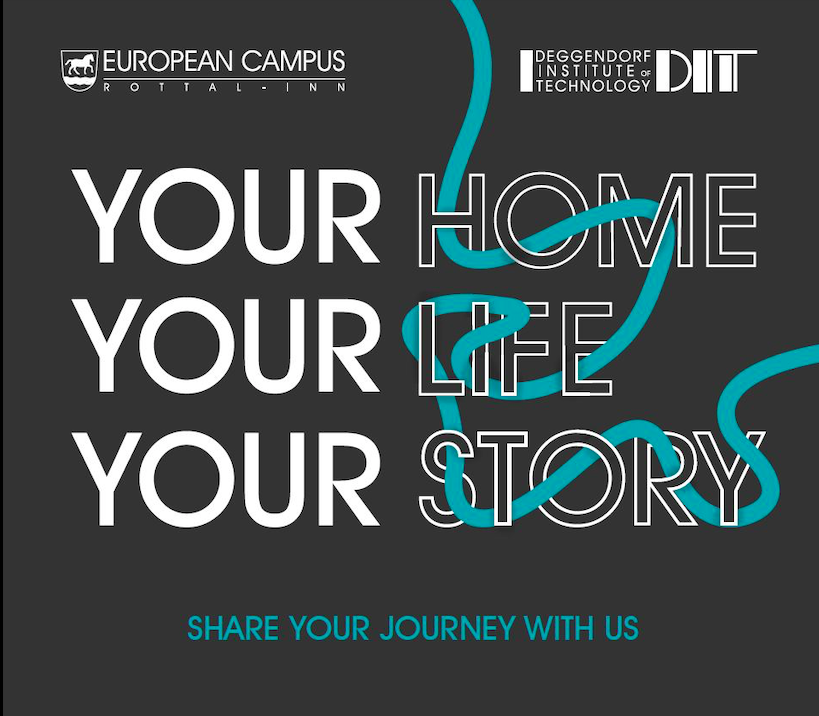 The project "In 80 Nations around the
World" tries to show the world what makes our European Campus Rottal-Inn (ECRI) so special and to highlight the people of our international campus family.
The project "In 80 Nations around the
World" tries to show the world what makes our European Campus Rottal-Inn (ECRI) so special and to highlight the people of our international campus family.
With this project, we would like to show everyone what it means to be a part of ECRI, how many different cultures come together here and who the people of ECRI are. To do this, the project features one person from each nation that studies or works here at the ECRI. The spokesperson from each nation will be portrayed in a short video clip and a professional picture.
But what are faces without the story that shaped them? Not much.
As the first step, we ask all people interested in participating to fill out a survey. We will then choose a person from each nation to participate in a photo and video shoot to represent their country.
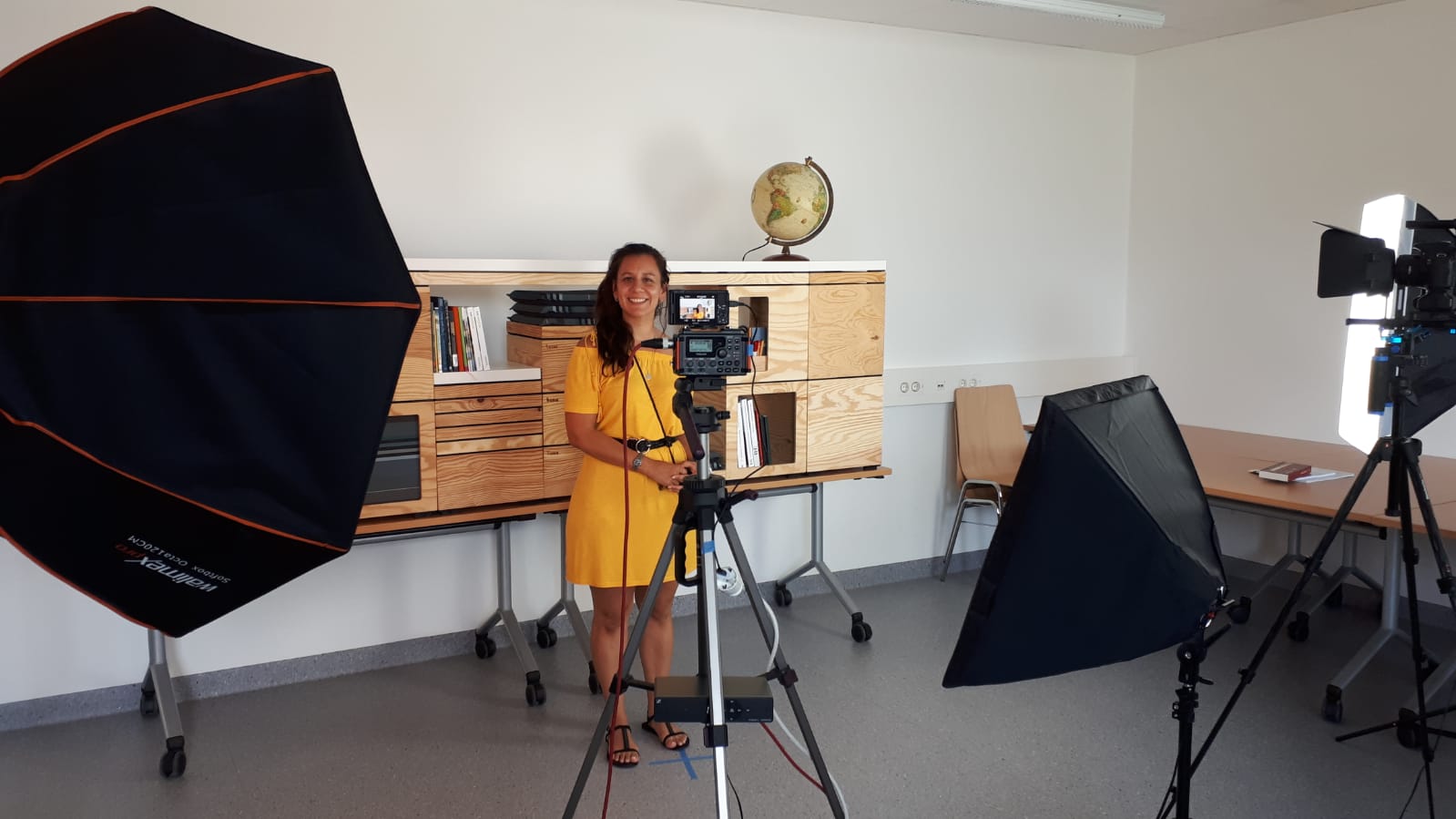
After that, we will publish a short-written profile of each participant together with the video and the picture on our various DIT-channels to show the faces and people of ECRI to the world.
The aim of the project is to highlight that no matter where we are from and what nationality we have, we are all people who have the same basic needs and who are all studying and/or working here at the international ECRI campus because we all believe in the power of education and international understanding.
Are you interested? Do you want to participate? Great!
Then we will ask you to start with the first step, filling out the "In 80 Nations around the World" survey. With your answers, you can help us fill the project´s framework with life, and the survey helps us understand you and your story better.
ECRI Values
At our time at ECRI, we learn many things.
We learn about tourism, engineering, health, or sustainability, depending on which study course we are at. We learn about a new country, a new town and its traditions. We learn to relate with people from different cultural backgrounds to ours, learning how to work together successfully and efficiently.
ECRI (and DIT) prides itself in this and believes it´s all of us, with our personal and cultural backgrounds, that makes ECRI the great faculty that it is: diverse, open, innovative, sustainable. Together, we make our campus a better place.
When we move to a new country, it is very important to remind who we are and where we come from; but it is equally important to learn to live with differences and different contexts. What makes “ECRI” Ecri? What makes “us” us? What values do we share? What ideals do we want to bring back with us when we go home? How has ECRI changed you?
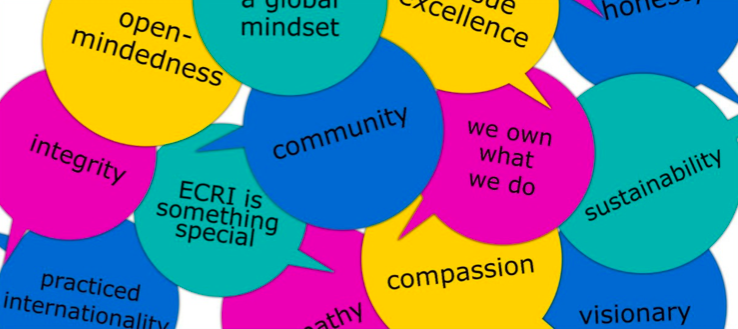
All of this and more is a question that we are asking ourselves, and because we believe your voice matters, your opinion matters, we invite you to share them with us.
You can participate in this incredibly exciting project, the ECRI Values project, which aims at discovering what makes us as an institution, as an organization, different. What distinguishes us from other faculties, from other universities. What values do we share?
Participating is easy: you just need to answer the questions on this survey, which will take you approximately 10 minutes but will help us get started on this path.
Let´s create our journey together.
Participating in both projects is easy, click here for the surveys, one will take about 10 minutes:
In 80 Nations around the World
ECRI Values
Healthy eating, effective learning: the (undeniable) connection between nutrition and learning abilities.
That we are what we eat is no new news. As animals, eating is essential for our bodies, incorporating fuel that will get us through the day. As humans, eating is more than just a mere body function, but also a social activity in which our culture and the way we relate to one another is shown. Eating is also an enjoyable and pleasurable activity, and sometimes one of the most awaited times of the day for some people
If we want to learn correctly, if we want to concentrate, we need to eat well. But what is “eating well”? If eating is related to our culture, then there are as many possibilities as there are different perspectives! So many options!
So, today we want to share with you some tricks, so you try to improve your eating habits and excel at your academic courses while enjoying the most out of your foods!
1. Eat all the three big macro groups
Carbs, proteins,
and fats are the three macronutrients. Depending on what you want for your
specific daily needs, you might need to eat more of one group or the other but
abandoning one group altogether can be very damaging for your body.
Try to find a balance and detect how much your body needs from each macronutrient
group.
Of all these three groups, protein is the one that will help you stay full the longest, carbs will give you an immediate boost in your energy levels, and fats will help your body with fatty acids, something the body cannot create itself and helps the body absorb vitamin A, D and E.
2. See how you divide your plate
Incorporating
all macro groups in your daily eating habits is just the beginning. If you want
to eat healthy, you need to balance
your plate and check that you are also eating enough fruits and vegetables
for all necessary micronutrients and vitamins. Of your total plate, make ½ of
it with a variety of fruits and vegetables, leaving ¼ for whole-grain carbs
such as 100% whole grain bread, pasta, brown rice, quinoa, among others. The other
¼ of your plate should be a protein-rich food, such as tofu, eggs, beans,
lentils, edamame, poultry, fish, cheese, among others. Don´t forget to incorporate
healthy fats, such as olive or avocado oil, or plant kinds of butter, such as peanut butter,
to give flavour and add the necessary fats to your diet.
Try to eat at least 5 portions of fruits and vegetables per day, to create a balanced and nutrient-rich diet. It is also important in every diet (but so more in vegan or vegetarian ones) to incorporate nuts and seeds.
3. Lower the amount of processed foods
Let´s be
clear here: no food should be prohibited. All foods, especially those you like
the most, should be incorporated into your diet in an adequate and controlled amount
according to what they provide so that you don´t end up eating all of them together
and then regretting it. Food should be enjoyed, not regretted.
So, what do we refer to lowering the number of processed foods? Well, just not eating them every day, all together in one sitting, and lowering them from your diet.
Remember: you can eat any food later that week, or next week. There´s no need for you to finish the plate or the package, you can save the rest for later.
4. Learn to read your body
The amount
of food everybody needs is different according to each person. This can vary
according to age, gender, activity level, metabolism type, etc. The best way to know how
much you should eat is by learning to read your own body and the signs it gives
to you, and what is called your “hunger signals”. This is trying to read
your body to notice when you are full, so you won´t end up hungry and eat again
after one hour; but also, you won´t end up so full you can´t get up from the
chair.
Learning to read your body signals will also help you if you just have a one-hour lunch break, so you don´t end up in a state that your body needs to make such big digestion that you are too tired to continue working or studying.
5. Mind what you drink
If eating
is one of the most basic and important functions for the human body, so is
drinking, which is actually even more important than eating. Humans are made of
approximately 70% water, and drinking enough water is essential for everything
we do, and we need to be careful with this too.
How much water you need will change according to your needs, physical activity, gender and nationality. Nevertheless, it is said that an adult human needs approximately 8 glasses of water per day. There is water in foods, so you don´t exactly need to drink it all, you can also “eat” your water (and here, water-rich foods such as watermelon, melon, cucumber, etc; can help you greatly if you are that type of person who forgets to drink enough water during the day.
Remember: the key here is that most of your liquids come from water, and not from other liquids such as sugary sodas, bottled juice or alcohol. Alcohol, even worst, retains liquids, so you want to be careful with this.
Summary: How do I know if I am having a balanced, healthy diet?
Although all these tips might help you, in the end, the only person who knows your body is… well, yourself!
If you feel
healthy, if you feel you can concentrate for long terms, you don´t have
headaches or stomach aches, and you don´t get excessively tired after simple
motions, then it´s fair to say you are probably maintaining a healthy diet for
your body and needs.
Nevertheless, if you are not sure you are eating healthy, or if you don´t know
how to face this process, then a consult with your GP will never hurt.
Extra
sources used for this article:
https://uwaterloo.ca/campus-wellness/nutrition-articles/guide-healthy-eating
https://www.nhs.uk/live-well/eat-well/eight-tips-for-healthy-eating/
Ayelen Toscano Juanes • 29.10.2021
Awake your inner entrepreneur with the THD Startup Campus
THD encourages everyone to find their passion in life. And for some, that is creating their own companies and being self-employed! The good news is there is an institute inside the university, the THD Startup Campus, that can help you in every step of your way towards creating your company and contributing to our society. From planning stages, where participants define their ideas, do market research, and create their business plan, to finding financing opportunities, and preparing the launch, Startup Campus will be there for you.
We talked to Tanya Marin, entrepreneurship manager, about what Startup Campus is, their role in helping national and international students start their own businesses, regulations, visas, and much more.
So, Tanya, how would you describe Startup Campus? What do you do, what is your role?
Startup Campus is a THD institute that offers students, staff and alumni support in developing their business ideas. We help everyone, from every study programme and faculty – as long as they have ties to the university.
Lots of different people come to Startup Campus and depending on where in the startup process they are and what they need to actually and officially start the business. My team and I help them gain more focus and connect them with the know-how and people they’re going to need. In a nutshell, there are three main routes how people make their way to us: Most often, someone comes to us with an idea from a simple “thought” and we look to help that become a viable business. The second route is when academic or research developments signal a value that could benefit not only scientific advancement but also society and the economy at large, if you will.; The third route is for those who have this “entrepreneurial spirit”, the will to start a business and make it flourish but can’t exactly pinpoint what their business idea should be. We help them find ideas or connect them with another person or team that might already have a fantastic idea but needs help to develop it. A startup needs the right team to make it work and we’re thrilled if we can help people and teams find the right fit! That said, we are still at the early stages of streamlining routes two and three.
You mention that there are people with an incredible entrepreneurial spirit, but with no concrete ideas, how do you help?
There are many new formats which we are developing to help them come with the ideas by themselves. We might show them what new trends are out there, ask them about their skills and interests, among other things. We are constantly improving our resources, so we can help them find their own passions and lead them on the way to their startup. We can always guide and provide resources, but ultimately it has to come from their side. But as I mentioned before, we often have startup teams looking for new teammates!
And in which steps does Startup Campus specifically help?
We accompany students throughout their path to starting their business. But it is also important to mention that a lot of this is hard work from the participant´s side: we will always guide, recommend, and connect but the ones who have to make the decisions and do the hard work are the entrepreneurs themselves. The business is theirs and this is something they are building for their lives.
What types of financing opportunities does Startup Campus offer, or can help participants acquire?
So, our main two funding opportunities are Kickstart Incubator and EXIST. With Kickstart, we decide which ideas we can help fund – however we are bound by certain rules. EXIST is a federal grant directed at graduates and students at German universities and research institutes. For this path, more rules apply.
If Kickstart or EXIST isn’t an option, then we help in other ways. For example, by helping with infrastructure or using our network in the area, mainly in Lower Bavaria. As the THD is located here one of our goals is also to help develop the region. We have so much knowledge and potential at THD, in all our institutes and faculties, which could be used to help our region grow.
We know that when you are an International Student, there are some conditions to starting your own company. How can Startup Campus help international students?
Yes, exactly. For EU Students, the same rules apply as for German nationals: they can start their own business in Germany, no need to ask for authorization from the foreign authority but they should always consider that startups can be very time-consuming. If they have student health insurance, they are not allowed to work more than 20hrs per week otherwise the AOK or Techniker or what have you, will no longer categorise them as students and they will have to pay much higher monthly rates. There are also some other formalities and things to consider before launching a business, so even if they feel confident that everything is going to go smoothly, it really doesn’t hurt to double check with us – it doesn’t cost a thing and we’re also happy to help connect them with people that might be able to provide a springboard for their business.
When we are talking about international students, so non-EU students, they absolutely must get permission from the foreign authority. This could be tricky, so we highly recommend that they speak with us to help get prepared. The actual permission is only necessary once they’re ready to officially launch the business (or, for example, if working as a freelancer) , everything that is in the “planning” part, such as market research or writing the business plan, can be done that in their own time, at their pace, and there´s no need to ask for extra permission or authorizations. Normally these steps are done while during their studies, so of course, time management is important, especially when it comes to academic compromises.
When an international student graduates, they have 18 months to find adequate employment. During this time there are generally no restrictions as to what kind of employment they pursue. After the 18 months, they can apply for an extension if they meet certain criteria. A sustainable, growing business can also meet that criteria and be the basis for obtaining an extension of the visa and maybe ultimately permanent residency.
For this, of course, they need to show certain paperwork and go through certain steps, and here is where we can help them. Of course, nothing is guaranteed, as the foreign authority has the last word, but we can help increase the chances of receiving a “yes” for an answer. And even if the answer is “No”, I would always recommend our international entrepreneurs to apply again! Because that No could change to a Yes given other circumstances.
That´s a very good recommendation. And if a master student, for example, wants to get a business up and running while they are still studying can they create their own companies during this time?
Again, the foreign authority will have the last word here. Theoretically yes, as long as our international entrepreneurs can make clear that their studies will still come first.
Here, as we are talking about very specific aspects, every case must be seen individually. Startup Campus can help prepare them for their meeting with the foreign authority as well.
And of course, the foreign authority has the last word
Yes, absolutely. It always comes down to if they authorize it or not. But as I said before, we can guide participants through all this process, increase their chances. And if the answer is a no, hey… we’ll figure out another strategy and try again!
Is there any last advice or recommendations you have for international students?
Just try. Come, bring your ideas. That´s all you need to start. There is no dream too big or too small. And if you don´t have a “breakthrough idea” but you have the will, come and consult us.
More information, contact details and short introduction videos can be found on the Startup Campus website.
Ayelen Toscano Juanes • 30.07.2021
Best literature books to learn german!
Some people prefer to learn German by watching movies or tv shows, but for others, books and reading materials are the best tools.
If you belong to this second group, here we leave you a list of amazing books written originally in German and/or by German-native authors, to practice and better your skills.
Some of them are learning literature books (normal stories adapted by certain publishers so beginner students can understand them easily), but the most advanced ones are simple reading recommendations.
Some of these books have been recommended to us by our German students here on campus, other by international students that read them as part of their learning path; and other just recommendations from various sites (references below!)
We certainly hope you find one that suits you!
For total beginners - Der Grüffelo.
A total child´s classic story, this book is simple to read and understand as it is aimed for small kids. There is a short movie about it, and tons of versions.
If you want to learn some German vocabulary quickly and easily, children´s books are the ones to go for.
This one particularly can be bought at any bookstores for quite a cheap price.
Author´s note: I first came to Germany as an Au Pair (nanny) and my German skills were below 0. Working with small children, I had to quickly learn some important words, and reading fairy tales and children´s books helped me a lot.
For basic beginners – Short Stories for German beginners.
If sitting through textbooks and intensive grammar rules is not your way of learning, maybe trying a different approach would help you.
If that is the best way of learning for you - well, complementing it doesn´t damage anybody!
This book, specially designed for beginner learners, is composed by eight new and unconventional stories, perfect for level A2-B1. Verbs and other important grammar structures are highlighted, and at the end of every chapter (story) you will find a list of all new vocabulary (words and phrases) learned, and even one or two exercises to make sure you understood everything perfectly. Just as a textbook activity, but in a fun and relaxed way.
You can find it in most bookstores or online, for just 10 euros (cheaper if you buy the audiobook or Kindle edition). Amazon buyers have it a punctation of 4.6/5, so why not try it?
For intermediate - Die Verwandlung (the metamorphosis).
Who hasn´t read this Kafka´s classic in high school?
Re-reading books you already know in a new language can be very beneficial, mostly because you already know the context and what it is about, which will make it easier to understand it; letting you concentrate in all the new vocabulary and grammar.
Kafka’s book is great for this task: a classic book, many of us have already read it. Also, the book is written in short, concise sentences, making it easier for intermediate learners.
You can find it in a paperback version for as cheap as four euros, or hardback for around 14 euros (online prices). Libraries (such as the PAN or DEG library, not ECRI one) will most surely have it and you can borrow it for free, if
buying it is not an option.
For more advanced learners - New German Thriller books.
If you are already a proficiency level German learner, B2/C1 level, then there´s a word of opportunities for you.
Depending on what type of books you prefer (novels, romance, thrillers, etc) some of our German native speakers have recommended us a couple of options.
If you are into thriller, exciting books, you might want to look into the work of German author Sebastian Fitzek.
Some of his books, including Passagier 23 (passenger 23) have been adapted for the big screen. Other best seller´s from this author include Das Joshua Profil and Der Insasse.
Further recommendations on this topic
- Although
books and reading can be an exciting, new way to learn a language, not all of
us have time or money for this. If this is your problem, then audiobooks might
be your solution.
Audio books will help you develop your listening skills instead of reading ones; but you will still learn new vocabulary and grammar in a fun and different way. Moreover, audiobooks tend to be cheaper (or even free!) when compared to normal books. If you have long commutes between work/ uni and your home, this might just be the perfect opportunity.
Spotify has tons of audiobooks you can listen to for free.
- Let´s
go back to the libraries! Libraries in Germany have amazing book collections,
and something it´s possible to ask for borrowing a book from another library
(if your local one provides this)
If you want cheap reading materials, the state library in your town or city is a very reliable source.
Ayelen Toscano Juanes • 09.07.2021
Scientific sources: where to find them and how to access them
One of the
most difficult, frustrating aspects of researching can be trying to access and
read scientific sources without spending the whole semester´s budget on them.
Therefore, today we are talking about scientific sources, where to find them, and how to access them.
First, what search engine/databases should I use for scientific sources?
If you are just starting your paper or thesis and you don´t know where to start, Google Scholar and the THD´s OPAC system are always two very good options.
Google scholar is an extension of the same-old google searcher we all know and love. You can just type “google scholar” in your browser and it will direct you to a separate search engine of google, one that only searches for valid, scientific sources (sorry Wikipedia!).
Here you can just type your search (preferably: short, concise, try to go to the point and not write full questions or sentences in the search engine) and Google Scholar will give you a lot of entries on the topic, such as regular Google.
One question remains is: Is google scholar safe?
Well, yes and no. Google scholar will only give you entries which are academically valid, but it is up to you to check those sources and interpretate what type of content that is. It will not give Wikipedia or Newspaper articles as options, such as books and bachelor´s or master´s thesis.
What other types of search engines do we have?
Although it is not a search engine, the OPAC system at the library provides good and reliable material on all subjects related to THD study courses.
If you are using it from home, you will have to connect with your VPN connection; and then you can just search by topic, title, language, and other criteria.
Okay, I´ve already found some journals or sources which interest me, but all the options I find I must pay… how can I solve this?
Copyright and author´s right are a very important thing in the academic world. Nevertheless, there are some authors who willingly publish their work only, free of charge. Research Gate and ScienceDirect are some of the largest scientific source’s databases, and here you can find many papers free of charge, as the authors have published them intentionally. In ResearchGate, you can also send a “request” to the author/authors and ask them to send the material only to you. You can write a short explanation on why the source is important to you and mentioning that you are a student might help.
Personally, I have done this many times and researchers answered in a positive way, sending me the required articles.
Be careful: have in mind that the researchers are sending these articles for you, and only for you. Sharing, printing, or distributing them would be a breach in the copyright law and, therefore, an infraction. Do not share content with anybody or distribute it without the author´s consent.
THD has access to some online databases, such as ScienceDirect or Web of Science; although not to all publications. To check the list of online databases available, visit https://www.th-deg.de/en/students/library#databases
I still haven´t found what I am looking for… what other alternatives are there?
If you still haven´t been able to access the journal or research you are looking for, there might be some other alternatives available.
JSTOR, another online database, lets you read up 100 articles online for free, though you have to pay for downloading them. PubMed allows you to search for papers online and, in some cases, read the abstract (including methodology and results) free of charge.
Google books is another option if you are searching for a book rather than a journal and don´t have access to it/can´t buy it. It will let you read some parts of the book free of charge and remember you still must cite it.
Lastly, you can always consider the Library´s interlibrary loan , in which literature that isn´t available at the library can be borrowed from other libraries.
Ayelen Toscano Juanes • 30.06.2021
How to prepare and write a Research Paper
Middle of March / October... classes start, we´re all get back to our academic daily routine, and what´s one of the first things we ask our dear lecturers?... How and when will our examinations be!.
One of the most dreadful and feared questions,especially when the answer is... research paper!
Nevertheless, writting a research paper shouldn´t be something to be afraid of. Writting can enable you to better discover yourself, improve your English skills, and better yourself not only when it comes to academic writting, but also professional and general writting.
You have the chance to pick up a topic which you are interested in, passionate about; and fully inmerse yourself into that topic, discovering new and exciting things.
Most students are afraid of academic writting because, well,.... they have never written before! The only way to improve your writting skills and your research papers is by... writting! Making mistakes and starting over is what will, eventually, help you improve yourself.
Even so, that doesn´t mean we shouldn´t ask for help, or follow some tips, when it comes to academic writting.
Ms. Elise von Radow wrote in 2017 a "how to plan and write a term paper" guide for the THD, which we would like to share with you today.
This guide has been written considering general academic procedures and standards, and some of the points mentioned here might not apply for your study course or subject; or they might be different from that indicated to you by your professor or lecturer.
Please, when in doubt, always follow academic regulations, rules and standards given to you by your lecturer, and/or in your requirements and guideliness, both for your especific career and/or class. We cannon stress this enough: please always listen to your lecturers, they have the final word when it comes to requirements and regulations on research papers for class, as they know what is specifically needed for that subject´s learning and evaluation process.
One of the main differences between Ms. von Radow´s guideliness and THD´s guideliness, is that THD lecturers normally use APA Style as citation style. The style mention in this guide is not APA. If you want to know more about APA citation style, you can visit our former post, or APA Style´s official website.
Having all these changes and warnings into consideration, we have added some comments and notes in this article: you will find them as red tags at the sides, some of them adding extra information, and others highlightig aspects which are usually different for ECRI student´s research papers.
As usual, if you have any questions about this topic, please don´t hesitate in contacting us at our email or leaving a comment here in the iLearn page.
ECRI NEWS • 18.06.2021
APA Style norms and format
Ahh APA Style… who hasn´t suffered when it comes to it. And, although we can always use citavi for it, knowing the basic rules of this well known and used citation format can always come in hand. So, here we leave you some of the most important aspects you need to know about APA citation format.
1 - Why using a citation format?
When it comes to scientific writing, clear rules which allow us to follow the text without major distractions is a must. Moreover, crediting authors and researchers accordingly and appropriately is necessary if we want our scientific work to be legitimate, trusted and accepted in the scientific community.
Because of this a citation format, any citation format, in necessary: sometimes, just writing the link is not enough, and we need a context to where we took that information from. This is especially important in long works, in which many authors and researchers are brought inside.
According to the American Psychological Association, “When style works best, ideas flow logically, sources are credited appropriately, and papers are organized predictably and consistently”, and we at ECRI NEWS couldn´t agree more.
In any case, that doesn´t mean that citation formats are always easy to apply and understand, especially when we just started our academic career.
2 - What is considered plagiarism?
In the academic world, plagiarism is more than just writing other people´s ideas and not citing them. Other things which can be considered plagiarism are: Not crediting accordingly; using all quotations, one after the other, without original outputs; not making a correct division between one author and the other, or between your original work and other´s work; or using your own past work and not crediting it.
Nevertheless, there are some exceptions to these rules. For example, unintentionally misspelling an author´s name, or forgetting an element in the reference list, does not count as plagiarism. But they might influence your research paper´s final score, so be careful about those. When in doubt, you can always revise your work and check if you correctly credited every author and revise previous notes to see if you didn´t accidentally use the same words, lowering the chances of plagiarism.
3 - In text citations vs Reference lists
There is a common confusion and misunderstanding between in text citations and reference list.
With the in-text citations you acknowledge, inside the text, all authors and researchers in a simple and easy way. Here the rule here is: Author’s surname plus year. If there are two authors, then both of their names (as the order they established) and year; more than two authors, you should write the first authors name and the denomination “et al.,” (which means “and more” in Latin) followed by the year.
Month, full names, pages, and any other information are not necessary here. In literal quotations, the specific pages can be added, but it is not obligatory. Reference list, on the other hand, are the fuller, complete citations references which can be found at the end of the end of your work.
According to APA, “References provide the information necessary for readers to identify and retrieve each work cited in the text”.
The fact that all citations must appear in the reference list is a very important aspect of APA Style rules, and one that must be taken into consideration: always double check this.
4 - Parenthetical vs Narrative citation
On Parenthetical citations, you first announce the idea, and at the end you write the author´s name and year of publication between parentheses.
On the contrary, in narrative citations, you mention the author as a part of the text, and then you just include the year in parentheses.
Both systems are completely valid, and you just need to choose the one that adapts the best for what you are trying to communicate.
5 - Undercitation vs Overcitation
These two concepts are very important to avoid involuntarily plagiarism and/or losing points in your final exams.
If when writing a research paper, you don´t cite all sources, and re-cite sources which repeat itself in different parts of the essay / research paper, that can be considered underciting.
On the other hand, there is no need to cite repeatedly the same source in the same part of the text or paragraph if it´s clear that you are referring to the same author. That will not only tired readers, but it can also seem like there has not been a correct research and the source is being overused.
To avoid these two common mistakes, try to use sources concisely and for no more than a couple paragraphs (unless the development of that information is crucial to your ideas), cite authors at the end of your ideas, and be careful to include as much original citations as possible.
6 - Paraphrasing
Paraphrasing is when you say another person´s idea in your own words. It is a great technique to shorten ideas, make them more understandable to your readers, and connect them with other ideas from other authors, always clearly citing them and correctly assigning the credit.
When paraphrasing, be careful not to change the meaning on what the author is saying.
7 - Quotation
Direct or literal quotations is when you write an exact phrase from another person´s work or article, or what they have exactly said. In quotations, you use other people´s words, not you own.
Quotation is good and necessary for key ideas, or concepts which are difficult to re-interpreted in your own words because of the level of clarity they require. Also, certain exact definitions (such as dictionary definitions, etc), need to be quoted rather than paraphrased. Nevertheless, be careful not to write a whole article or research paper on quotations only, as this can be considered “copy & paste” and therefore, plagiarism.
8 - Primary vs Secondary sources citation
Primary sources are those original sources, which have been read and analysed by you. Secondary sources, on the other hand, are ideas and concepts first mentioned in other articles, and which you don´t have access to.
When possible, you should always try to find the original source. If that´s not possible, because the original source is not available, then you can cite secondary sources as “as cited in”. An example can be found at the APA Style webpage.
Use of secondary sources is fine but should be maintained at the lowest amount possible.
9 - Where to find examples on both in text citations and references formation.
If you want to check whether you are citing correctly or not, or how to write your references correctly, you can always check the APA Style webpage, which has every example possible: go here for in-text citations examples, and here for reference list formation examples.
(APA, 2019)
References:
All information has been retrieved from the APA Style webpage.
American Psychological Association. (2019, September). Style
and Grammar Guidelines https://apastyle.apa.org/style-grammar-guidelines
Ayelen Toscano Juanes • 11.06.2021
Video and slide presentation alternatives: What to use when Power Point has become a little bit too common
If there´s one thing we have learned during online studying time, is how important creating good and attractive slide presentations / video presentations is. With most of the exams being on an online based format, presentations have
become more and more important tools.
Although THD offers some very interesting seminars on how to do scientific presentations, here we would like to offer you a bit more of help.
Characteristics: One of all time video presentation makers, specially
for explanatory videos, which now has more styles and templates than the
original ones.
You log in, choose what describes you the best (entrepreneur, student, etc). To download videos, you need to upgrade your subscription, but with the free version you can nonetheless get link and share it during class, presentation, etc. Or download it as JPG images and then combine them together. It´s interface has two options: edit and create. Something to consider: there are no undo option.
Price: Free
version, and different paid versions.
Characteristics: For short, animated videos which don´t require much time, Visme is a great possibility. Here you can create presentations, infographics and even short videos, with an easy-to-understand interface.
Price: Free version, for more templates and better quality, paid packages.
Video Presentation Software
Characteristics:
With Animaker you can create from simple gifts to complex videos in an easy
way. Choose from their great template variety or just start your own.
Here you can create your slides and then combine them, or just import them if
you created somewhere else. Combine all the pieces (“scenes”) and there you
have your video!
Price: Free
and premium paid versions.
If what you
are looking for is more of a video editor than a creator, but you have no knowledge
on video editing, then Kizoa is the right one for you. This online
video editor is easy enough to use (I have absolutely no knowledge on editing
and created a quick ten minute video with templates and other videos 😊).
Price: Free options, and if you want it without a watermark paid version available.
One of the most well-known platforms to create easy presentations and single slides. You can choose from their templates or pre-made slides or create your own from scratch. Add as many slides as you wish, and then just choose how you want to download it: PNG; JPG; PDF or MP4 video presentation!
Price: Free and paid versions.
Is there
still somebody out there who hasn´t tried Google slides? Then they must get to
it! Google
slides, the google product counterpart of Microsoft´s power point, is an
incredible tool which allows classmates to work on a shared slide project
without any inconvenience. Just go to “add”,
create a new one, use one of the pre “themes” google offers you, or start your
presentation from scratch.
Price: Free.
If what you want is a presentation, but without the “slides” par, then Prezi is for you. It offers an innovative way of presenting your ideas, rather than showing them as one underneath the other, here you can interactively change from one another, not having the lineal format. You can use one of their templates or start one yourself, whatever suits your idea better. Prezi has been out there for some time, so if you haven´t tried it yet… maybe your next classroom presentation can be your chance!
Price: Great free options and extra paid ones (offers extra security when handling your presentations, etc).
Another possibility to non-slide presentations.
With ARCGIS Storymaps you can create interactive presentations that, although the follow a lineal format, exchange information from one part to the other, creating a more visual and interesting presentation. Here you can create presentations with lots of information, using maps and almost any other type of content, in an easy way that will allow your viewers to follow your ideas simply and effectively.
Price: Free for students, paid options available.
Ayelen Toscano Juanes • 04.06.2021
Technical English - Electronics basic course at the VHB
Do you want to improve your English skills while gaining knowldage about electronic basic vocabulary and related topics?
Then, maybe this course will interest you.
The Virtuelle Hochschule Bayern is offering a free course on basics of electronics for non-native English speakers, with a workload of 25 hs, targeted at undergraduate engineering students (ECRI industrial and sound engineering students, we are looking at you!), that want to improve their English language skills in these areas.
Is held by Prof. Dr.-Ing. Eric Koenig and Prof. Dr. Katherine Guertler, and it might prove to be just the extra-curricular course you were looking for expanding your abilities during this semester!
You can find more about it here, including how to enrol.
Ayelen Toscano Juanes • 07.05.2021
Learning Strategies: learning through COVID-19 time
First of all, let us tell you... congratulations!
Whether you are a new freshman student, or a more advanced sophmore, junior or senior student, you made it!: you are here, you are a regular student at the DIT, and you have
already made it through a complete year living with COVID-19
If you are an advanced student, maybe you have also gone through part of your studies or even the whole of your studies through online-learning.
If you are a new student, we hope to meet you in person soon enough, and we wish you the best through your studies.
Whether your case is, we congratulate you: you have made it this far, and that is an incredible thing.
From ECRI NEWS, we want to help you suceed during your studies - because of that, we bring to your attention this informative and helpful PDF which was uploaded last year, on learning stategies during SARS-COVID-19, and the importance of plannification for online-learning.
We hope it can help our new students, and remind our more advanced students on what resources they have.
We would also like to remind you that ECRI now has a new counceling services, StuCoS, which you can contact regarding this and many more topics.
Ayelen Toscano Juanes • Claudia Nikitsin • 03/2021
How to study in Germany • An introduction to german academic life
Moving to another country to study can be exciting and stressful.
How do I find accommodation?
How do I find accommodation?
How do I find my way around a German university campus?
How do I communicate with professors?
All
these questions are answered in the open vhb course: „How to Study in Germany. An Introduction to German Academic Life.“ The course is offered by Dr. Thomas Stahl, head of the Center for Language and Communication at
the University of Regensburg. The course language is English. Further information can be found in the following link:
https://open.vhb.org/blocks/ildmetaselect/detailpage.php?id=133
The course is compulsory for first-year students. The course is also recommended for higher semesters.
Another benefit of this course:
The certificate issued at the end of the course can be taken into consideration when applying for a scholarship. For further information, please contact Daniela Schwertlinger (International Office):
daniela.schwertlinger@th-deg.de
Food & Gastro
The art of sustainable cultural diversity cooking
Sustainability is on everyone's lips these days. Even when it comes to food, we should pay attention to our environment. Is it necessary to eat berries in winter that are not really in season? Aren't there alternatives to avocado or banana that are
not transported across the globe?
In our region there are so many beautiful and super healthy seasonal vegetables and fruits with which we can prepare delicious dishes. Local, German and also international.
We from the ECRI-NEWS TEAM would like collect your ideas how to create dishes from regional products. Until the end of August we would like to ask you to send us your favourite recipe, if possible with a picture. The only condition: The ingredients
must be seasonal and as regional as possible.
For example, a market basket in the current season would be filled with the following ingredients:
Radishes, sugar snap peas, green salad, beetroot, potatoes, courgettes, strawberries, rhubarb, cress and cucumber etc.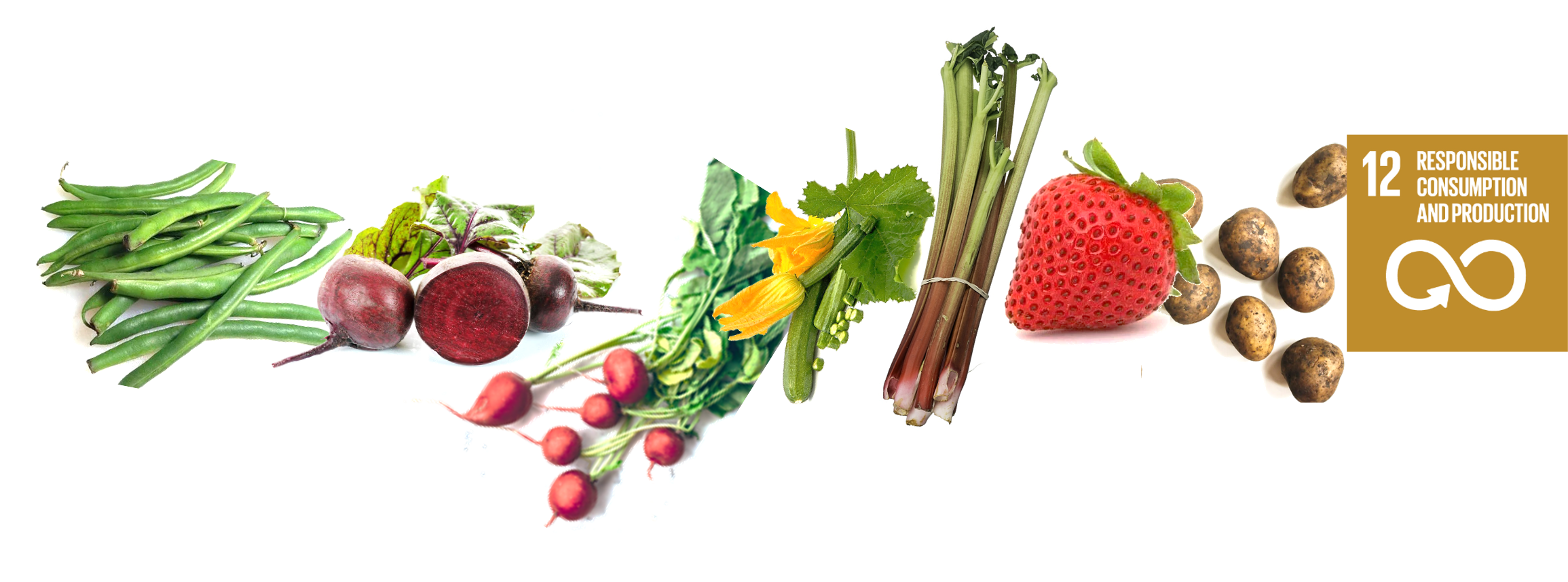
But which ingredients are
in season and when? The calendar will help you to find out.
In your favourite recipe, you may of course use basic ingredients such as eggs, dairy products, flour, sugar, salt, pepper or other spices.
Maybe you can try to buy the products from local farmers at the Pfarrkirchen farmer's market or at the weekly
market, which takes place every Friday from 7 am to 12 pm in Pfarrkirchen.
We would like as many recipes as possible, seasonal and themed throughout the year. Maybe you also have a favourite drink made from seasonal ingredients.
Send all to ecri-news@th-deg.de.
We will design our ECRI-NEWS recipe book from all the recipes submitted. You and your favourite recipe leave your mark and contribute to the ecological footprint....
Pauline Kreis & Claudia Nikitsin • 24.06.2022
Tochis Kitchen

We know how much little time we have right now to make proper meals, but I tell you Eating is a necessity, but cooking is an art.
To eat healthily is equally an important part of the equation and when we all eat, it would
be a sad waste of an opportunity to eat badly, so we bring to you today - Tochi's kitchen, a simple collection of cheaper, easy, healthy and simple recipes.
Take a moment to go through the page, help us grow by tapping that Red subscribe
button, kindly like our videos and share these to your friends and happy family. Stay tuned for more recipes.
Follow tochis kitchen via Instagram.
Buying international products in Germany
Have you already settled in Pfarrkirchen, and now you miss the products of your homeland? Oh, believe us, we understand that. One of the most difficult things when one comes from another country is trying to find the things one liked from their home countries. Over time, one assumes there are some things one will never find again, and others which we can recreate at our new home.
Nevertheless, it doesn´t have to be like that. There are many stores in Pfarrkirchen, Eggenfelden and the bigger cities around them (such as Munich or Passau) that have products from our home countries, and making use of them is a nice way to adapt to our new environment, without giving up things we grew up with and like.
So, how can I find general products from my homeland?
Well, in this case you might want to have a look at the local stores, and see if there as an equivalent or similar product in Germany. Lidl, Aldi, Edeka and Netto normally have similar products to the ones we miss, and that with slight modifications can work perfectly.
An anecdote I always like to share, is that in my home country (Argentina) we have something called Pascualina, which is a kind of quiche tart dough. I looked and looked for it and could never find it, until I realized I could buy Blätterteig, add more flour, and simulate my dear lovely Pascualina.
Using your imagination and your cooking skills (or your mother´s or father´s) will give you a great advantage.
And if I want more specific products?
Here we should first see where you are from, and then we can see where you can find that.
Pfarrkirchen has some international food stores, such as Fain or Damas Market. You can also find some international products (such as Russian, Spanish, or Portuguese ones) at some supermarkets. Lidl, for example, organises once per month an “Iberian week”,and they sell products from Spain or Portugal, such as Iberic cheese,empanadas, flan, among others.
Some restaurants, such as KinhDo, offer products from other countries for sale.
And if I can´t find what I want at these places?
Then you might want to look at other cities. Munich and Passau are the closest biggest cities, and they offer a huge variety of different shops where you can buy international products.
In Munich there are many African, Asian & Latin American stores. If you are in groups of people from your same country / region, you can ask them about it, and they can surely recommend you more specific things.
Passau also offers some international food stores, many Syrian, Lebanese, Turkish, Chinese, Japanese, Korean, and Italian options.
Hey, I still can´t find what I want…
Have you thought about online shopping your products? Nowadays, there are many online-shopping stores for products from your homeland or continent, and most of them at convenient and affordable prices. Just be aware of the boarder tax and controls (Zoll) as they may increase. It is preferred to always ask the shops about shipping and boarder tax.
Some stores in Passau, Munich or even in Berlin or other bigger cities might send you some products per post, as long as they don´t need cooling systems. You can always call them, ask them, and arrange directly with them.
And lastly, did you know that our own university has a team of innovators which are tackling this problem? KulturCart is an online shopping app which is currently being developed by a team of ECRI students, with the help of the THD Startup Campus division. Want to know more about them? Check here!
Best restaurants in Pfarrkirchen and where to go, according to our students>
What our ECRI students think: Best gastronomic venues in PAN edition!
As we all know, attending college is way more than just studying. Social life has a big influence on it, and what we do and where we hang out with our friends is one of the most important aspects.
Pfarrkirchen is a small city located between bigger cities, but this doesn´t mean that PAN itself doesn´t have good places to offer! With clubs closed; restaurants, cafes and pubs have become our main meeting points with friends, and today we asked our ECRI students about their favourite spots in the city!
4th semester IE student from Spain:
“My favourite restaurant in Pfarrkirchen is a small Italian pizzeria called Fiume, which is located just next to the Norma supermarket. I like it because of the service they provide. Customer service there is incredible, the best in the area for me. They are wonderful people, always looking after their customers and checking that everything is alright.
One of the best things for me is that if the restaurant is about to close, but you are there with some friends on their outdoor patio, they have no problem letting you stay there while they clean the place and prepare everything for closing. They are very flexible and always put the customer first.
Apart from that I think the food is very tasty, and the ratio quality-price cannot be better. Prices are very competitive for the area, and that certainly helps when you are a student!”.
ITM Alumni, 23 years old from Germany:
“One of my to-go place is Kim Phat Asia Imbiss, a very small Asian restaurant located in the center of Pfarrkirchen.
Service there is great, the owner lets you change some things on the menu if you want something more specific (such as less or spicier, etc). The food is very good and cheap.
For me it’s also important that the owners always try to make you feel special and give you little things for free, such as cookies or small treats.
If I could recommend them to change something, I would ask them to add some sushi plates, even simple ones. It would be nice to have sushi in Pfarrkirchen”
4th semester ITM student, 21 years old:
“My two favourite restaurants in Pfarrkirchen are Einstein and Il2. Both are suitable for grabbing a quick bite which tastes good or getting a drink with friends. Depending on the mood I would choose one or the other. Il2 is more modern, and Einstein has a traditional vibe to it, either way, both places feel cozy to chill in”.
7th semester ITM student, 32 years old from Argentina:
“I have two favourite restaurants in Pfarrkirchen: Fiume Pizzeria and Mery´s café.
Fiume is a very nice restaurant, their menu is a little bit limited on options but what they do, they do it well. It´s very tasty, homemade; and their customer service is incredible.
Mery´s café is a much smaller restaurant, it doesn´t have many options, and I go there mostly when I want “Kaffee und Kuchen” (coffee and cake); but service there is also great, and they always give you something extra.
For me, both places are good and have their own good points but at the same time they are very limited in options, especially if you are vegan/vegetarian or have any allergies. More options and maybe the possibility to pay with card is something I would recommend them to change.
I basically like to go where they serve me nicely."
----
Disclaimer: all texts are real testimonies given by different students and alumni of THD ECRI Campus. Comments do not represent the views of the THD institution, neither that of ECRI or ECRI NEWS employees. THD and ECRI News do not take any responsibility for the following comments or suggestions and express that the gastronomic offer in Pfarrkirchen is far larger than that mention in the following article. There is no commercial or promotional relationship between the gastronomic venues here mention and the THD institution or ECRI and ECRI News employees.
--
Ayelen Toscano Juanes • 10.09.2021
Products directly from the farm Rottal-Inn
Products directly from the farm are characterised by quality and freshness as well as regionality and variety. They stand for sustainability and transparency in production and have short transport routes. And they taste good too.
Try
it out:
https://www.direktvermarkter-rottal-inn.de/zucchini-karotten-roesti-astrid-josef/
Claudia Nikitsin • 11/2020
Milchtankstelle Degernbach and locally produced food
It’s Sunday morning, the sweet scent of coffee wafts through the flat and all you want to do is have a sip of this godly drink, when you realize you ran out of milk. This is maybe the worst that can happen to you on a Sunday morning, especially
if you are not a morning person. Good thing that there is the “Milchtankstelle” (translated literally it means milk petrol station) in Degernbach. There you get fresh milk 24/7 for 1€ per liter. Either you can bring your own bottle or
you grab one of the plastic bottles that are offered next to the automat called “Milchtankstelle”. You can choose the amount of milk you need, from 100 milliliter to 1 liter, which is very convenient. No matter if you would like to enjoy
your Sunday morning coffee with milk or the urge to bake some Christmas treats hits you in the middle of the night, the “Milchtankstelle” is the place you can go to no matter what time or day it is. A nearby farmer who stocks the automat
daily freshly produces the milk.
And if you are lucky enough to go there during a weekday you should also bring a satchel and check out the butcher and the shop right next door. The shop is open Monday to Saturday and offers a variety of fresh food from local producers,
especially vegetables, fruits, flour, mixed pickles and other things. The butcher is only open Thursday to Saturday and offers fresh meat from farmers of the region of Rottal-Inn. On some days, they also offer freshly baked bread. And,
to be honest, there is nothing better than a nice slice of fresh bread with handmade marmalade together with this cup of coffee.
If you would like to know more about it just visit the homepage: Sagstetters Gemüseladen
Miriam Bleck • 11/2020
About Milk
Milk or milk production is often in the crossfire. So when you buy milk, pay attention to where it comes from (for example Direktvermarkter) or how the cows are kept (Milchratgeber). And especially do not buy too often and do not waste anything.
And by the way...what are the differences between dairy milk and the plant-based alternatives?
Anna Marquardt • 11/2020
Too Good To Go
Did you know that we are currently wasting one third of all the food we produce around the world? That’s a lot! Most of the food that we waste is still good enough to eat besides not having the perfect color, size or shape.
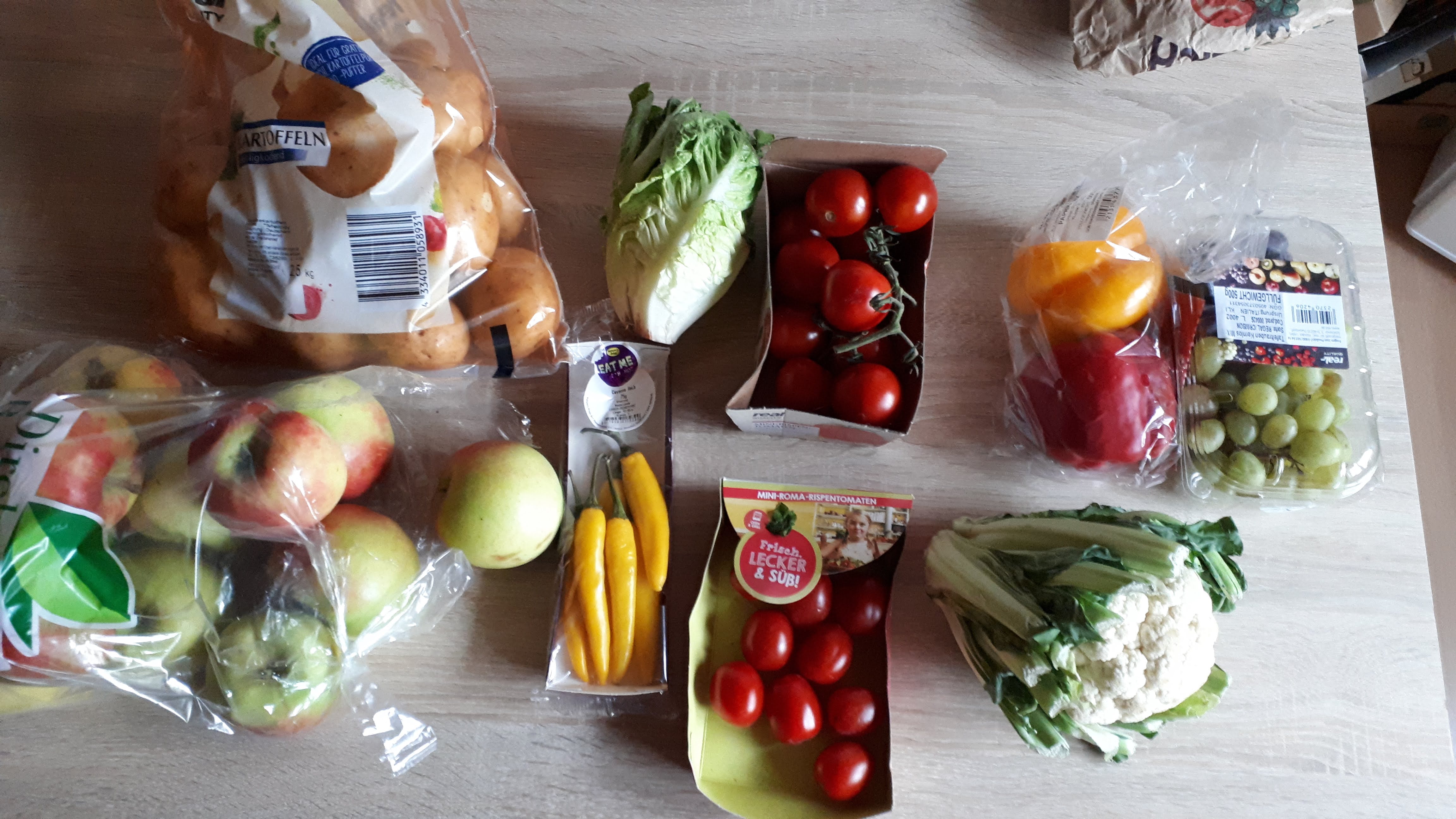
The
Magic Bag on Too Good to Go: These fruits and vegetables were safed from being thrown away.
Too Good To Go
With the app “Too Good To Go” you can now safe food from being thrown away. The app shows you grocery stores next to your location that are giving away food that they would throw away as it is still good, but not good enough to keep in store. For about 3€ you can purchase a “Magic Bag” that’s filled with fruit and veggies worth more than 10€. Especially if your budget is low, this is the perfect opportunity to step up against food waste and safe some money at the same time.
There’s not only the App but also the “Too Good To Go” website with a lot of tips on how to safe food, such as recipes or hacks, a blog on the issue of food waste and also a Youtube channel with advice, information on the impact of food on our planet, how it is produced, tips and tricks.
Foodsharing Groups
If you are on facebook and are capable of some German, I also recommend the group “Noch
guade Lebensmittel retten Rottal Inn”. There, a lot of people and also restaurants from the region of Rottal-Inn are offering food that’s left over or also fruit and vegetables that they harvested and cannot all eat by themselves.
Another group on facebook that you should check out is “Foodsharing Eggenfelden”. This group is more focused on the region of Eggenfelden, but there’s also
people from Pfarrkirchen in it. You should also know some German for it, but it is really good if you are looking for food or also if you are having some left-overs you would like to share with others.
Miriam Bleck • 11/2020
Recipes
Recipe • Cashew Cookies
Recipe • Baked Stuffed Apples
Recipe • Homemade Fruit Punch for Christmas
Life in Rottal-Inn
Summer is Coming!
Where can you take a break from learning or also study in a beautiful environment
Everybody who has ever had to sit for exams in summer period knows how extremely stressful this is: with temperatures rising and air conditioners practically inexistant (thank you, Germany…) concentrating can be one of the most difficult parts of passing these exams.
What place are we talking about?
Well, today we bring you a quick review about the Badesee Bad Birnbach.
Copyright: Lena Stallhofer / Bad Birnach
If you can understand some German, you have probably realised that it literally means “bathing lake Bad Birnbach” and that is exactly what it is.
Located just 15 minutes by car, 20 by train (train stop is 8 minutes walking from the lake), or 45 by bike from Pfarrkirchen, this lovely and small lake allows you to cool down under a tree and (something that is NOT allowed in the Rottaunsee) swim! Perfect to bring that summer temperature down!
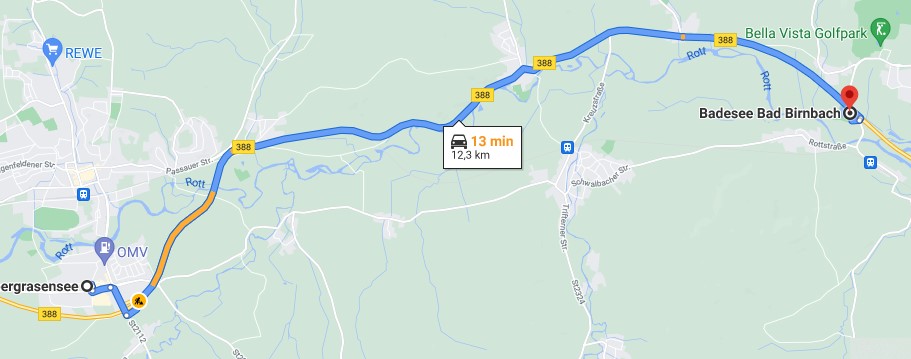
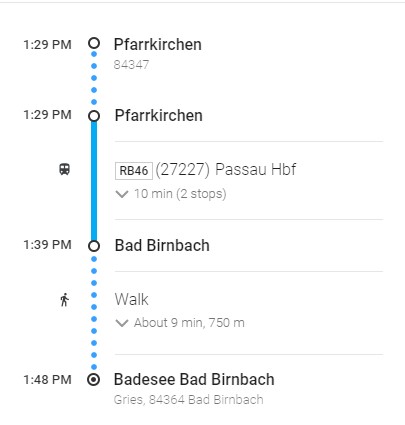

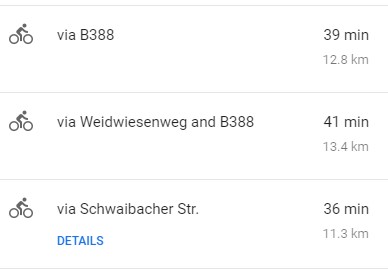
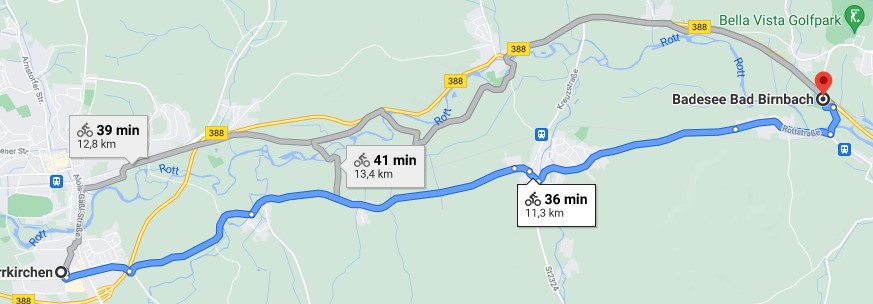
As it is in a very small and quite town, not a lot of people visit it. Perfect if you want some quiet summer paradise! And also, great for studying in there.
The green areas near the lake are vast, so you will have no problem finding a quiet spot to sit by yourself, not being interrupted by anybody.
Copyright: Lena Stallhofer / Bad Birnach
Just one recommendation: bring your own drinks and food. The nearest supermarket is around 30 minutes walking, so either stop on your way to the lake for provisions or bring them from home. And remember: pet and fireplaces are forbidden in this lake.
The place has bathrooms, changing rooms and a small kid´s playground. Everything you need to spend a quiet day there.
Coyright: Bad Birnbach spa administration / Bad Birnbach
The lake is opened daily from 9 am till 10 pm, and if you have any other questions you can easily contact them at: kurverwaltung@badbirnbach.de or call them at +49 8563 963046.
For more information, you can also visit their webpage at www.badbirnbach.de
If you want something more local, don´t forget our other posts on what to know about Pfarrkirchen, places to exercise in Pfarrkirchen, and many others!
Ayelen Toscano Juanes • 26.06.2021
Vereine
Associations in Germany
You have at least six friends with whom you share interests?
Why don’t you found a registered association (eingetragener Verein)?
Seven people that’s the minimum number of a Verein (association). In Germany there are about 600 000 associations,
and every second German citizen is member of at least one. They have been found for very different reasons. Most Vereine are for any kind of sports, especially soccer clubs are very popular, but in Germany you can find a Verein for nearly
everything: charities, environmental or human rights organizations, groups for various hobbies, artistic or cultural associations, remembrance committees, garden allotments, citizens’ initiatives, self-help groups, carnival clubs – just to
name a few. However important things like civil protection is organised in associations like e. g. Fire Fighters in rural areas. Germany’s largest association is the ADAC (German Automobile Club) with over 20 million members whereas the majority
of German Vereine are small ones with approximately 100 members at a max.
Where do associations come from and how do they work?
The first known Vereine were noted in the 17th and 18th centuries which were associations for literature which aimed to maintain culture and education. In 1848 the first laws for associations (Vereinsrecht) have been passed in Germany. Although, most people work voluntarily in associations the laws are quite strict. Usually, members need to pay a membership fee to finance the association’s disbursements. For what the Verein does spend its money is the discission of the executive board which runs the Verein. This board is called Vorstandschaft and consists of several members which get elected every few years. There need to be e.g. a treasurer (Kassenwart), a secretary (Schriftführer), observers (Beisitzer) and a president (Vorstand) who is responsible for everything. Sometimes there can also be extra members in the board who are for example responsible for the youth of the association (Jugendwart). Of course, you need a substitute for every position. At least once a year, there needs to be a general assembly (Jahreshauptversammlung) where all members meet and discuss the association’s current affairs or elect the board. All the regulations for the election or for basically everything about the Verein are defined in the constitution of the association.
Why do people join associations?
Granted, all these regulations might do not really sound fun, but a Verein is more than that. Being member in an association means meeting new people with the same interests, doing activities together, enjoying your spare time and maybe even becoming friends. Especially, when you just moved to a city it is always a good idea to join a Verein. In Pfarrkirchen there are several associations, too. If you are interested in sports, you could maybe join the TuS 1860 Pfarrkirchen, the DJK Sportfreunde Reichenberg (both associations for different kinds of sports), the Tennisclub Pfarrkirchen (a tennis club), the Bachschützen Degernbach (a sports shooting association), Alpenverein (mountain association) or the Luftsportclub Pfarrkirchen (a gilding association). Those not interested in physical activity might want to engage in the Tierschutzverein Rottal-Inn (a animal welfare organization), in the Freiwillige Feuerwehr Pfarrkirchen (volunteer fire brigade) or Spielecafe (game club).
List of assosiactions in Pfarrkirchen: https://pfarrkirchen.de/vereine.133.html
RESP e.V.: https://www.facebook.com/respev
Pauline Kreis 29.04.2022
O’zapft is!
That’s the popular shout out visitors of Bavarian beer festivals look forward to. It is said when the first barrel of beer is broached. After this moment everyone can get one of the typical beer jugs containing a whole litre called Mass. Of course, you can also have a so called Radler-Mass which is half beer half lemonade. Usually, this formal opening of these festivals named Volksfest is accompanied by a traditional brass band which frequently invites the crowd to toast with the word “Prost”. In Bavaria there are Volksfeste in nearly every city. People normally wear folk costumes to go there. Traditionally, girls wear dresses called Dirndl and boys wear trousers made of leather called Lederhose.
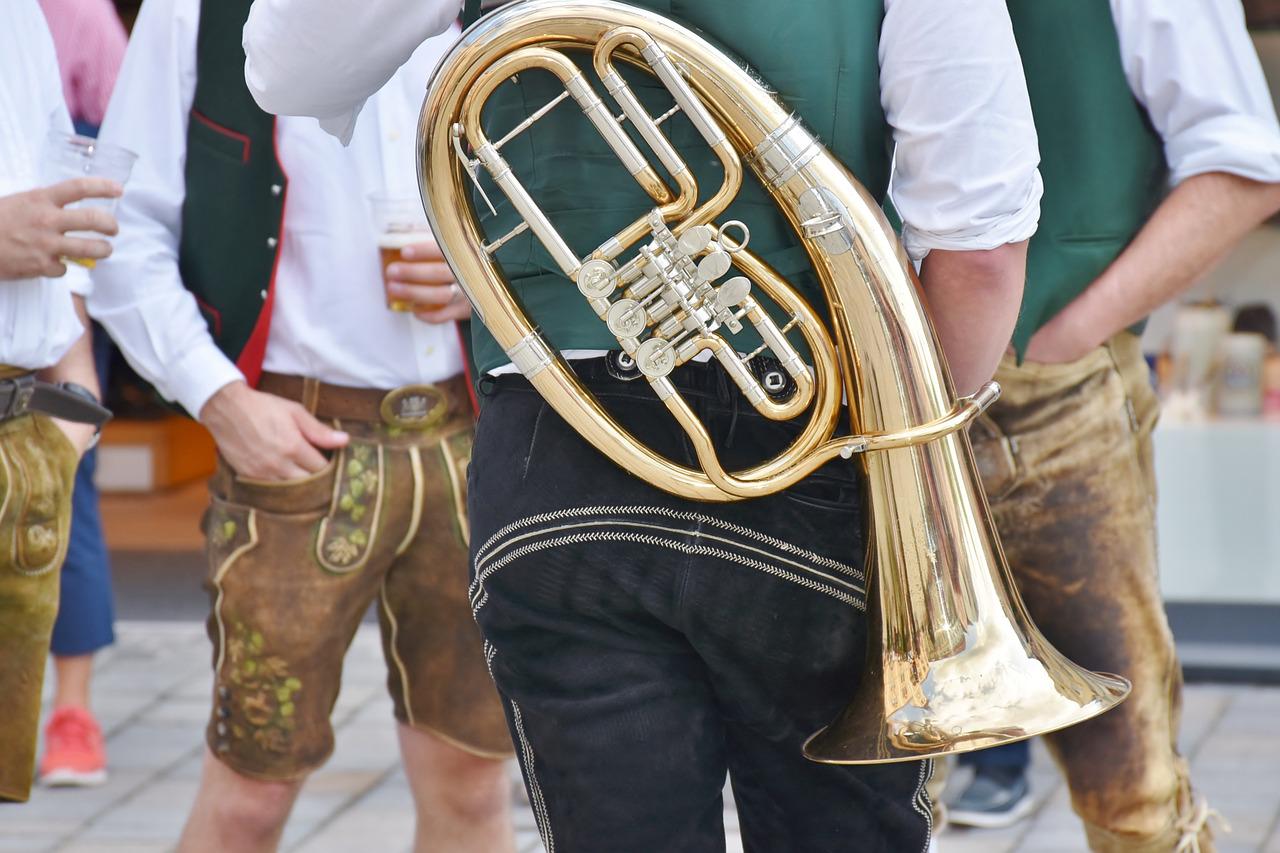
The biggest and most popular Volksfest in Bavaria surely is the Oktoberfest in Munich. But there are other smaller fairs, too. In the region of Rottal-Inn there is the Karpfhamer Volksfest in August.
The Gäubodenfest in Straubing also taking place in August is worth a visit, too, as well as the Dult in Passau taking place twice a year in spring and in autumn.
Find here some of the Volksfeste in the region:
- Eggenfelden: Gerner Dult 16. bis 25. April 2022
- Passau: 29. April 2022 – 08. Mai 2022
- Landshut: Landshuter Frühjahrsdult 29. April bis 8. Mai 2022
- Straubing: Gäubodenvolksfest Straubing 12. - 22. August 2022
- Karpfham: 1. - 6. September 2022
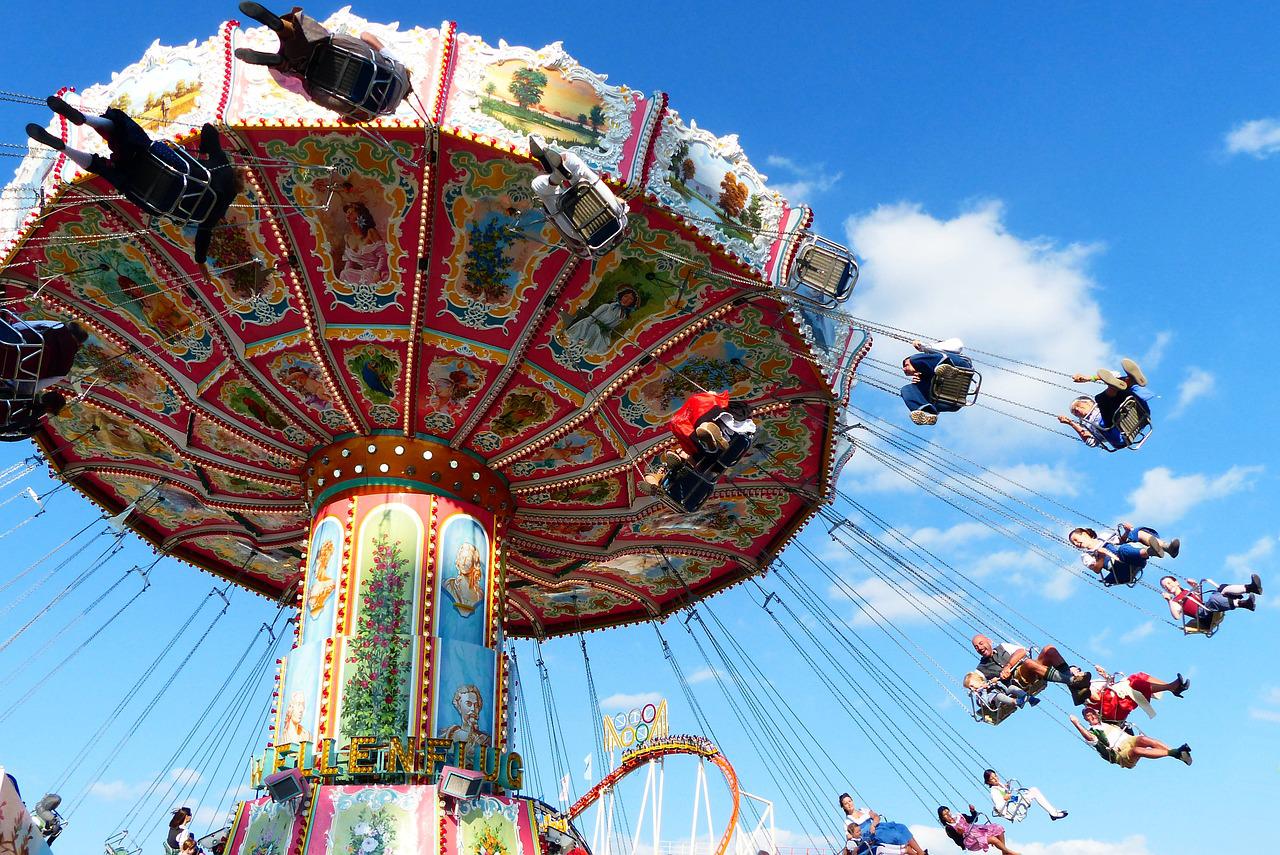
Often, Volksfeste taking place at the beginning of may include the tradition of
Maibaumkraxeln. A Maibaum is a 20- to 50-meter-high decorated trunk. This trunk is set up on the 1
st of
May. Some men then practise Maibaumkraxeln. They climb up the Maibaum
and ring the little bell on the top of the trunk. The only aid they get is pitch they can rub their hand and feet with so that they won’t slip. Afterwards the men (called
Maibaumkraxler
) are celebrated by the crowd and the Volksfest goes on.
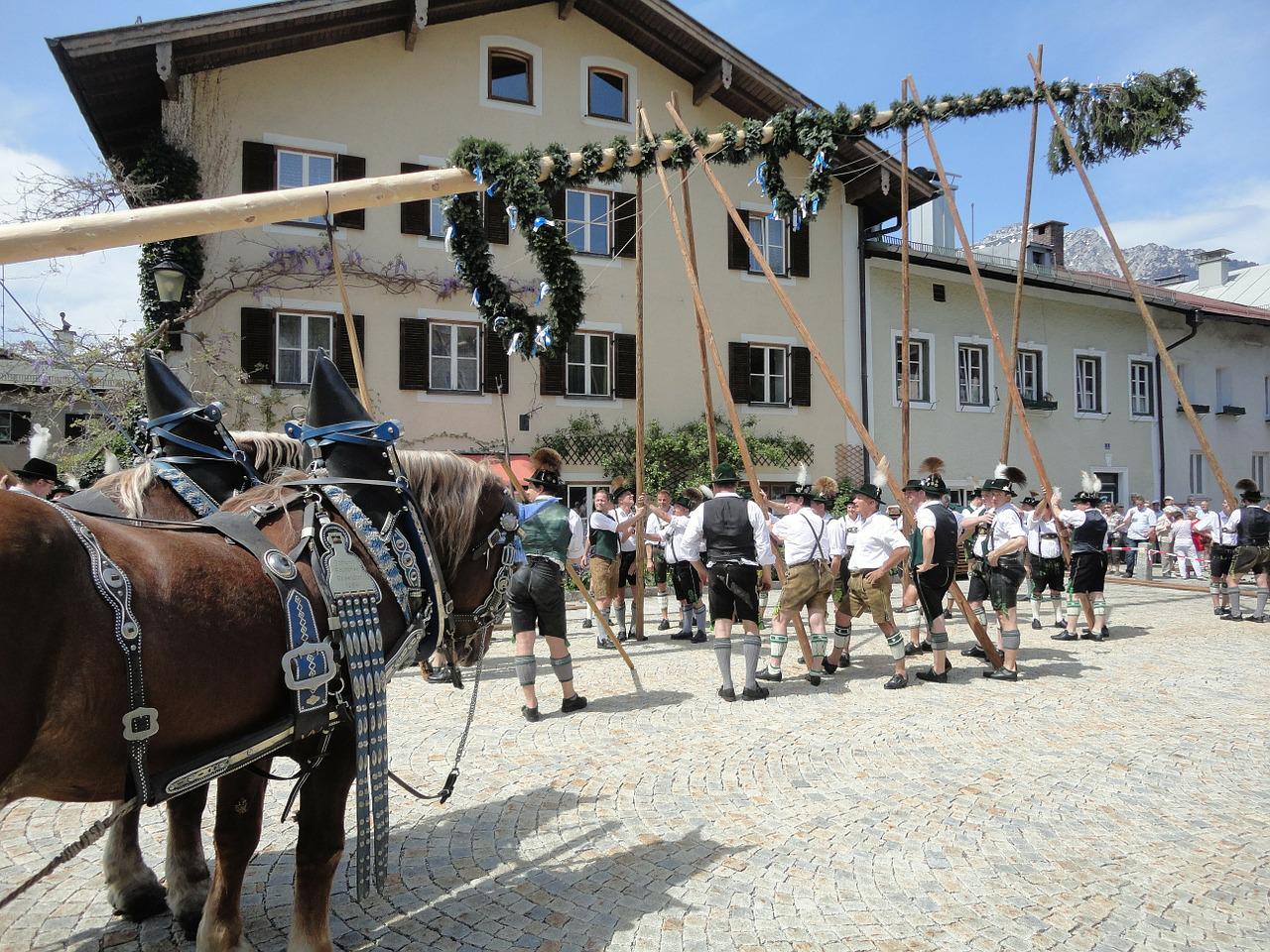
However, Bavaria is more
than just beer festivals. Bavaria is also known for its agriculture and traditional handcraft. In the region Rottal-Inn there are lot of producers offering an inside view to their work. With the project Rottal farm tour (Rottaler Hoftour)
you can visit several farms and learn something about how they produce – traditionally, regionally, fairly. Find more information on https://www.rottal-inn.de/en/economy-tourism/tourism/eating-drinking/
Pauline Kreis 22.04.2022
Short summary of all activities in the Rottal-Inn area
The university experience is more than studying and attending classes, and we all know that.
Friendships and activities to do in the area are equally important, and Rottal-Inn, although it might not seem at first, offers our students tons of different things to do.
We have already discussed some of them here at ECRI News, such as a day trip to Bad Birnbach, and the
lake near it, the Schönau Castle nearby,
or even neighbour Passau, among many others.
What more is there to discover, you might ask yourself…well, let´s see
Museums
Whether you are interested in nature, country life, history, art, and many other types of exhibitions; Rottal-Inn has the right museum for you. From Pfarrkirchen town hall museum to the open-air museum, be sure to visit them during your stay.
If you want to know about museums in the Rottal-Inn area, check here.
Bicycle tours
We have already done some posts about this, but some more are never too many!
Pfarrkirchen and the whole area is well-known for its bicycle tours, and if those shared by us are not enough, be sure to check all the recommended bike tours
here, and visit the tour portal here, where you will find all the bike tours around the district!
Highlights of nature
Are you more of a nature-lover? We got you. Rottal-Inn is an ideal place if nature is your thing, and there are many places, such as the Kaser stone room near Triftern, or the “Bürgerwald” in Eggenfelden (we have made a post about it already, check it here). To know more about nature´s diamonds in Rottal-Inn, check the official webpage here.
Adventure Park Voglsam
The adventure park in the Rottal-Inn district, which will reopen next Saturday, is a place of fun for both children and adults: with a go-kart track, hot air balloon flights, tree-climbing area, football-golf, and many others. Closed for a long time due to corona, it is going to reopen now, so don´t miss it!
Golf courses
If you like golf, the good news is, you won´t need to stop it during your time in Pfarrkirchen! There are two golfing courses, the Rottaler Golf Club in Herbestenfelden (very close to Pfarrkirchen); and the Bella Vista, in Bad Birnbach. Both with their unique qualities, great places for our golf-lover colleagues!
Parachuting and Tandem jump
For the more courageous and adventurous people out there, Rottal-Inn also has something to offer. Either for beginners or more experienced people, Exit Skydive offers different packages and lessons. If you are interested and would like to know more, contact them directly here.
Bowling, pool and other games
Either for just a night out, or if you prefer to take it as a regular hobby, the bowling centre in Pfarrkirchen is great for this! Some of our students already visited this place during the last pub crawl, and if you haven´t visited it yet… what are you waiting for?
More activities?
If you are still wondering what other activities you can do around the area, always check Rottal-Inn's official webpage (here you will find a summarized version in English, including the summer guide for the upcoming season, and here the complete version in German), or also the webpage of the city of Pfarrkirchen.
Ayelen Toscano Juanes 08.04.2022
Day visit to the Schönau Castel: getting to know the Rottal Inn region!
Did you know that just 10 minutes away by car from Pfarrkirchen you can find a beautiful small town, with nice and interesting history and, on top of all of that, a beautifully small castle surrounded by a quiet lake?Well, that place is called Schönau bei Pfarrkirchen, and maybe its time we get to know it!
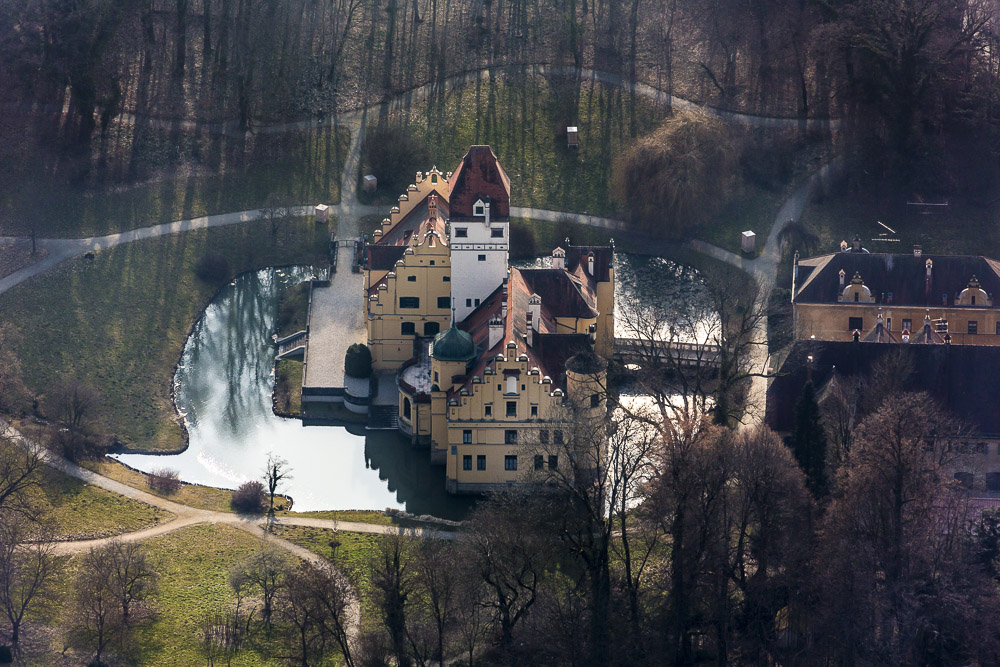
Photocredit: Klaus Leidorf / © 2013 Klaus Leidorf -- www.leidorf.de
Where is it?
This place that I´m describing, which could so well be taken out of the Snow white or Sleeping Beauty fairy tale, is just 10 minutes away by car, and there are daily connections with bus number 6211 from Pfarrkirchen´s main bus station (alternative stops: campus, gymnasium, and some stops in Postmünster). Bus timetable: https://www.gemeinde-schoenau.de/busfahrplaene/
With more than one thousand years of history, this small town has an enchantment on itself. If you want to know more about it, don´t miss all information available in their webpage https://www.gemeinde-schoenau.de/rathaus/geschichte-2/ (in German, you can translate it with the instant translator in your desktop).
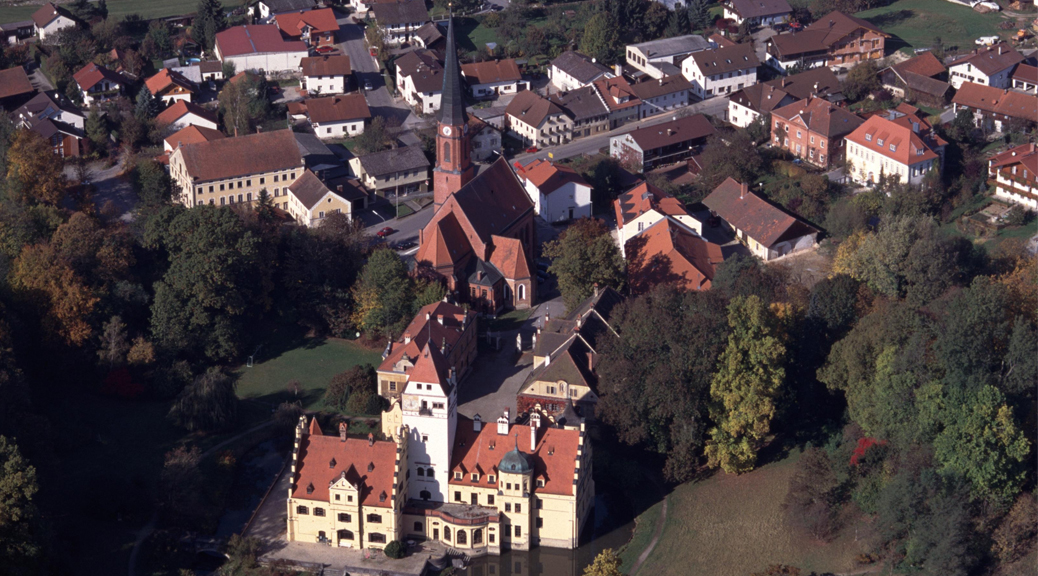
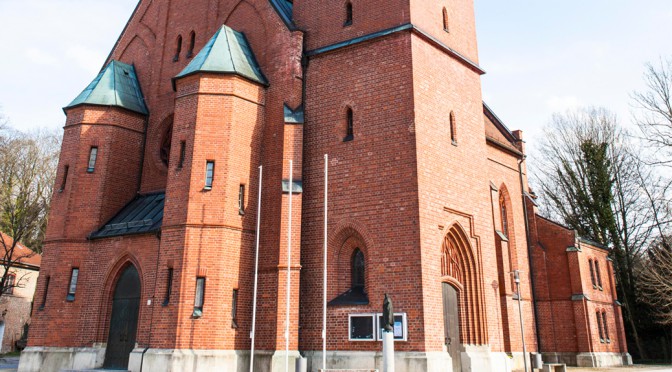
Photocredit: Gemeinde Schönau / Copyright: Gemeinde Schönau
About the Castle
Finding the castle is easy enough: just get off the bus station or leave your car in the centre, and from there is only 2 minutes by foot.
Buildt by Carl von Effner in 1867, the castle was inspired by the english garden in Munich. Later, between 1899-1900 the castle was rebuilt by architect Gabriel von Seidl, who expanded the park around it. More information on the castle´s history you can find at: https://www.gemeinde-schoenau.de/wasserschloss-schoenau/
The castle offers a beautiful view, place to sit and rest, and short walking paths. It´s just behind the historical centre, so you can go there beforehand or afterwards and enjoy walking through it.
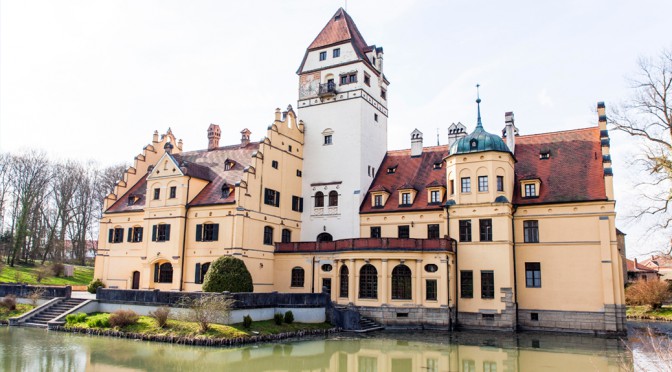
Photocredit: Gemeinde Schönau / copyright: Gemeinde Schönau.
What else is
there to do in Schönau?
There is a small café near the castle, in which you can grab a coffee to go and a piece of cake. Also, the small village has a bakery and some other shops, such as a supermarket, nearby.
For trekking and cycling fans, the local town hall has designed two trekking paths (“Around the Castle” and “through the forest and field”) which can be added on your day trip. They are easy and entertaining: https://www.gemeinde-schoenau.de/wanderwege/
When the situation allows it, the Voglsam adventure park might reopen. A visit to consider for your post-covid future!
All information retrieved from:
https://www.gemeinde-schoenau.de/
Ayelen Toscano Juanes • 13.05.2021
Back to Pfarrkirchen! Advice for your move-in day
Moving from one place to another can be quite stressful, especially if you are new to the area: from arranging different service contracts to getting furniture, the process might take you a couple of weeks.
Although renting
a WG (shared apartment between other students) might be easier, as normally all utilities, including TV-radio tax and internet, are included in the contract; but still some challenges might arise from the situation.
Here are some pieces of advice from our side!
Always ask your landlord/lady for a detailed description of what is included and what is not in the rent and clear out any doubts before signing the contract.
When moving into a new apartment, you might find in your renting contract the term “Warmmiete”, which means the final price with all costs included. Nevertheless, in Germany normally some services, such as electricity,
internet and the GEZ tax, are not included in the Warmmiete, and tenants must pay them themselves.
Some apartments, such
as one-bedroom student flats, might already include all these services in the final fee, though. In case of doubts, as your landlord/lady before signing the contract, or at least before moving in.
WG normally run differently. In this case, it is normally the person in charge of the whole WG (which can be the landlord/lady or the main tenant) the one in charge of paying for these extra services, and then they are
divided between all the tenants, including the fee in Warmmiete. Nevertheless, there are some cases of WGs in which the GEZ tax
fee has to be paid apart, or which does not include internet in the final fee.
Check if the rent is “pauschal” or not
If your contract says that the rent includes a “pauschal” (literally translated as flat-rate) on the extra expenses and utilities, this means that no matter how much you consume, you will not pay anything extra at the end of your
renting period.
On the contrary, if it doesn´t, that means that if you exceed any costs, your landlord/lady will have to send you a detailed declaration stating how much you exceeded, and you will have to pay the extra costs. If you live
in a WG, this amount will be divided by all the people who lived there during said amount of time.
On your first day, check your apartment / WG room and notify of any damages.
Normally, when moving into a new apartment you should fill out a document called “Übergabeprotokoll”. You need to include everything you see in these documents, such as scratches, holes, damages, etc. As a tenant in Germany, it
is your obligation to return the apartment in the same condition you found it.
In some cases, such as WGs, it can happen that your landlord/lady does not give you this document. You can always search one by yourself or ask
them to give it to you. If not, you can send a written document (such as an email or a letter) saying all the defects you find, so you are sure not to be blamed for them later.
Please also note the instructions from the
IO: How to care for
my apartment / flat room
Get furniture for your house
Although most student apartments and WGs come furnished already, some of them might not, or might not come with enough furniture.
You can find great, used furniture on ebay kleinanzeigen,
or even for free in some facebook
groups.
In case your apartment doesn´t have household appliances, such as washing machines or dishwashers, you can also rent them at a good price in Grover. The good thing about it is that if there
is a problem with the appliance, or if it breaks, they will change if you’re a new one. This is great for students who are only here for a short period, or a couple of semesters, or who plan to go back home during recess and only
rent apartments and rooms temporarily.
You can also use other tools to find used furniture, such as Facebook market, the local used furniture markets in Pfarrkirchen, or attend some Flohmarket in the area.
If you
need transportation for larger items, you can consult with local taxi
companies or moving
companies in the area.
Arrange all legal aspects
After moving into your new flat / WG, you should ask your landlord for the Wohnungsgeberbestätigung, a document (german / english) which states that you are legally renting that room/flat, and which will be required
from you when you try to register in the town hall.
After registering your new address in the town hall, don´t forget to inform every relevant party (such as a bank, foreigner’s office, among others) about your new address.
Also, to receive correspondence at your new address, you need to ask your landlord/lady, or the person in charge of your building, to add your name to the doorbell.
If you´d like to know more about accommodation
and tips on how to find an apartment, among others; we recommend you visit International Office “ECRI
Orientation Day” ilearn course.
Ayelen Toscano Juanes 01.04.2022
How to rent a room/flat and not dying in the middle of it: top tips for students. Part 1/2
Are you a new freshman student, looking for a place to rent? Or maybe you have been in Germany for quite some time, but there are still things you don’t get about renting? Don’t worry, here we explain easily everything you need to
know about renting a room/flat in Germany!
1- Contract
If you rent a room or flat in Germany, a rental agreement has to be signed between you (as a tenant) and the landlord or real state agency that owns the place. Contracts are a must, and there are some simple aspects that rental contracts must include:
- Name of both parties
- Length of the agreement (if there is a specified termination date)
- Amount of the basic rent
- Amount of additional costs
- Amount of the deposit
- Agreement of redecoration when you leave the place (if there is a decoration agreement)
- Rent increases (if there are any)
- In case of semi-furniture or furniture flats or WG, an inventory of all items
- General house rules, specially for WG and apartment buildings.
Other aspects, such as the tenant- landlord responsibilities and relationship, are usually codified in the law.
2- Termination date / notice period
When signing a rental agreement, be careful on what the termination date for said agreement is. This is also something you might choose to speak with your landlord beforehand.
Some contract can have a specified duration (one or two semesters, for example) while others might be indefinite. If the latest is your case, then the contract must also state a notice period: this means, how many months in advance you have to inform your landlord that you are leaving /want to terminate your contract.
By law, this period is three months, meaning that if for example you plan to leave your WG room or Flat by December 2021, you must inform your landlord by September at the latest.
Notice must be handed in a written form and at the beginning or middle of the month (1st or 15th).
3- Deposit
The Mietekaution (deposit) is security deposit that most landlords ask for when moving into a flat or WG, and which is later refunded when you leave the place. Nevertheless, if there is damage to the property, your landlord is legally allowed to withhold some part of the deposit to repair said damages.
The deposit can legally be an amount of up to 3 months of basic rent (Kaltmiete), though most landlords require for only one or two months of basic rent.
By law, the deposit must not be directly transferred to the landlord’s account, but rather into a joint savings account (Mietkautionkonto). This way, the landlord won’t be able to take the money without your agreement and at the end of the leasing period, you will get the interest of said money (as long as you don’t cause any damage to the property).
4- Taxes and services
Taxes are very important in Germany, and you must always be aware of which taxes you must pay. Generally, when you pay rent for a WG, all necessary taxes are being paid by your landlord (garbage disposal tax, municipal taxes, etc) but there might be some which are not included, and therefore is better to ask your landlord beforehand.
The most common tax which needs to be paid by the tenant is the GEZ Tax, known as “radio tax”. Every household in Germany must pay this tax and is the right to watch and listen all public channels and radio stations. Even if you don’t have radios or TV in your house, you must pay this tax as you can watch TV and listen to the radio online, with your computer. As mentioned, it is paid per household and not per person, which means that only one person in your house has to pay it (although normally every adult living in receive the notification, it is enough for one of them to pay it and the others to inform that that person is paying it with the number associated to the account).
In WGs, the landlord usually pays this import, but there are some which might ask you to pay it yourself. When renting a flat, it is usually the tenants’ responsibilities to pay it.
It is also important to notice that some services might not be included in your rent. Electricity and internet are the most common services which tenants have to pay by themselves, especially when you rent a house or apartment. WGs usually include these expenses.
Another relevant topic is whether the “Nebenkosten” (extra utility costs) are fixed or not. If they are not fixed then at the end of the year your landlord will make an evaluation, analyzing if you have consumed more or less of the agreed amount. If you have consumed less, you have the right to recover the different; but if you have consumed more, then you have to pay the extra costs. It is highly recommended to ask this beforehand and ask for this point to be written in the contract. In case your landlord informs you have consumed more and need to pay extra costs, he has to send you a detailed notification of how that occurred, with the corresponding invoice.
5- Recycling responsibility
Recycling is a very important aspect of Germany’s system and must be taken seriously.
In Pfarrkirchen, there are four different bins you will find outside your house: brown, black, blue and yellow. Brown is for compostable and organic elements, such as food, plants and others; blue is for cardboard, paperboard and paper; yellow is for plastic, and black for non-organic elements and mixed elements.
For glass and cans, you will find designated spaces all around the city, especially near supermarkets, where you can dispose glass also according to their type: white, brown, green or cans.
Separation of elements is very important and is not optional, but rather mandatory in Germany, and not doing it can get you into troubles, such as trash collectors not collecting for your household anymore, or even eviction in some
very difficult cases.
See also the article "Separating waste correctly in Pfarrkirchen" in this section.
Sources for this article:
https://www.howtogermany.com/pages/housing.html
https://www.studying-in-germany.org/renting-in-germany/
https://www.expatica.com/de/housing/renting/rent-in-germany-103803/
Also check out the app INTEGREAT for the county Rottal-Inn. Not all pages are available in english, so check out the german page as well.
Ayelen Toscano Juanes • 03/2021
How to rent a room/flat and not dying in the middle of it: top tips for students. Part 2/2
6- Which documents do I need to rent a room/ flat in Germany?
Though documents are a must when renting in Germany, mostly in big cities like Munich, Berlin or Hamburg; in smaller cities like Pfarrkirchen, and especially for student-apartments, landlords tend to be more flexible.
Nevertheless,
having these documents available will surely make it easier for you to show prospective landlords that you are a trustworthy tenant not only during your stay in Germany as a student, but also for your future.
So, the essential documents are:
- Copy of your ID or Passport(in case you are here with a visa, copy of the visa or residence permit might also be asked).
- Salary confirmation or bank statements. For students, this is not so required as for other tenants, but it might also be handy to have these documents ready. In case you do not have a job in Germany yet, a bank statement
from your block account or your normal bank account, which shows that you have sufficient founds to pay your rent, will be enough.
Have in mind that some landlords, especially in big cities, ask for tenants or the person responsible for the tenants to have a stable income of three times what the full rent.
Again, this is usually very flexible for students, but is information worth to have for your future life in Germany. - Credit Record (SCHUFA): This is an essential document if you have lived in Germany for quite a time.
It is basically a document which register your bank debt track, and helps landlords see if you can meet your financial obligations or not. It opens the moment that you arrive to Germany and register in the town hall, and it can show a better/worst record depending on your bank statements and your own record.
If you are new in Germany you won’t have it, and that is no problem: just speak with your interested real state agent or landlord and explain this to them.
It can help to bring your credit record from your home country.
To ask for it, you can ask for the free version at the SCHUFA webpage, or the paid one (30 euros) which is easier to read and more comprehensive.
7- Do’s and Don’ts in your rented room/flat
As everywhere else in the world, Germany has rules regarding things you can and can’t do in your rental room or apartment.
Some of these are very basic and common knowledge, while others might be specific guidelines or norms
for your apartment / apartment building: these are usually stipulated in the house rules, which your landlord has to handle you when renting your apartment.
Have in mind that this is a legally binding contract, and that by agreeing
with it you must follow it.
Some of said rules are:
- Avoid loud noises from 1 p.m. to 3 p.m.; and from 10 p.m. to 7 a.m.; and all-day during Sunday.
This includes loud cleaning, using noisy home appliances (like washing machines and dishwashers) and fixing things around the house that might be too loud. It is considered “loud” if any of your neighbours can hear it.
If you live in a WG, arrange directly with your flatmates, but have in mind that generally speaking, these rules apply for WGs too. That means you can’t use the washing machine or dishwasher after 10 p.m. (they have to be OFF by that time) unless you specifically arrange something different with them. - Wash and dry laundry only in designated areas by the landlord
- Be conscious when separating your trash and remember what we talk in point number 5.
- Ask your landlord for written permission if you want to keep a pet (unless it says otherwise in your contract).
- Leave cars, bicycles, baby carriages and any other equipment only in designated areas or areas provide by the landlord.
- Ask who is responsible for cleaning entrance halls and stairways, front hall, etc. It could be you!
- If you leave in a WG, ask your flatmates or landlord if there is a cleaning plan. In some house rules, not attaching to your clean plan could result in eviction, so be sure to follow it.
- Open your windows every day for 10 minutes, to allow fresh air and avoid mold and humidity.
- Install satellite dishes, television or radio antennas, without your landlord permission. And don’t install anything that might break local laws.
- Pour or shake anything from balconies or windows.
- Barbecues, grilling or an open fire on your balcony is prohibited.
8- Visits
Having visits is a normal aspect of social life, and what constitutes as a “visitor” is always a tricky aspect.
According to German laws, a visitor is a person that is occasionally visiting you and doesn’t stay more than six
weeks at a time.
If the person leaves for one day and then comes back, then the visitor status is restored.
Your landlord cannot charge you extra per day/night that somebody stays in your house, but if you do have a visitor
for more than six weeks, he can ask you to start paying extra utilities costs for them.
You also have to consider how many people stay at the same time in your flat/room and dimensions of it: if you have a one-bedroom apartment,
you can’t have three people staying there for more than a couple of nights, because that might cause an overcrowd problematic. Nevertheless, one person can stay there for up to six weeks without paying extra costs.
If you
are living in a shared WG, consider asking your flatmates first. One person staying in your room for a couple of nights might be fine, but for a longer period it can constitute an extra person living in the flat and cause problems
with the shared spaces and resources of the house.
If you know from the beginning of your rental period that somebody might be staying with you for longer period of times (boyfriend, girlfriend, spouse, child, etc.) you
might want to clear this with your flatmates before moving in.
Another aspect to consider is expenses. If you are paying a not-flat rate for your expenses and services (such as electricity and water), having somebody over
for a long period of time might incur in higher costs, which you have to pay at the end of the year.
If a person is going to stay for longer than six weeks, you might need to pay extra utilities cost.
During corona
time, be aware of local rules and regulations regarding the maximum amount if visitors.
Also, be aware that generally extra visitors count for the whole flat, and not for the individual tenants – that means, that if only one person outside of the household is allowed, and two of the tenants want to invite
their partners, those two partners would count as extra visitors. That would break the corona-contact-rule, and you might want to reach an agreement with your WG flatmates.
9- German terms for renting: all renting-related words you need to know
When searching for a flat or WG, there are some terms which might surprise you or you might nor understand.
Here is a list of the most common German renting-related terms.
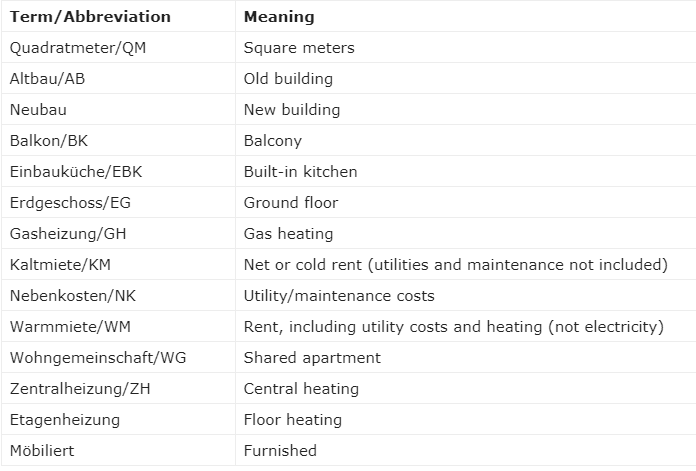
Source: https://www.studying-in-germany.org/renting-in-germany/
External sources used for this whole articles were:
https://www.howtogermany.com/pages/housing.html
https://www.studying-in-germany.org/renting-in-germany/
https://www.expatica.com/de/housing/renting/rent-in-germany-103803z
Ayelen Toscano Juanes • 02.04.2021
Travelling to Pfarrkirchen
A new, exciting semester started this week, and it is the first time in 2 years that students will finally have classes back at our European Campus in Pfarrkirchen!
Although this is great news, and we are all very happy to meet with our colleagues and friends back at our lovely ECRI, it can also create some logistical inconveniences for students who during the pandemic moved to other cities in or near Rottal-Inn, and need to commute to Pfarrkirchen on a daily or weekly basis.
If this is your case, don´t panic! There are tons of ways how you can get to PAN easily.
Of course, the easiest and most flexible way is to just come with the DB train.
DB runs many lines, and there is one (Passau – Mühldorf) that goes right through Pfarrkirchen. From Mühldorf you can connect with other trains to, for example, Munich, among many other destinations.
Train
ABO • Suitable for: long distance, almost daily, fixed route, only valid on the route here
If you are planning on using the train regularly, perhaps it would be convenient to check some promotions DB has available, such as the “ABO” card, where you subscribe for a whole year and you pay a specific rate for travelling between two destinations as much as you want. Find more information and how to order it here.
•••••
BahnCard, Trial BahnCard • Suitable for: long & short distance, flexible, spontaneous, valid throughout Germany
With a BahnCard 25/50/100, you can get during the duration of the card a discount of 25% / 50% or 100% on all DB journeys, as long as you travel with the card and your ID. You can check the conditions and fares here.
The Trial BahnCard 26/50/100 for 3 months is ideal if you are still unsure how often you want to use the train. Be aware! If you don´t cancel your Trial BahnCard; it will automatically be renovated for 12 months, and you will need to pay the full year-long fare. Be sure to cancel in time! You can find fares and conditions here.
Also, if you are 26 inclusive or below, you can get a discount on the BahnCard 25/50, with the so-called My BahnCard 25/50. Find everything about them and other special offers for travellers under 27 years old here and here.
•••••
Bayern Ticket, Südostbayernticket • Suitable for: irregular, spontaneous, groups of people
Here you should be aware of the Bayern ticket, which allows you to travel all day from 9 am – 6 pm during weekdays, and all day through Saturday and Sunday for 25 Euros. Each extra person would add 8 extra Euros, and you can include up to five other people.
For travels among the region (for example, if you need to reach Munich or Passau) you can also check the Südostbayern Ticket, which costs 20 Euros for the first person and 8 Euros per extra person. All rules (when can you use it, which days) are the same as the Bayern ticket.
If you are travelling further away than Bayern, then you should check the offers for the whole trip.
Campusticket from the VG Rottal-Inn
Combiticket Bus/Train • Suitable for: regularly and in the Rottal Inn region
If you are a student in the Rottal-Inn district, another great chance is to apply for the Campusticket at the VG Rottal-Inn, which will allow you to travel inside the Rottal-Inn area at really discounted prices.
The Campus ticket is a semester ticket with a duration of 6 months, and it needs to be ordered 2 months before the semester according to the VG Rottal-Inn starts.
Map of the area HERE.
More information about requirements, prices and conditions can be found HERE.
Carpooling, carsharing
Carpooling and carsharing are also two great, environmental-friendly possibilities of coming to Pfarrkirchen.
There are many platforms in which you can search for this in the Rottal-Inn and Bavarian region, but our top searches are:
BlaBlaCar, an online platform that allows you to mark from point A to point B and see how many possibilities you have of getting a shared ride.
Flinc, an app that allows you to share vehicles with your co-workers.
Rottal-Inn´s “carsharing central” (Mitfahrzentrale), in which you can register and search for shared rides around the area.
Or Bessermitfahren and Mitfahren.de which, such as BlaBlaCar, allow you to enter where and when you want to travel and find travel buddies or shared rides.
Others
Bike
You can find a map of the cycle paths in the area at the Pfarrkirchen Tourist Info or online at: https://www.rottal-inn.de/wirtschaft-tourismus/tourismus/radeln-wandern-tourenportal/.If you live in Eggenfelden, check our old post about bike tours around that area, which includes indications of how to get to PAN by bike. And for the ones living in Bad Birnbach, in our old article about the thermal spas in that area, we also included indications of how you can travel by bike between the two towns! Both articles can be found under this section, just scroll down to find them!
Bus
Another alternative to the traditional train is bus transportation, such as Regio and FlixBus. There is no FlixBus from Pfarrkirchen, but there´s from cities such as Mühldorf, Passau and Munich. So, depending on where you want to travel, FlixBus its combinations can provide you with a cheaper, more direct way to travel.Travelling by bus tends to take longer than by train, but if your destination is far away and plane tickets are too expensive (for example Holland, France, Denmark, etc), then travelling all night in just one bus, no changes, could be more comfortable than making 5 changes during the whole night. And cheaper, of course.
Taxi
And lastly, in case you need to move a lot of luggage out of your apartment, maybe a taxi would be the best option. In Pfarrkirchen there´re two taxi service options: Taxi Shala and Taxi Milles. Both companies also offer airport shuttle.Both offer great choices, with good tariff rates according to the legislation in the city of Pfarrkirchen.
For more information on taxi services in Pfarrkirchen, or in Rottal-Inn in general, you can read all about them here.
Apps
If you want to find more info on how to travel throughout Germany in general, you can always visit the Deutsch Bahn webpage; or pages such as Omio or Rome2Rio to search for different alternatives.Ayelen Toscano Juanes 18.03.2022
Useful information: vaccines at Rottal-Inn
Are you new in the area / Germany, and want to get vaccinated against SARS-COVID-2?
Well, good news: In Germany, every long-term resident (which as a student, you are) can get vaccinated for free with one of the approved vaccines!
Vaccination centre changes from 17.03.2022:
From 17.03.2022 the vaccination centre for the Rottal-Inn area will change its address and will move from its current location in Eggenfelden to Pfarrkirchen. In the future,
the vaccination centre's permanent address will be on "Am Griesberg" street, right next to the hospital.The moving efforts will start on 15.03.2022, and therefore it could be that during the 15.03 and 16.03 the vaccination centre remains close to the public.
For more information, visit: https://www.rottal-inn.de/meta/news/news-detail/impfzentrum-zieht-nach-pfarrkirchen-um/
General notes
You can also arrange an appointment with a Hausarzt (General Practitioner, GP). For this, you will need German health insurance (read our article on everything you need to know about GPs in Germany here).If you are already vaccinated, but your vaccine is not recognized in Germany, you need to make an appointment with a GP, who will inform you about your possibilities.
What shocked me the most about Germany, as an international student
When I first arrived in Germany, I was a 24-year-old Argentine coming to do an au pair experience in the city of Hamburg. Coming from Buenos Aires, a huge city with tons of possibilities, and travelling for most of my life around Latin America and Europe, Hamburg did not surprise me in the beginning. It was a big city, and I was used to big cities. It was loud, and people would speak different languages in every corner, but I came from one of the most multicultural cities in all of South America, so what could shock me? I thought.
Nothing!
Oh, dear…. I was so wrong!
My first month in Germany was like a honeymoon. I was in love with the country, the people, the culture, and I thought nothing could affect me, that the “cultural shock” everyone warned me about was just a myth, and that I would have the most incredible year of my life ahead of me. Well, that last bit was true, the rest… the rest not so much.
But after a month, I started to realize that this new country which I called my “home” had so many differences from my homeland, things which I had never thought of or expected…
One of the first things that shocked me as an international student/au pair in Germany, was the enormous number of legalities!
Everyone in Argentina knows that Germany is a hardworking country and that Germans follow the rules. We could see it when tourists came to our country and would follow laws and regulations that even Argentineans don´t follow anymore. But the enormous number of rules that I had to be aware of, could be overwhelming at times.
On the same line, there was something else which I had not expected from this country: the fact that here insurances are the rule, and everyone has them.
Imagine my surprise when I had a minor incident as a pedestrian, and the fellow person involved asked me for my Haftpflichtversicherung number. My Haft- what??? That was my answer.
I learned the hard way that in Germany you are liable for every action and possible damage (intentional or not) that you make. I also learned that day that it was also like that in my home country, but again – no one really knew that, so no one acted on it.
Going to the doctor was another big surprise for me. In my home country, going to the doctor is just like going requiring any other service: you call, make an appointment, and go. You either pay for it at the end or if you have insurance that pays it for you.
Here in Germany, outside of your general practitioner (and let me say, I had never in my life ever been to a general practitioner before!), you need a permit to visit most other specialists. Learning a whole new medical system made me realize how I had never considered that it might be so different in order places. Yes, during my travels I had to go to the doctor a couple of times, but those were emergencies that led me to the ER room, and that was it. Here was seeking medical treatment for a longer time and learning how to work around it.
At the same time, I was absolutely surprised when I learned that most medicines are included in your public health insurance, or they cost an extremely low price – that´s a go for Germany! The pharmacist laughed at me when I said, “ What?? I don´t have to pay anything!!? I´m sorry (Krankenkasse Name), I will not complain about how much I pay per month anymore!”
With time, some things that had annoyed me for the worst at the beginning of my stay ("No supermarkets and shops open on Sundays? What is that?") I started to like them, and when I left Germany, I started to miss them - Ahh I wish Supermarkets and malls would close on Sundays so my brother could have a day free with his family, I found myself thinking a few months later.
And things that took me a long time to get used to, like separating the waste into so many different types, became my mantra in life, allowing me to teach it to others – my mom is still fighting me because my brother reprehends her every time she mixes the compost with the recyclable waste, as, unfortunately, waste separation is not something common in my home country.
Adapting to the German lifestyle was hard, sure. It was difficult learning a lot of different tons of rules and adapting to a new culture, a new context, with systems working so different. A lot of ideas I had of how my country was changed in my mind, as I discovered a new reality.
But by the end of my year in Hamburg, I knew that I was someone else. I had learned a new and different respect for free time and friendship, and I learned that in Germany when you ask someone how they are, is not just a simple "hello" opening line, but that they will tell you about their whole day and emotions – or find it weird you are asking them that if you don´t know them.
I learned to have a new, more conscious way of thinking about the environment, which shaped completely the person I am today.
I learned to respect rules, and to be 100% responsible for my actions.
I stayed one year in Hamburg, and it was no surprise that later six months I came back to Germany, but this time to Pfarrkirchen. After all, I left Germany thinking that I knew that I would come back to this country one day.
Ayelen Toscano Juanes • 04.02.2022
General practitioner (Hausarzt): your best buddy in Germany.
UPDATE
We have received a tip about the article below and would like to refer to the overview of settle-in-berlin.com until the article is reviewed: Health Insurance in Germany
---
The following article may contain outdated sources and is currently being reviewed:
Finally, after so much trouble, you are here in Germany. You made your city hall registration, applied for a public or private health insurance, and are happily living here…So, what´s next?
After getting your health insurance card (Gesundheitskarte) is important to start looking at prospective general doctors (Hausarzt).
“Gesundheitskarte? What is that?” How to understand the German health insurance world.
In Germany, having a health insurance is an obligatory thing:
every person, since the moment they are born or enter this country (for a long-term stay, such as under a work or study visa) must be affiliated to a public or private health insurance.
If you are a European union citizen, you might not need to get a private health insurance, as long as you still have your family insurance. Not all countries allow this, so you might need to check first in your home country,
and then at one of the public health insurance locations in Germany, for confirmation.
This rule is NOT valid if you start working (under ANY type of employment) during your studies: the moment you start working, you have to affiliate to a German health insurance.
Public health insurances (Known as GKV, such as AOK or TK) cost around EUR 110 for students under 30 years old. If you are more than 30 years old, and were insured previously by a public health insurance, then you might continue with it, for a fair twice as much (Health insurance for mature students costs around EUR 200 per month).
If you are more than 30 years old, a student, and were never part of the public health insurance scheme, then you must affiliate with a private health insurance (PKV).
You can also change to a PKV Scheme if you are more than 30 years old, a student, and were in the public health system before, as you are no longer a mandatory member of the GKV. These ones cost from 28 to 80 EUR per month, depending
on what type of package you wish to have.
The main difference between public and private health insurance is that the first one cover not only you, but also all non-working and dependable members of your immediate family (such as children) and that you don’t have
to pay any extra costs for consultations, and treatments diagnosed by your doctor; while PKV are cheaper, but only cover particular individuals, and you must first pay costs by yourself, then sending the corresponding invoices to your
PKV, which will return your money.
Both systems have its advantages and disadvantages. It is important to remember that some students are obliged to affiliate to the public health insurance.
Why choosing a Hausarzt with so much time in anticipation?
In other countries, it can be very normal to just go to the ER whenever you feel sick. This is radically different in Germany, where primary doctors are still very important.
Here, having somebody that knows your clinical history and who you can contact whenever you feel something is not going right, is essential - because of this, it could happen that you go to ER for simple problems, but which could
be painful enough to require medical attention, and they just send you to your primary doctor.
Finding primary doctors that adequate to your needs and, in some cases, language skills, will be a huge benefit for your future
life in Germany.
They will be able to check you on a general basis, you can contact them for any health-related issue you might have, and they will refer you to specialists (Facharzt) in case you need one. This is especially
important for some specializations which are on demand in the Rottal-In region, and in which there are might not be many doctors, such as Gynaecologists. (Frauenarzt)
How do I find a general practitioner in Germany?
If you live in the Rottal-In region, check our contact list for this.
If you live in any other part of Germany, you can always
search through the Kassenärztliche Bundesvereinigung directory, and filter by “Hausarzt”. The Jameda website also provides
good search database.
Check some of these options online, filter them by comments or recommendations; or by convenience to your personal situation (distance, opening hours, etc.) - Remember to always call the practice beforehand, as you will need to
arrange for an appointment.
Appointments can take up to some weeks, especially if you are a new patient. Most doctors work at their own practice and hospitals, so they have limited general consultation hours.
Receptionists
do not always speak English, so it might be convenient to ask somebody who speaks German fluently to be there present when you make the phone call in case you need assistance. You can always ask the receptionist if the doctor speaks
in English (generally, they do).
When should I contact a general doctor?
For your first appointment, it might be convenient to start looking for one and arrange a meeting even if you are not ill. When calling, let them know that you are not a patient from them, ask them if they accept new patients, and ask
for a consultation appointment (so they know it’s not a priority, and give priority to ill patients). Arranging a previous consultation appointment is especially important if you suffer any preconditions, as the GP will be able to
research your medical history and organize appointments ahead of time.
During your first consultation appointment, the GP will ask you some personal and health-related questions. This is to build your medical history chart.
Have in mind that all personal, sensible information will be protected by German data protection policy.
How much does a medical appointment cost in Germany?
Individual doctor’s appointment do have a cost, which varies a lot, but is included in your health insurance plan.
If you are a member of a PKV, then the practitioner will tell you which is the cost for the appointment, but you
can later charge this cost to your private health insurance.
Ayelen Toscano Juanes • 16.04.2021
Separating waste correctly in Pfarrkirchen
Which collection containers are available?
Every region has a different system. Why? Depending on the region, different waste separation plants are used. Therefore, in some regions the yellow bin is available, in others a system of recycling centres.
Here we provide an overview
of the system in Pfarrkirchen (AWV Isar-Inn):
- Grey/black bin: non-recyclable waste
- from January 2021 there will be a yellow bin in Pfarrkirchen: light packaging made of plastic, aluminium, tinplate or composite materials such as beverage cartons (until then, please dispose of the above-mentioned waste at the recycling centre)
- blue bin: paper/cardboard/carton
- glass collection container: container glass and bottles
- brown bin: organic waste
- Waste App of the AWV Isar-Inn (collection calendar, current opening hours of the recycling yards and composting places, dates of the problem waste collection, the waste ABC, contact persons, ...)
- Abfuhrkalender • waste collection calender
- FAQs
- THD Blog: Recycling in Germany • a quick guide to recycling in Pfarrkirchen • Haneul Choi
Haneul Choi • Anna Marquardt • 10/2020
3rd of October, day of the German reunification: what is celebrated on this date?
This Sunday will not be just any other Sunday for German citizens and residents: this Sunday will also be the 3rd of October, Germany´s national day, where the whole country comes together to celebrate their 31 years together as a united nation.
But why is that? And why specifically on that day?
A country divided in two
As many of us know, until 1990 Germany was separated in two different countries: the Federal Republic of Germany (FDR, for its initials in English, or BRD, in German); and the German Democratic Republic (GDR in English, DDR in German).
In the aftermath of the Second World War, Germany was divided into 4 military zones, each of them controlled by one of the allied countries: United States, UK, France and the Soviet Union. In 1949, the three regions formerly controlled by USA, UK and France formed the FDR; and the region formerly controlled by the USSR formed the GDR.
Life in these two countries was radically different and contact between them was rare, given the global context they were living in.
In times of the Cold War as its highest peaks, the situation became even more strangled with the creation of the Berlin Wall: a Wall surrounding all East Berlin and separating it from West Berlin. The situation maintained so for many years to come, with people from both sides needing extensive permission to visit family & friends on the other side, until 1989.
When did things start to change?
Around the year 1989, protests started arising all around the GDR and other eastern European countries. In what became known as the Monday Demonstrations, GDR citizens started asking for political reform and opening of the borders. Finally, on the 9th of November of that same year, after a confusing press conference given by the GDR leadership, borders were open and people from West and East Germany started crossing it, being able to freely visit their relatives. The event was broadcast all over the world, people travelled to Berlin to witness this moment. This day marked the end of the Berlin Wall, which started a formal demolition process later after that day, and the end of the separation between the two countries.
When did the GDR and the FDR finally unite again?
Not even a year after this event, on the 3rd of October, 1990, the official reunification papers were signed. The 3rd of October was chosen as the day to celebrate the rebirth of a united Germany, and the new country maintained the name used by the state formerly known as West Germany: Federal Republic of Germany.
From that day forward, Germans celebrate their national day on the 3rd of October, without passing this celebration to any other day.
How is the Germany Reunification Day celebrated?
In contrast with other country´s national day celebrations, Germans choose to celebrate their national day in a more pacific way. There is no big military parade or great fireworks all around the country; though each year one city is chosen as the official celebratory place; where politicians can give their speech and some fireworks are displayed.
There are some celebrations in main cities, but most Germans choose to celebrate this day by meeting with their family and closest friends, organizing a quiet lunch or picnic, if anything at all.
As said by Tuya Roth, director of the “House of the History of the German Republic”, in Bonn, this day “Should be an occasion for joy and celebration, not for a state to put itself on display. It is linked to a moment in German history” (Christ, 2014).
What is widely common, is that during this day most shops and businesses are closed; people do not go to work, and schools and other educational institutions close for the day.
After all, the German Reunification Day is the only nationally celebrated holiday, as all others depend on the regulations given by each federal state.
If you want to know more about the Berlin Wall, life on the GDR or the German reunification, we recommend you these movies and documentaries:
- DW´s “A history of German reunification”: https://www.dw.com/en/a-short-history-of-german-reunification/av-35944426
- Netflix´s “A perfect crime”, about the different perspectives and experiences of East Germans during the reunification period.
- DW´s documentary: “1949- one year, two Germanies”: https://www.youtube.com/watch?v=dMVq4jj1QtE
- DW´s “The Berlin Wall, our family and us”, an incredible documentary about three different generations, one born before, one during and one after the Berlin Wall, and how that event shaped their lives in the former East Germany: https://www.youtube.com/watch?v=TWpCj8jIxkY
Sources:
https://www.timeanddate.com/holidays/germany/german-unity-day
https://www.dw.com/en/how-germans-celebrate-their-national-holiday/a-17973087
Ayelen Toscano Juanes • 3.10.2021
Interview • Georg Riedl about bees

Picture: Sieglinde Hankele
Georg RiedlUniversity coordinator
but most important: passionate beekeeper
“Bees take me to the heart of nature.”
Facts and figures
10 beekeepers' associations with 732 members who look after 5.114 bee colonies in the district Rottal-Inn
11 members under the age of 18
4 training apiaries (open days and information event)
75 district associations in Bavaria, 32.284 members, 201,236 colonies
How many beekeepers are there in the region (2020)?
The number of members is increasing, but the number of bee colonies is decreasing. About 10 years ago, a beekeeper
looked after an average of 13 colonies, now there are only about six colonies.
The rapid decrease may be mainly due to the fact that beekeeping has become much more time-consuming due to the adverse effects of the Varroa
mite (a parasite, not a disease, that affects the colonies) and diseases. There is a relatively high turnover of new beekeepers but many are not aware of the intensive workload that awaits them because they simply thought it
was ‘chic’ to keep bees.
What does a beekeeper do, what are the main tasks?
Working with bees requires a steady hand, a sure instinct and basic knowledge of honey bee biology. One must be able to analyse the bees' behaviour and draw the right conclusions from it. Questions from new beekeepers show repeatedly that apparently knowledgeable beekeepers tell some old wives' tales; this can harm the bees.
The beekeeper must also be able to recognise suitable locations. The honey bee is a descendant of the forest bee that has been around for millions of years; sunshaded areas are not suitable for them since it does not correspond to "animal welfare"! It is very important for the beekeeper to be able to assess the hive situation and the nutritional status of his colonies. Unfortunately, it happens again and again that colonies are harvested too much.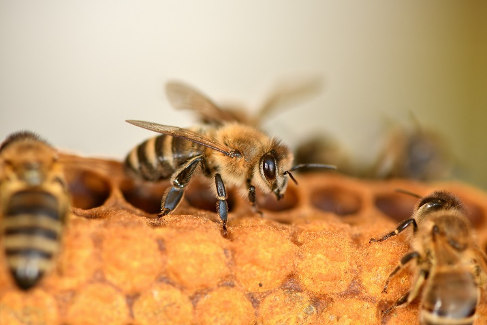
Picture: xiSerge on Pixabay
As already mentioned, the beekeeper must be able to guide his bees through the entire bee year. This includes wintering, swarm control, honey harvest, feeding, wintering, but above all treatment against the Varroa mite and, if necessary, other parasites and diseases.
The beekeeper bears a great responsibility for the health of the bees. One must keep an eye on the development, strength and state of health of the colonies in order to be able to carry out treatment measures properly and professionally.
Another important point is the formation of young colonies. This includes the formation of scions and artificial swarms as well as the breeding of queens.
I keep a record of each colony and write down what I have noticed or
what still needs to be done with the colony.
Care must be taken when handling wax. The beekeeper must be able to assess the combs of his colonies, separate out old combs and melt them down. This also includes the proper
cleaning of the hives and equipment.
Which season is particularly busy?
There is actually no season in which the beekeeper can be lazy. Even in the winter months, the beekeeper is challenged. The frames are renewed, repairs are carried out, the honey is marketed, and much more.

Picture: Free-Photos on Pixabay
“The beekeeper must guide the bees.”
Wild bees - honey bees - competition or happy coexistence?
In our latitudes, it is estimated that there are about 550 species of wild bees. Unfortunately, almost half of them are threatened with extinction. Wild bees
and honey bees complement each other. For example, the bumblebee is already on the move at relatively low temperatures and visits flowering plants, while the honey bee does not fly out below temperatures of 10 degrees. A small
proportion of wild bees can also sting.
How long does a bee (female honey bee) live?
They have a lifespan of 38-45 days in summer. Winter bees are born in autumn and overwinter in the hive. The life of the honey bee is as follows: first it is a nurse in the hive (feeding, cleaning, caring,... ), then a collecting bee until death. The queen bee lives up to 5 years.
Communication in the beehive - there is dancing
Bees communicate via different dance styles, this also works in the dark hive. Food sources in the immediate vicinity are passed on via the round dance, more distant locations
are passed on with the tail dance. If a forager bee/scout returns with good nectar, she is asked by the others through feeler contact to describe the location.

Picture: Sztrapacska74 on Pixabay
Depending on the location and season, different sources can determine the composition of the honey. Varietal honey is more likely to be found in large honey fields. With flower honey, nectar (and pollen) is collected from flowering plants. Forest honey is a symbiosis of louse and ant: the collecting bee, the aphids on the trees release the "dew" (stimulated by ants), the honey bees suck it off with them (honey stomach).
The forest honey must be removed from the hives by the beekeeper especially before winter, bees cannot digest this honey well and thus have less chance to survive the winter. It is important for the beekeeper not to remove too much honey, yes, depending on the availability of food sources, the beekeeper must also supplement with sugar solutions.
Where to put the honey jars?
Be sure to rinse them out before disposing of them in the glass container. Depending on where the honey comes from and how it was produced, it may contain diseases and germs from other countries.
Does honey go bad?
The expiry date is 2 years with a water content of max 18%. "Hard honey" is not bad, it is quite normal that it candies. Honey should not be heated above 40°, the components will be destroyed and you will only have sugar.
Help a bee- or: Is a beehive near a house dangerous?
No, it's not dangerous. Keeping 2 metres away from a colony is good, you shouldn't stand in the flight path either. Don't stress, don't wave, just leave it alone, then
the bee will leave us alone. If the bee stings, it is only to defend itself, its aim is not really to sting, it dies afterwards.
City projects
During my time as mayor, I started to plant meadow orchards, especially with old fruit varieties, without any state support. At that time, the legal regulation of so-called compensation areas did not yet exist. During this time, we planted over 300 fruit trees in various places in the city. The first orchard was planted in 1991 at the south entrance, west side of the Mooshof housing estate. In the meantime, the trees are large and productive.
My successor is continuing this important ecological measure, which makes me very happy.
“I still haven’t finished my training.”
Conclusion
I have been keeping bees for exactly 53 years; my father and I took them over from my grandfather when he was 90 years old. Back then, I brought the colonies from my grandfather's farm to Ingolstadt with a small truck from
Altheim near Landshut. At present I have 20 bee colonies and if I'm completely honest, I still haven't finished my training. What still fascinates me about beekeeping today is that the bee takes me to the heart of nature. The
honey bee and the wild bee are practically a state indicator of our environment. They clearly demonstrate to us that we may only live from the interest of nature, but not from its substance; unfortunately, the latter is the
case.

Picture: Hans on Pixabay
Verena Frank & Anna Marquardt • 09.07.2021
Understanding German phone contracts
As students, we know how important connectivity is, especially during online learning times. If you are coming from abroad, one of the first things you´ll need to do is get a German SIM card for your phone. With many different plans and contracts, here we briefly explain you what your different options are.
First of all… is your phone compatible? One of the first things you must check, is if your phone is not encrypted or “blocked” only to be used with one specific company back home.
If you want to buy a new phone, you can always check the local tech stores; or there are also many online webpages where you can get a new phone in just a few days.
What do I need to start a contract/plan?
You will need a German address (for contracts, the town hall´s registration certificate will not be necessary, but for prepaid plans yes) and your ID (passport, European ID, etc.).
If you purchase a post-paid contract, you will probably do it at their offices/contact centres, and they will ask you for your ID and verify it there. But if you buy a prepaid SIM card, then in order to activate it, you will have to certify your identity by video phone call or through the post system, so having your registration certificate and ID nearby will be necessary.
Pay as you go, phone contracts… what is the best option?
As any other country, Germany has many different possibilities when it comes to phone contracts and deals.
The most usual one, is phone contracts with one of the main three companies – Deutsches Telekom, Vodafone, or O2 (owned by the Spanish mega telecommunications company, Telefonica).
Contracts usually go from 20 to 40 euros per month, with packages from 3 to 10 gigabytes, SMS and illimited calls to other mobile phones in Germany. Nevertheless, phone contracts in Germany are normally for 24 months, and you can´t cancel them at your own convenience (with a few exceptions). This is something you should seriously consider, specially if you are not going to be here for a long period of time.
And, even if you are planning on staying here for longer period of time, remember that maybe what seemed like an incredible offer once, can be less two years later.
Another option, the most common one among expats, is to get a pay-as-you-go or prepaid contract. In this case, you first buy a SIM Card and activate it. Then you will have many possibilities: you can just top it up when you need, and use it just for that, or you can purchase a 4-week plan, which will be much more advantageous. You don´t commit to any contract, and once you run out of credit, it will just stop working.
If you don´t use your SIM card for a prolonged period (6 months or 12 months, depending on the phone company) then it will be cancelled, and you would have to get a new SIM card.
All big supermarkets (Lidl, Aldi, Real, etc) offer these SIM cards and plans (Aldi Talk, Lidl Connect, Edeka Mobile, Tchibo mobile, among others). These companies don´t run independently, but rather form business connections with the three main phone networks in Germany, so basically you are always using that same network.Always make sure to tick off any conditions that might tie you into a contract, or with extra charges.
For prepaid plans, there is no notice period as there is no contract.
What if I want an unlimited data plan?
Unlimited data plans are not so common in Germany, but the two biggest companies (Telekom and Vodafone) do offer some. But, be aware: they are going to be VERY expensive (up to 80 euros per month).
Sources for
this article:
https://www.your-german-mortgage.de/german-mobile-plans/
https://www.settle-in-berlin.com/mobile-phone-germany-providers/
Ayelen Toscano Juanes • 30.04.2021
Blog article • Everything you need to know about Pfarrkirchen
After months of planning, you have finally arrived to Pfarrkirchen: congratulations! We know that you might have a million questions regarding all formal process and procedures, but we encourage you to discover the entertainment
opportunities the city has to offer from the beginning, aas this will certainly help you in your adaptation process!
Because of this, we have prepared this blog post on social and cultural life in Pfarrkirchen. The article contains information on what to do in the city and nearby cities; and also tips on social and cultural norms in Bavaria.
We hope you enjoy it! And as usual, if you have any questions, feel free to contact us.
Ayelen Toscano Juanes • 19.03.2021
Civic Engagement
|
Landratsamt Rottal-Inn Ursula Müller Phone: 08561 20-192 eMail: ursula.mueller@rottal-inn.de |
Coordination Office for Civic Involvement
In the district of Rottal-Inn, civic engagement is characterised by great diversity. More than 1400 associations show a great willingness to engage themselves voluntarily in different areas. The Coordination Office for Civic Involvement is there to support this willingness. The tasks of the Coordination Office for Civil Involvement are the networking of existing offers and the initiation of new forms of civic engagement. It is intended as a point of contact for people or organisations looking for advice, networking opportunities, as well as the placement of volunteers and those who are looking for volunteering openings. |
Sonja Geigenberger Phone: 08723 20 25 22 Mobile: 0151 70 34 48 28 eMail: info@pack-mas.bayern |
Voluntary Agency • “Pack ma’s“ “Pack ma’s” is Rottal-Inn’s voluntary agency. It is a regional contact and information point on civic engagement. The agency informs, advises and arranges voluntary commitment. “Pack ma’s” connects initiatives, organisations and volunteers and is committed to a good regulatory framework for civic engagement. The agency works locally, regionally and at county level. Together with citizens, associations, initiatives as well as representatives from politics and industry, “Pack ma’s” wants to contribute to a strengthening of community and public spirit. They also do so by initiating their own projects in different areas to create opportunities to get involved. |
More information about associations, contact points and first contact persons in Pfarrkirchen can be found here: https://th-deg.de/ecri
This document is constantly updated, it's always worth having a look on it.
Easter
For many, Easter is also always the beginning of a new season, spring. And the Easter holidays are usually the first date in the new year when the whole family meets for the Osterbrunch, the first walks enjoying the sun and of
course hides and looks for eggs.
The term "Ostern" has German roots. According to the German dictionary of the Brothers Grimm, the spring goddess Ostara,the goddess of spring, gave Easter its name.
Here are a few easter traditions presented, which do not always have a religious background:
Gründonnerstag
On Gründonnerstag, a lot of fresh greens are eaten and the first preparations for the Easter Weekend are made. The fresh green food is supposed to give health and strength for the whole year and also represents the new beginning of spring. The whole family meets, dyes eggs together for Easter Sunday and cooks together chervil soup (soup from various meadow herbs, in our region mainly with chervil) and there are the first potatoes with spinach and nettle.
Karfreitag
KarfreitagsratschenAfter the Gloria at Holy Thursday Mass, the bells are silent, because according to old popular belief, the bells now fly to Rome and do not return until the Easter Vigil. Now comes the hour of the Good Friday rattles (Karfreitagsratschen).

Karfreitagsratschen
are special sound instruments made of wood that make a rattling or clattering sound. Piercing and loud. But why? This has religious origins. Good Friday is one of the most important holidays in the church year and is part of Holy
Week, also called Silent Week (Stille Woche). That is why it is also called "Silent Friday" (Stiller Freitag). As the bells are now silent, Karfreitagsratschen briefly take over from the church bells. They call the parishioners
into the church for mass.
Karfreitagsfisch
On Karfreitag in Bavaria is traditionally eaten fish or lighter dishes. It is worth ordering the fish in advance, but many markets also offer fresh fish from the region (usually char or trout) during Easter week.
Karsamstag
Karsamstag is used to prepare for Easter Sunday. On this day, tasty specialties are baked, such as the Easter braid on yeast dough or the Easter lamb made of sponge cake dough, which are eaten on Easter Sunday.
Depending on the region, the great Easter fire is lit on Holy Saturday night, which is supposed to drive away winter and its evil spirits. The fires also welcome the spring and represent growth, good harvest and fertility.
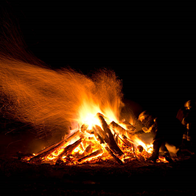
To drive away winter and prevent misfortune, Pfronten in the Allgäu has the tradition of Fuirspringen on Holy Saturday. Long before this day, beech sponges are searched for in the forest, dried and then attached to a long stick. Very early on Holy Saturday, these beech sponges are lit on a consecrated fire. The good-smelling sponges are now carried from house to house to distribute individual "Zunzeln". In this way, rooms, stables and barns are smoked out, winter is "driven away" and misfortune is prevented.
Ostersonntag & Ostermontag
Easter Sunday and Monday are traditionally days for the family. Families meet for a brunch or a walk and play some special Easter Games:
Ostereier suchenWhy are eggs boiled, dyed, hidden and searched for? The custom of Easter egg hunt probably comes from different traditions and rituals, clearly can not be explained. During Lent before Easter, eggs were also not eaten. But the hens
did not stop laying eggs… to make them durable they were cooked.
But why colorful? Because it is easy to seperate the raw ones from the cooked ones.
Theory about hiding • Hiding Easter eggs
is as much a part of Easter as coloring them in advance. But why do we hide eggs for others to search? It is said that eggs were given away as present to celebrate Ostara, the goddess of spring. Eggs have always been considered
a sign of fertility. The church was not amused about that tradition, therefore the eggs had to be passed on in secret, they had to be hidden.
Eier pecken • Oarpecka
In "Oarpecka", boiled eggs are beaten with their tips. The person whose egg is damaged first has to give it to the winner.
Eier schieben • Oarscheim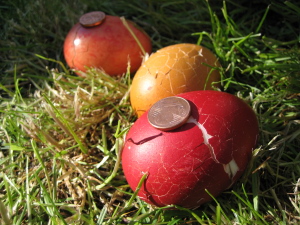
Von Andy Pillip. https://commons.wikimedia.org/w/index.php?curid=19922448
In "Oarscheim" (egg pushing), boiled eggs roll over the sloping handles of two parallel rakes. Everyone has two eggs. After the first pass, a coin is placed on each egg. Whose second egg pushes the coin off another egg gets
to keep the money. The winner is, of course, whoever has the most coins at the end.
https://youtu.be/kug6UN32e9A
While winter is symbolically driven away on Holy Saturday in the Allgäu, this is done in Traunstein in the Chiemgau on Easter Monday with the Georgiritt. The Georgiritt is one of the best-known horse pilgrimages in Bavaria.
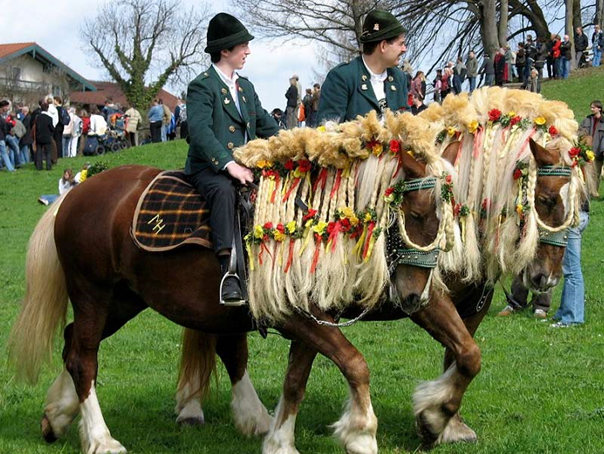
Since
May 2016, this tradition has been considered an Intangible Cultural Heritage by UNESCO. The Georgiritt was first mentioned in 1762. Every year on Easter Monday, around 500 horses, festively decorated wagons and bands parade through
the streets to celebrate the beginning of spring. In honour of St. George as the patron saint of horses and riders, blessings are traditionally requested for animals, field work and the stable at home.
https://www.youtube.com/watch?v=8txksHckfy8
Claudia Nikitsin & Anna Marquardt • 03/2021
Archive
Hackathon #gleichistgleich March 5-7
Equal Care – Equal Pay – Equal Rights
These topics are highly relevant and the women’s movement is working towards them for decades now. The current pandemic however, has had a negative impact on equality, increasing the gender gap.
In order to use the pandemic as an opportunity
for change and to celebrate the upcoming 100th anniversary of the International Women’s Day on March 8, the Hackathon #gleichistgleich calls for action and invites you to participate.
Everyone who is an advocate for equality and the
above-mentioned topics can register for the Hackathon. From March 5-7, you can work together with like-minded people in the digital workshops to develop concepts and ideas to promote equality of gender for the society of the future.
You can choose among several topics:
- gender equality in the world of work, research and education
- gender equality in partnerships and upbringing
- gender equality in public space, media and language
- gender equality in politics
- gender equality in the Church
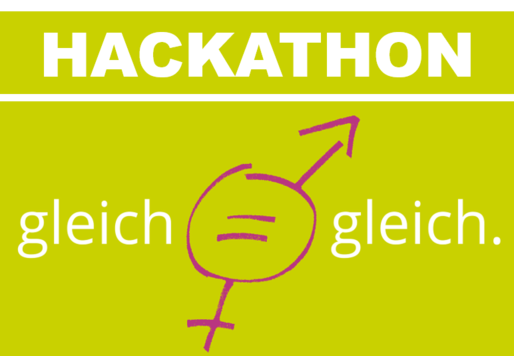
The Hackathon offers an interesting programme and gives you the opportunity to contribute to a better future when it comes to equality. However, you should speak some German for this event. For more information on the Hackathon, visit the official homepage: https://www.frauenbund-bayern.de/gleichistgleich
Miriam Bleck • 02/2021
